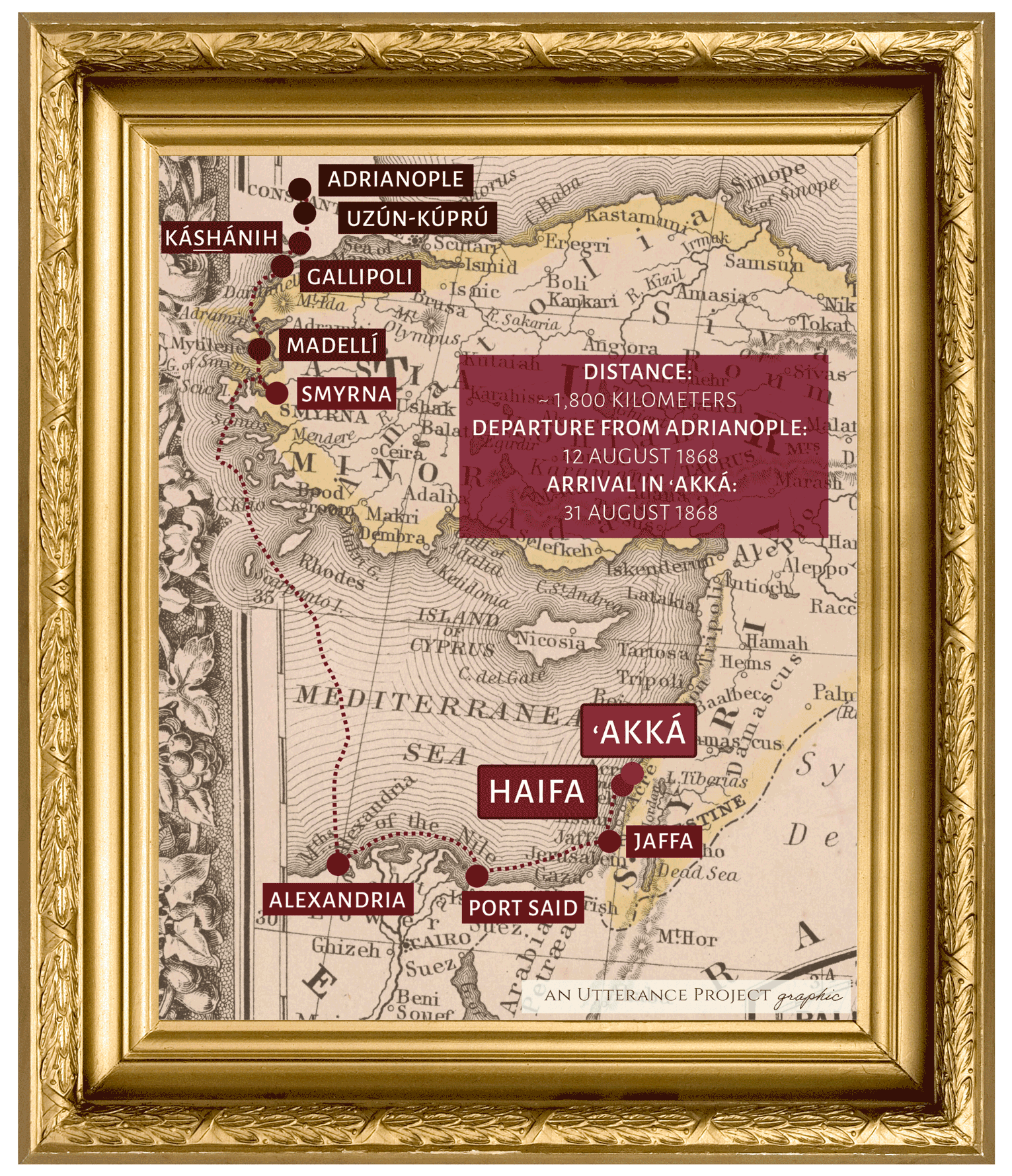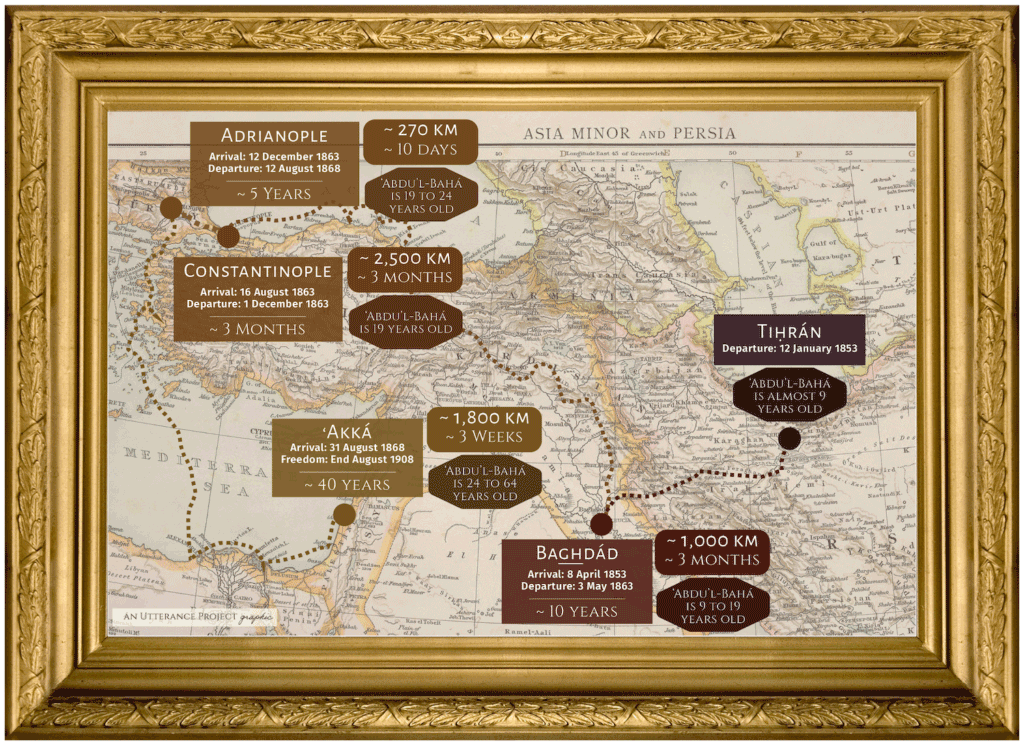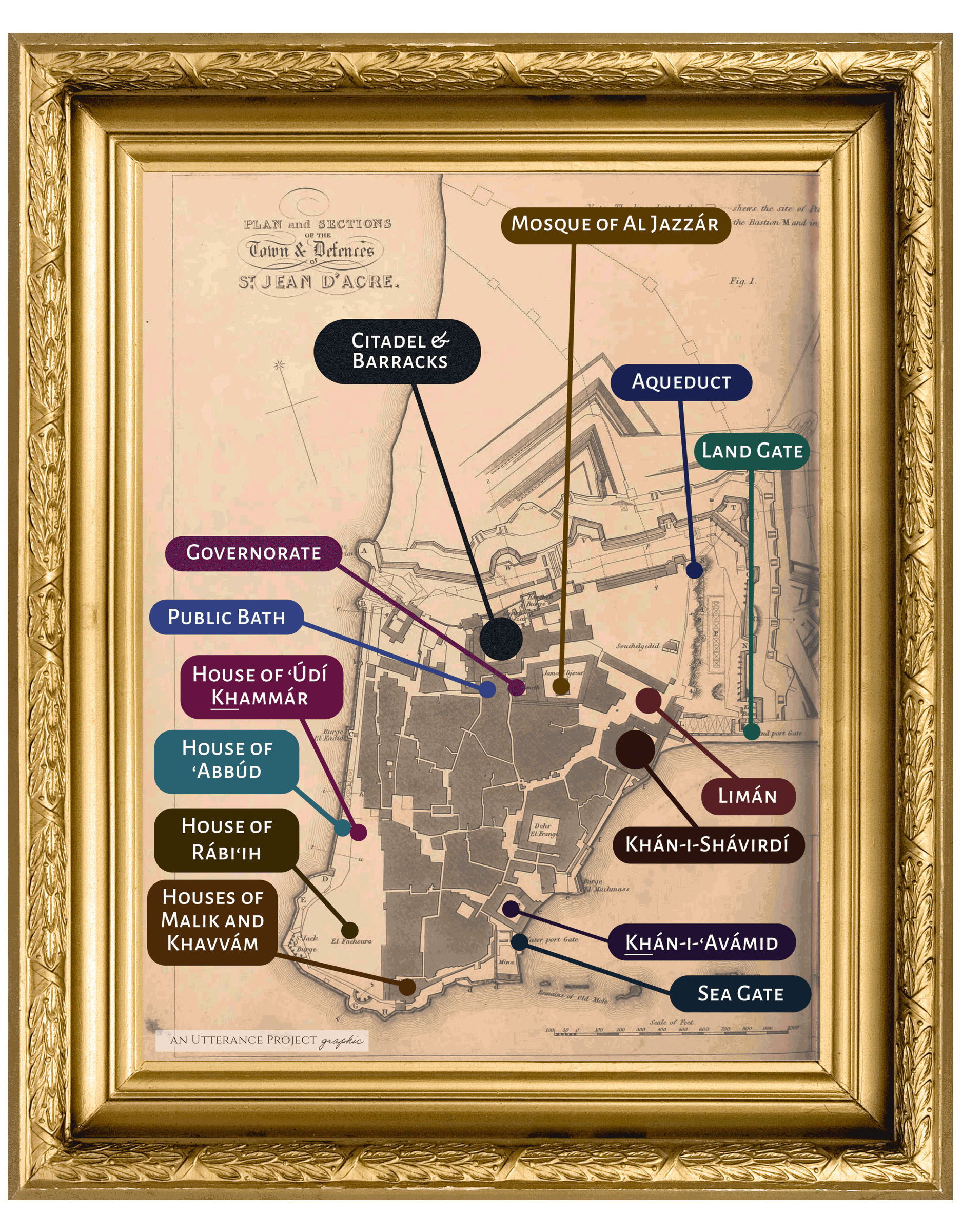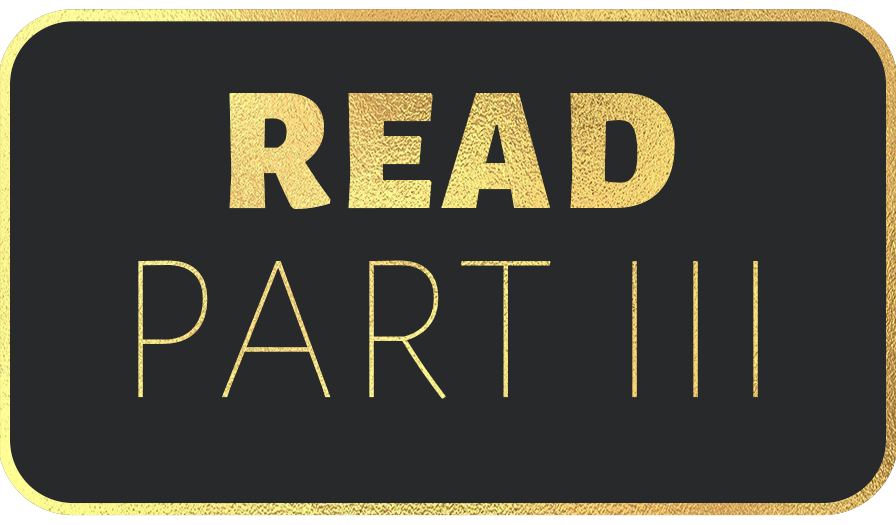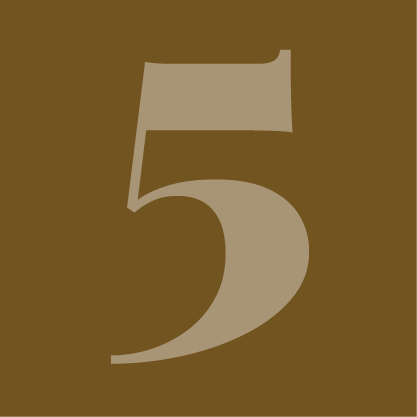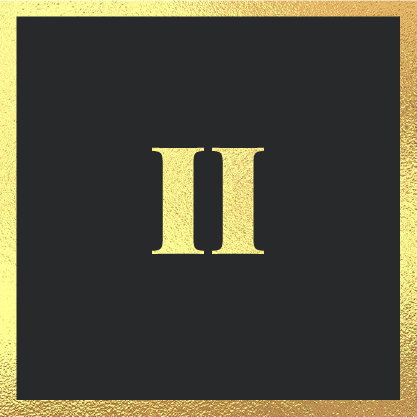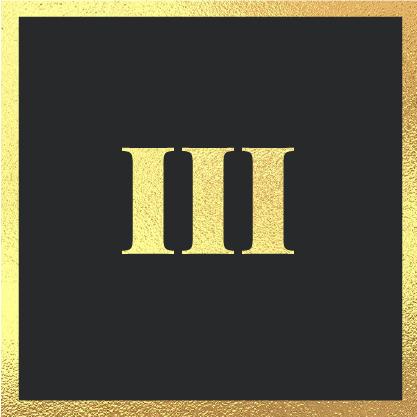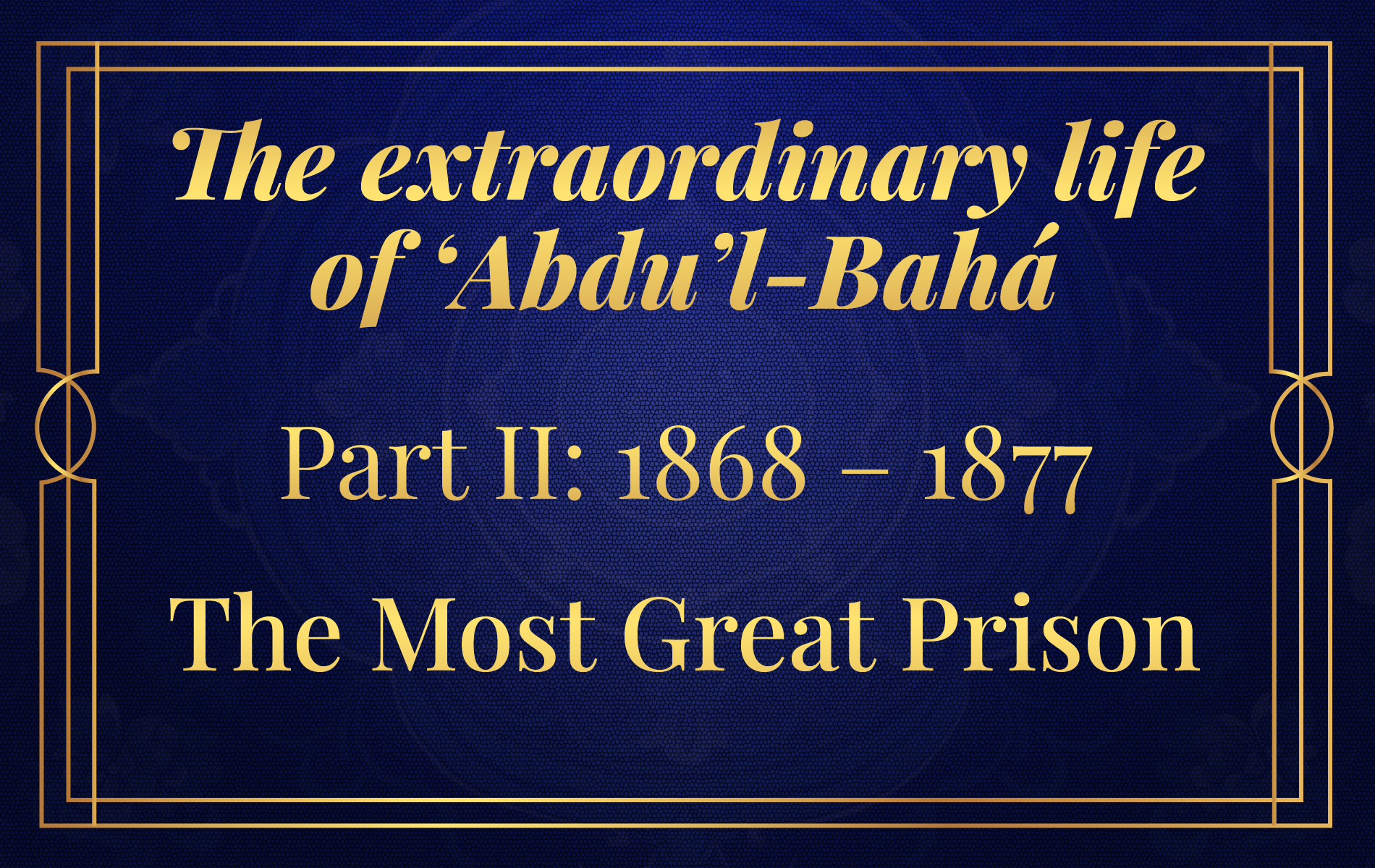
Written and illustrated by Violetta Zein
This part covers the life of ‘Abdu’l-Bahá from the age of 24 in 1868 to the age of 33 in 1877.
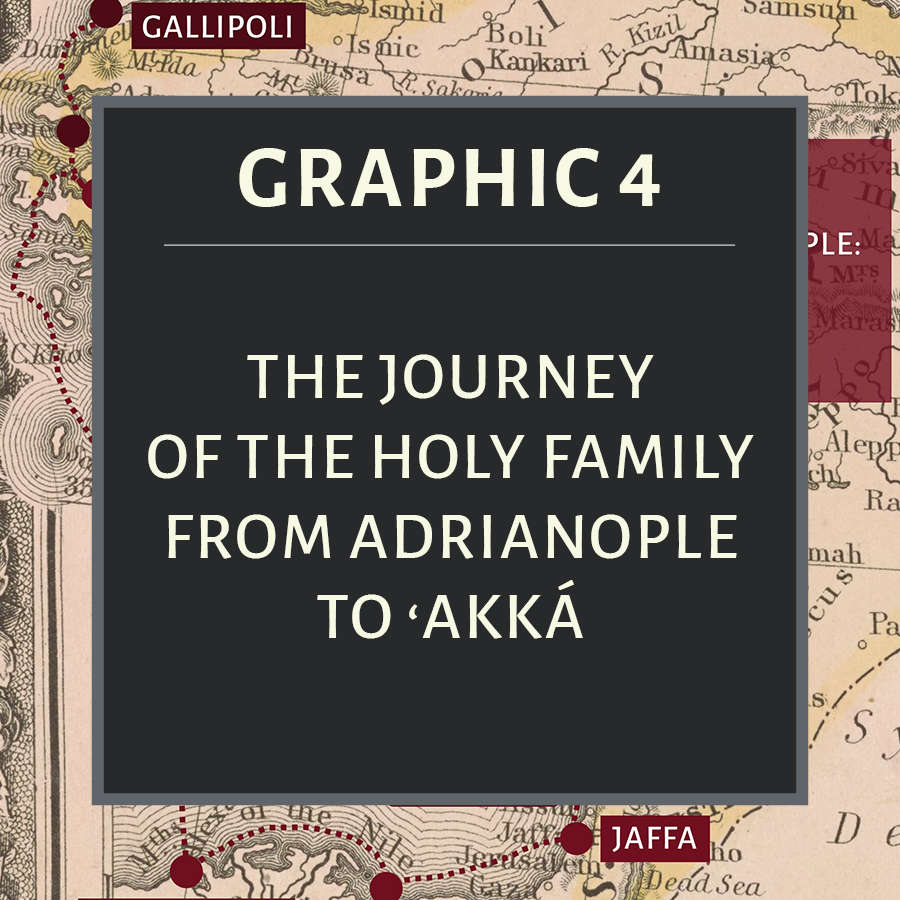
1860 map of Persia, Turkey in Asia, Afghanistan, and Beloochistan by Samuel Augustus Mitchell . Wikimedia Commons. Original graphic by Violetta Zein based on the stops mentioned by Shoghi Effendi in God Passes By. Modern place names for some locations provided by Earl Redman.
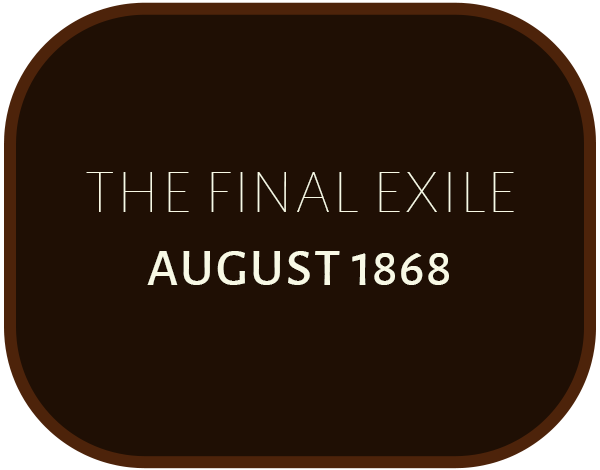
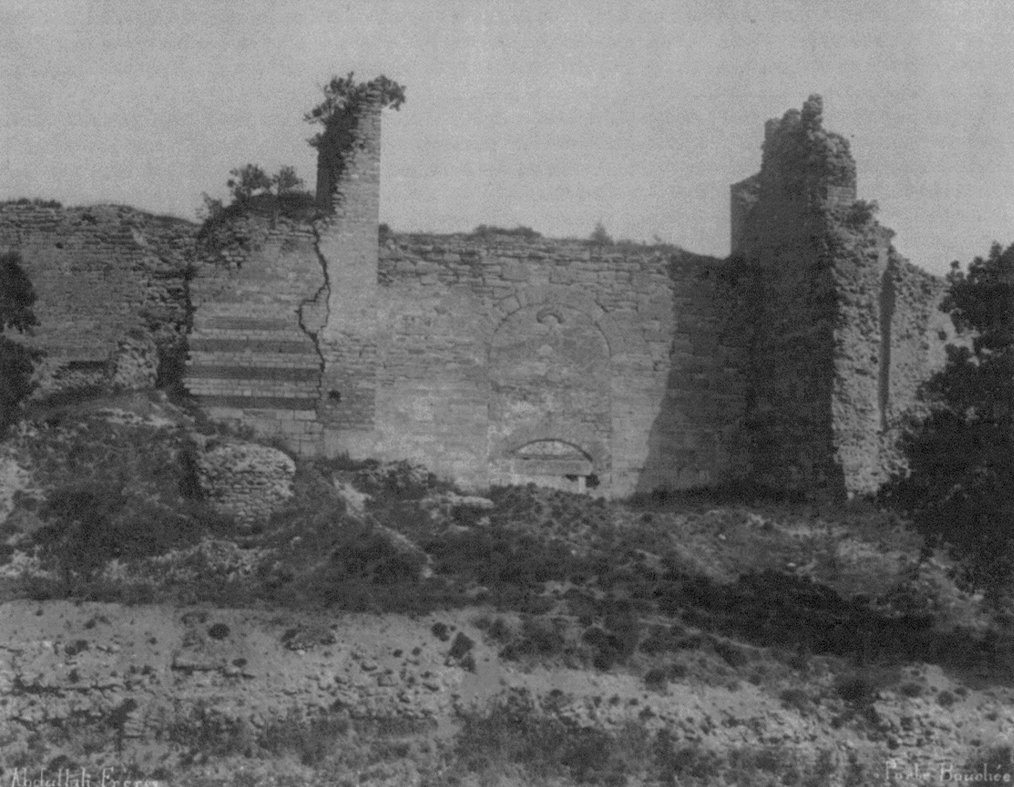
A gate of the city of Adrianople (Edirne) towards Constantinople. Abdullah Frères. Library of Congress.
Shoghi Effendi gives us two eye-witness accounts of the departure of the Holy Family from Adrianople:
The inhabitants of the quarter in which Bahá’u’lláh had been living, and the neighbors who had gathered to bid Him farewell, came one after the other, with the utmost sadness and regret to kiss His hands and the hem of His robe, expressing meanwhile their sorrow at His departure. That day, too, was a strange day. Methinks the city, its walls and its gates bemoaned their imminent separation from Him.
Shoghi Effendi, God Passes By
On that day, there was a wonderful concourse of Muslims and Christians at the door of our Master’s house. The hour of departure was a memorable one. Most of those present were weeping and wailing, especially the Christians.
Shoghi Effendi, God Passes By
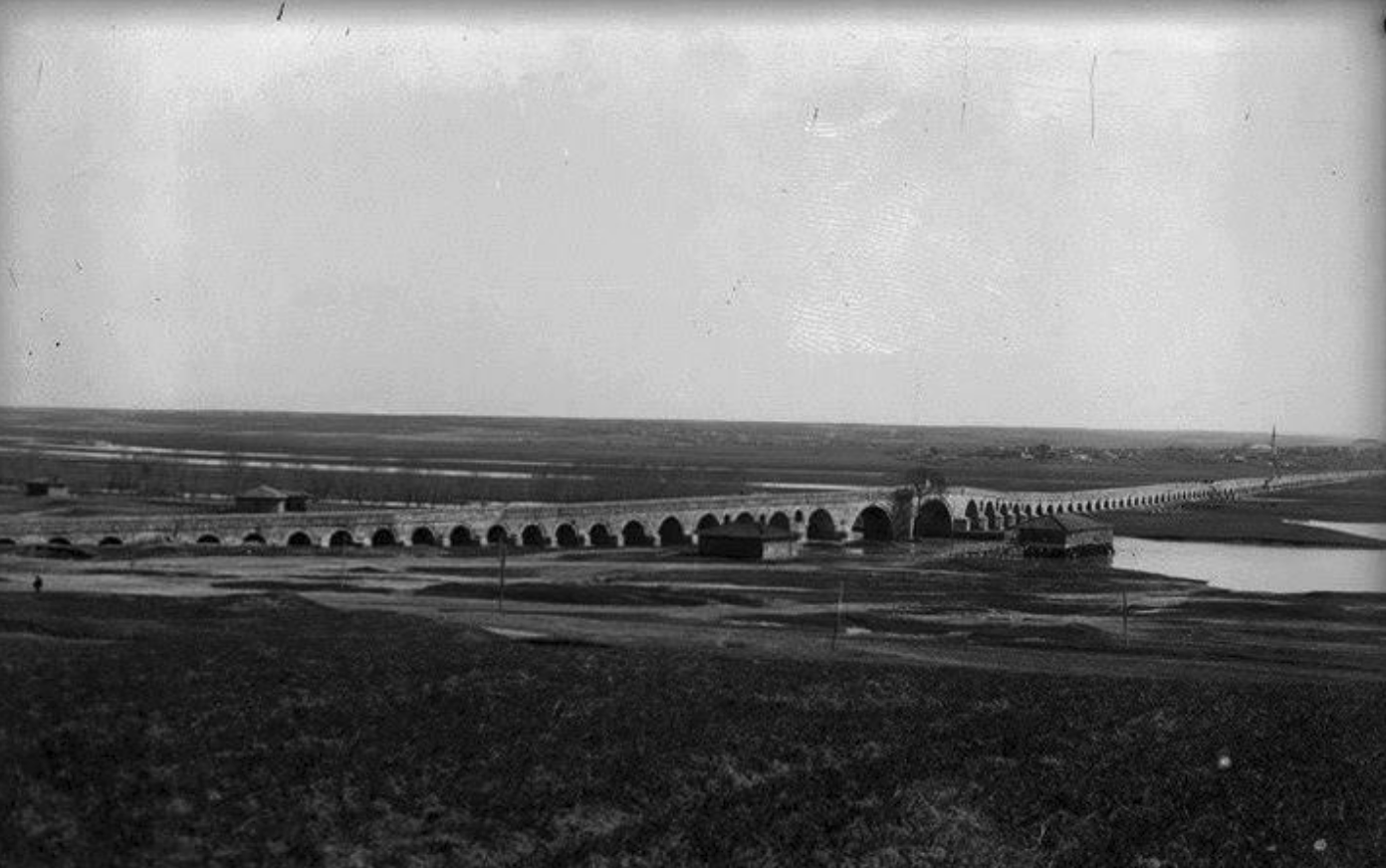
The bridge at Uzún-Kúprú (Uzunköprü) on the way to Gallipoli in 1930. Eski Türkiye Fotoğrafları Arşivi.
Bahá’u’lláh and the Holy Family depart Adrianople in carriages. They are escorted by an Ottoman captain, Ḥasan Effendi, and soldiers appointed by the local government. They stop at Uzún-Kúprú and Káshánih, where Bahá'u'lláh resumes the first phase of His public Proclamation begun in Adrianople by revealing a significant Tablet, the Súriy-i-Ra’ís (Surah to the Chief), addressed to the Sulṭán’s Grand Vizir.
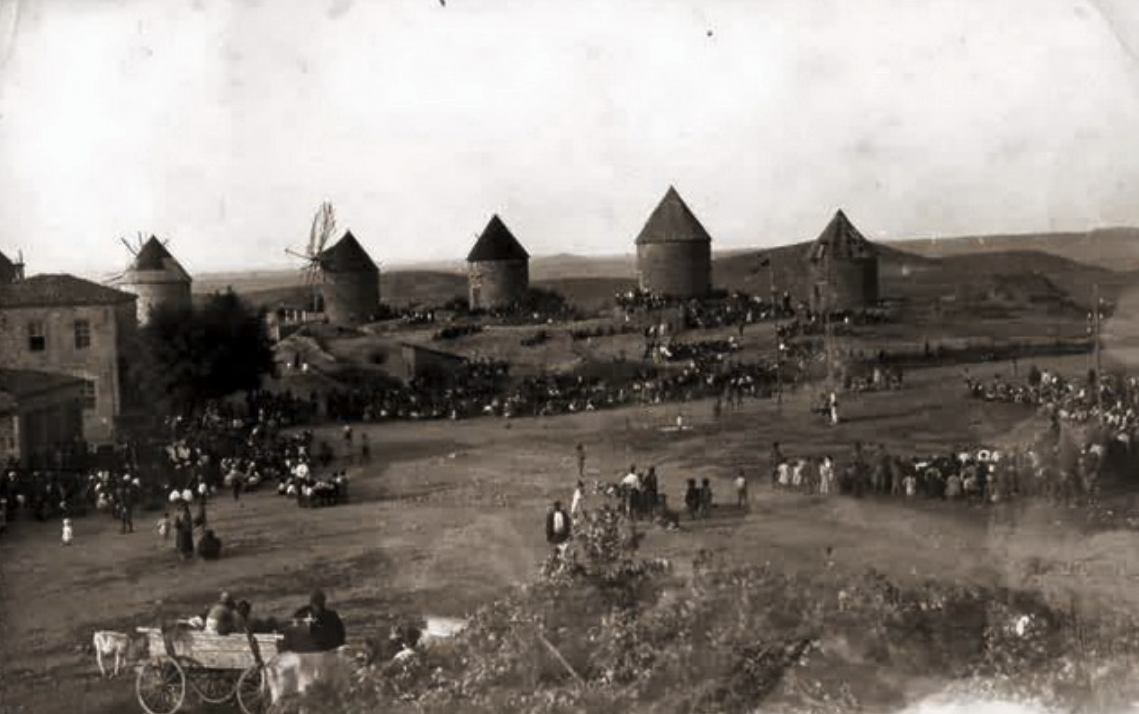
A view of Káshánih (Keşan). Trakyanet Website.
In Káshánih, Bahá'u'lláh completes the Revelation of the Súriy-i-Ra’ís (Tablet of the Chief).
Of this journey, Bahá'u'lláh says:
Say, this Youth hath departed out of this country and deposited beneath every tree and every stone a trust, which God will erelong bring forth through the power of truth.
Bahá’u’lláh, quoted in God Passes By
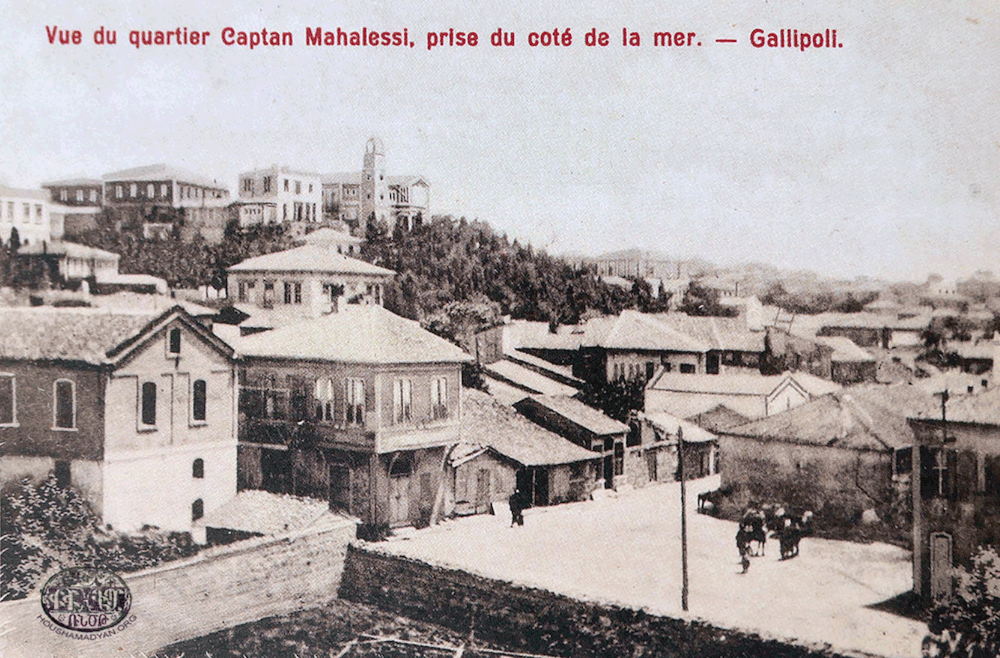
Postcard with a view of the Captan Malahessi neighborhood, near the port in Gallipoli (Gelibolu). Houshamadyan Website.
The Holy Family spends three nights in Gallipoli, without knowing where Bahá'u'lláh will be banished, if the believers will be kept together, or even if the family will be separated.
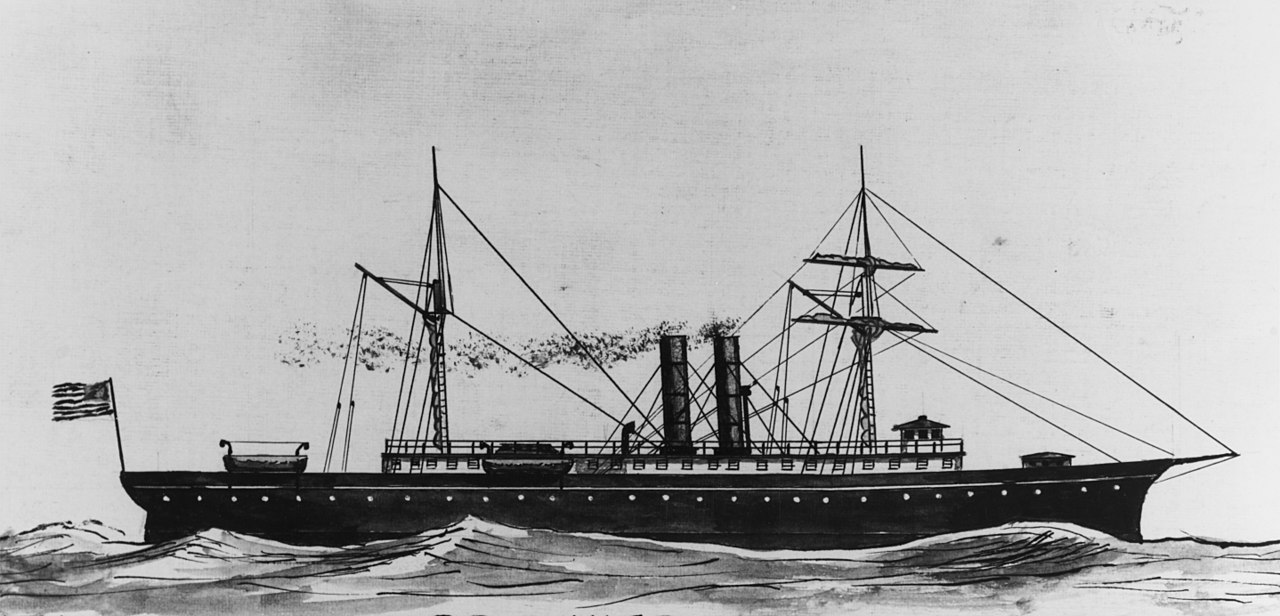
The steamship R. R. Cuyler, built in New York in 1860 for commercial service along the United States east coast. From an original watercolor by Heyl, Erik (1955). This watercolor of a steamship is an accurate depiction of the ship Bahá'u'lláh and the Holy Family would have sailed on from Gallipoli to Alexandria in 8 years' time. Image contributed by Johannes Rosenbaum. Wikimedia Commons.
On the morning of August 21, 1868, the Holy Family and 72 believers board an Austrian-Lloyd steamer for Alexandria. They stop at Madellí, and spend two days in Smyrna and arrive in Alexandria three days later. Burdened by an overwhelming sense of distress and uncertainty about their fate and separation, and rushed by the Ottoman authorities, no one even thinks of providing food for the coming voyage during their stressful stay in Gallipoli.
One old servant, however, on his way back to the ship has noticed this, and purchases a box of bread. This, with the ships’ prisoners’ rations (almost inedible) are the only food the Holy Family has to eat for five days until they reach Alexandria.
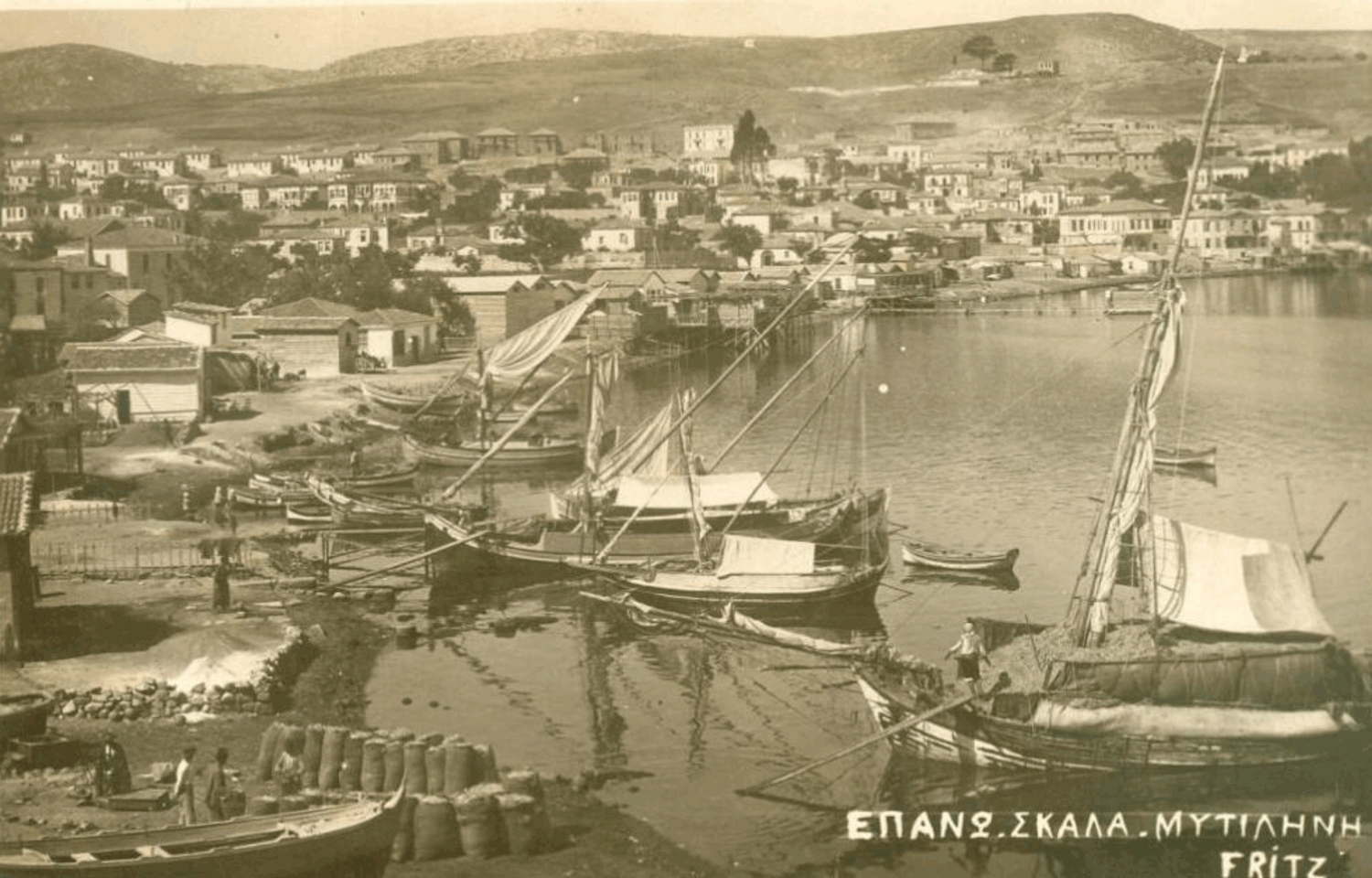
The bay of Madellí (Mitilini/Μυτιλήνη). Lesvos News Website.
Towards sunset of 21 August 1868, the steamship arrives in Madellí, on the island of Lesbos in Greece. They stop in Madellí for a few hours, then sail on towards Smyrna (İzmir, Turkey).
One of the exiles who had accompanied Bahá'u'lláh from Constantinople, Jináb-i-Muníb, the one who had carried a lantern in front of Bahá'u'lláh’s howdah from Baghdád, had fallen ill in Adrianople but had refused to be left behind. His condition has now worsened, and he has become so weak, that when he was brought aboard in Gallipoli, the captain had insisted he be left ashore.
The exiles pleaded with the captain to let Jináb-i-Muníb travel as far as Smyrna, and he agreed.
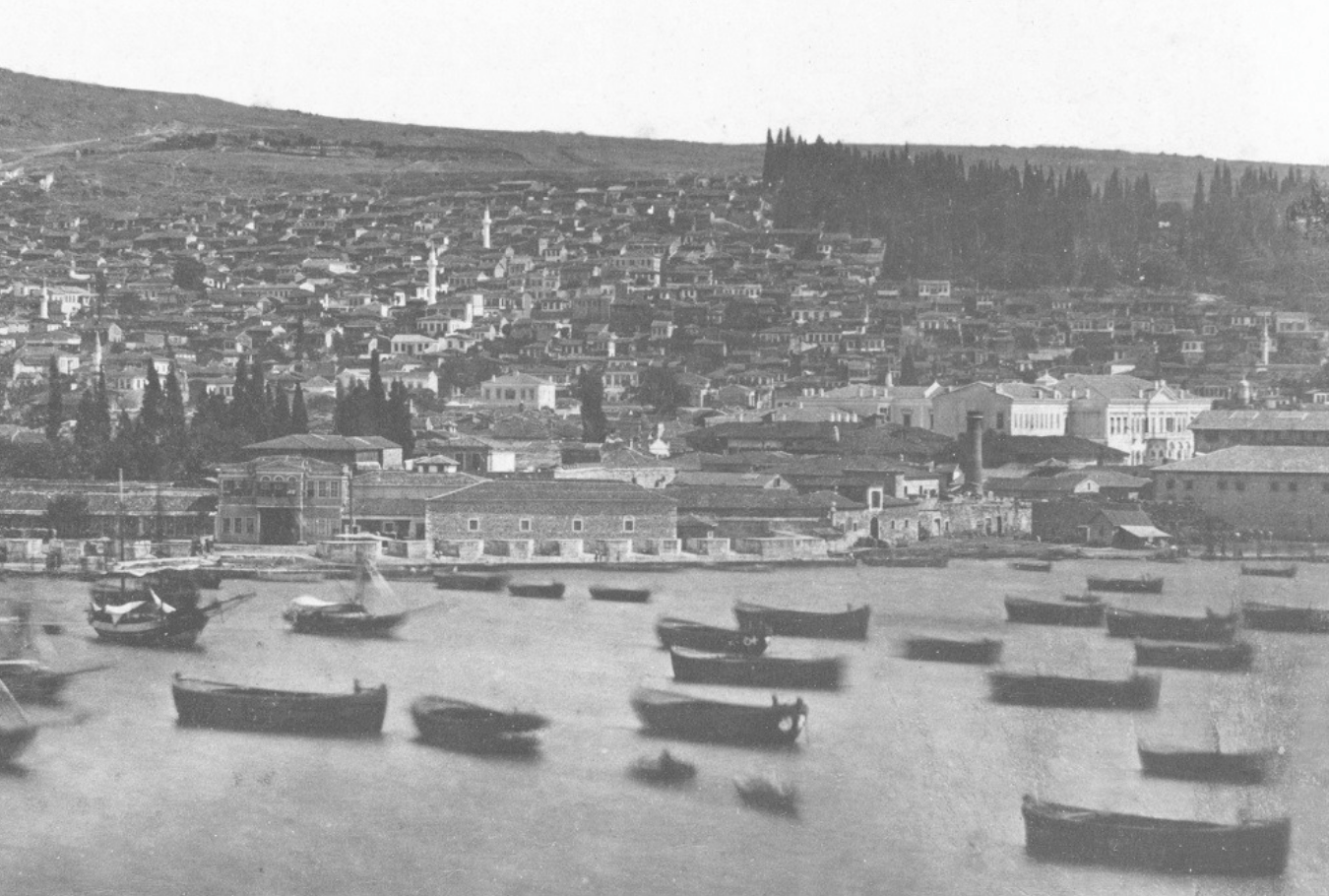
Smyrna (Izmir) around 1870, just two years after Bahá'u'lláh and the Holy Family stopped in this port for two days. The ships would be similar to the ship they were on or encountered. Source: Ottoman Imperial Archives Facebook Page.
The steamer reaches Smyrna (İzmir, Turkey) in the early morning of 22 August 1868, and the devoted Jináb-i-Muníb is so ill and weak that the captain speaks to Colonel ‘Umar Bayk, the government agent accompanying the Bahá'ís to ‘Akká, and insists he be left ashore.
The Ottoman officials allow 'Abdu'l-Bahá and His companions one hour off-ship to take Jináb-i-Muníb to the hospital. They lay him on the bed, resting his head on a pillow, hold him and kissed him goodbye before being dragged away. Bahíyyih Khánum recalls that 'Abdu'l-Bahá left Jináb-i-Munír’s bedside to go buy him a melon and some grapes, but returned to find the wise and modest man had died, an event that will stay with 'Abdu'l-Bahá until the end of His life.
The ship is anchored in Smyrna for two days, and Persian residents come onboard to escort the new Persian Consul, oblivious of Bahá'u'lláh and His followers. They set sail for Alexandria the second night, in the evening of 23 August 1868.
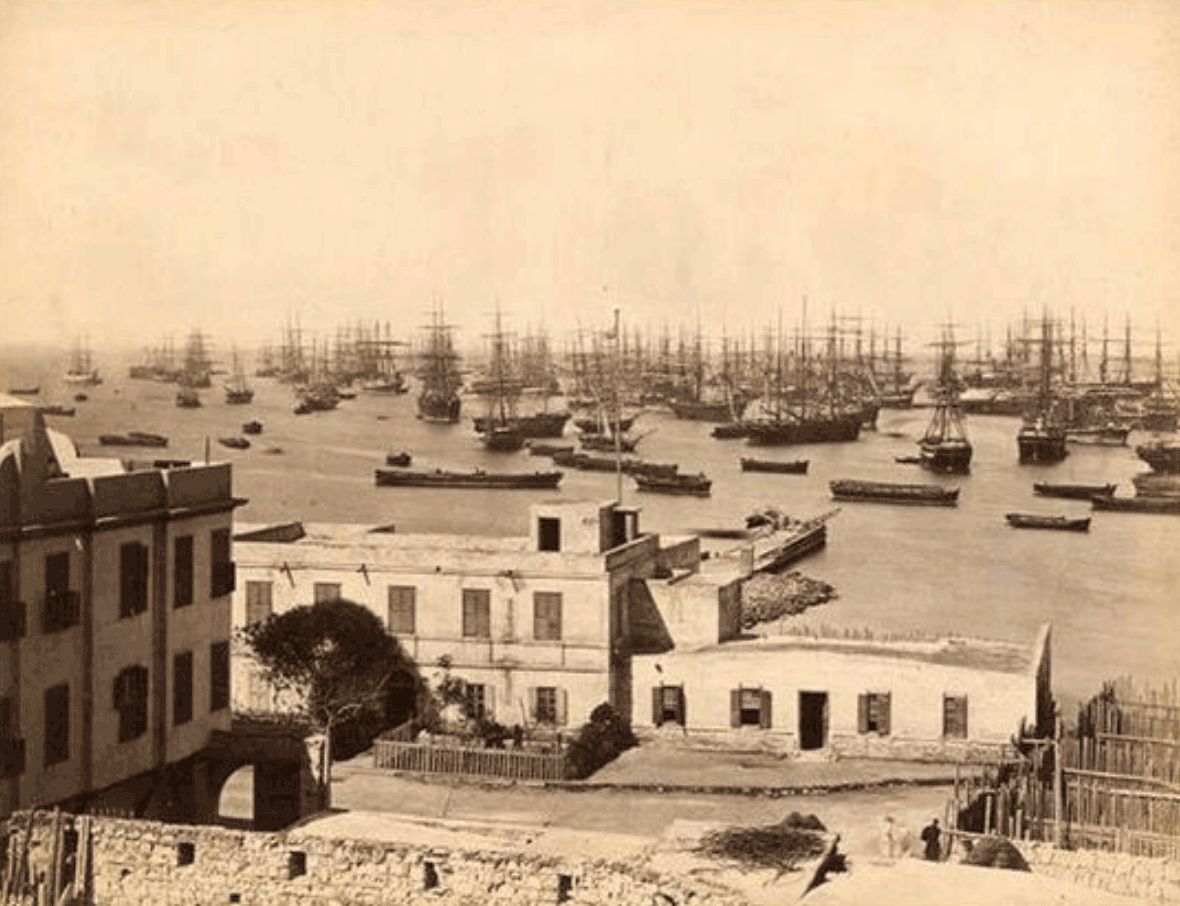
The Port of Alexandria in 1870, two years after the Holy Family stopped there. Antranik Tutundjian Pinterest Account.
In Alexandria, again, the threat of separation looms, and the Family is so terrified, no one is willing to leave the ship to buy food and not be allowed to return.
An unexpected encounter with Nabíl, imprisoned in Alexandria when Bahá'u'lláh arrives to change ships is deeply significant. He has taught the Faith to a Christian, named Farís Effendi, who becomes the first Bahá'í of Christian background to accept the Faith. They manage to get letters delivered to Bahá'u'lláh as His ship is leaving.
After reading parts of Fáris Effendi to the believers which causes great excitement throughout the ship, Bahá'u'lláh reveals a Tablet for Nabíl in which He bestowed His bounties and blessings on Fáris, ensuring Nabíl he would soon be released from prison, hands the Tablet to the messenger and 'Abdu'l-Bahá and Mírzá Mihdí also give him some gifts for Nabíl, including some nuq’l almond candy wrapped in paper.
Before departing, the only food the exiles are able to obtain are some grapes and mineral water, and their bread having gone bad, they travel towards ‘Akká with hunger, added to their fright and grief.
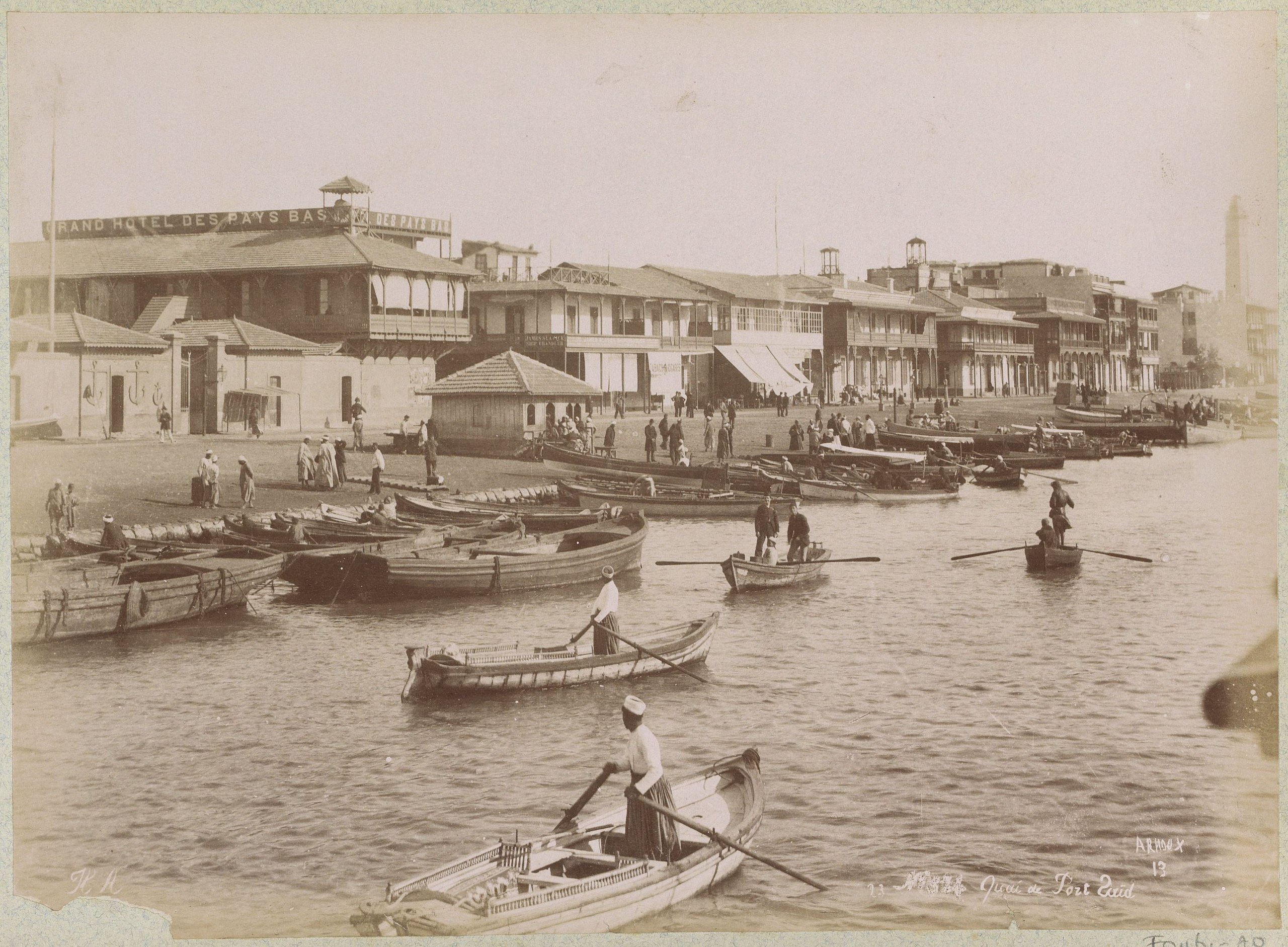
View of a quay of Port Said with rowing boats in the foreground. Hippolyte Arnoux, Wikimedia Commons
They leave Alexandria the day after they arrive and make a stop in Port Said on August 29, 1868.
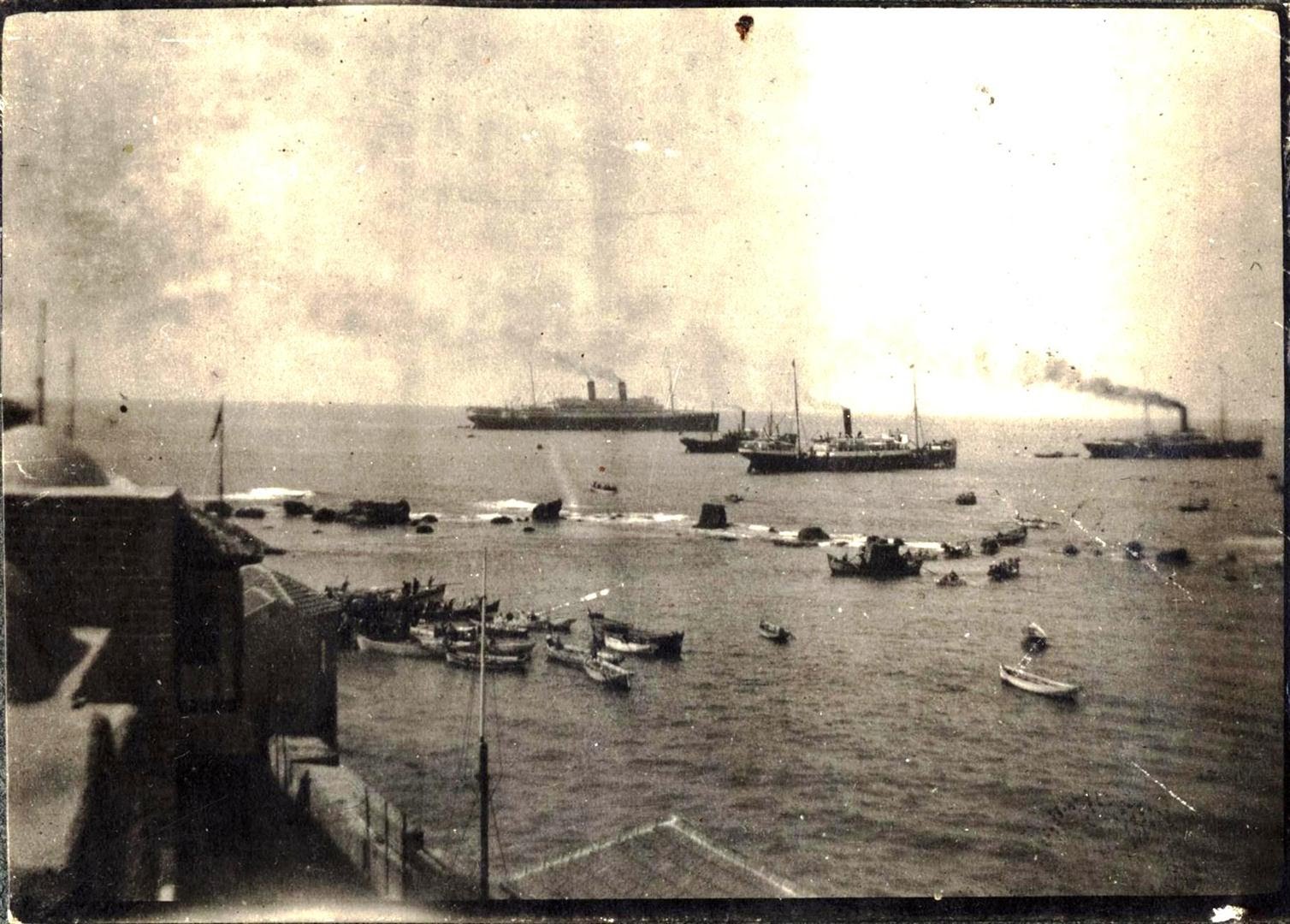
Ships in the Port of Jaffa, 1916. Tel Aviv Municipal Encyclopedia.
The exiles arrive in Jaffa on August 30, 1868.
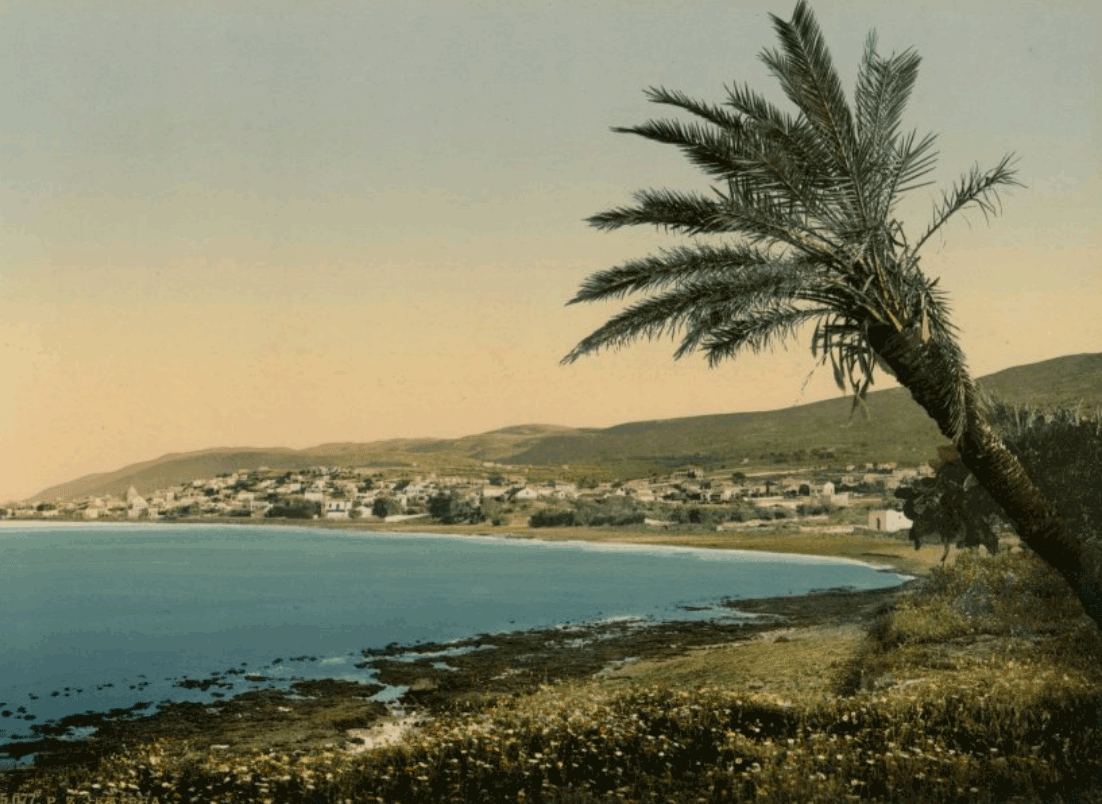
Panorama of Haifa, Photochrome Zurich circa 1895 of the Bay of Haifa. Musée de la Photographie (Online Photography Museum) Exposition: Journey to the Holy Land through the Photochromes from 1880 to 1895.
They reach Haifa on August 31, 1868. In Haifa, Bahá'u'lláh and His companions, seventy in total, disembark the steamer in Haifa and are taken ashore in sailboats with their belongings and are handed over to the government officials. In Bahíyyih Khánum’s words:
After a voyage of about two days we were landed at Haifa, in Syria. All were sick from hunger or eating improper food. I myself was a healthy woman up to the time of taking this voyage; since then I have never been well.
Phelps, Myron H. The Master in ‘Akká, pages 75.
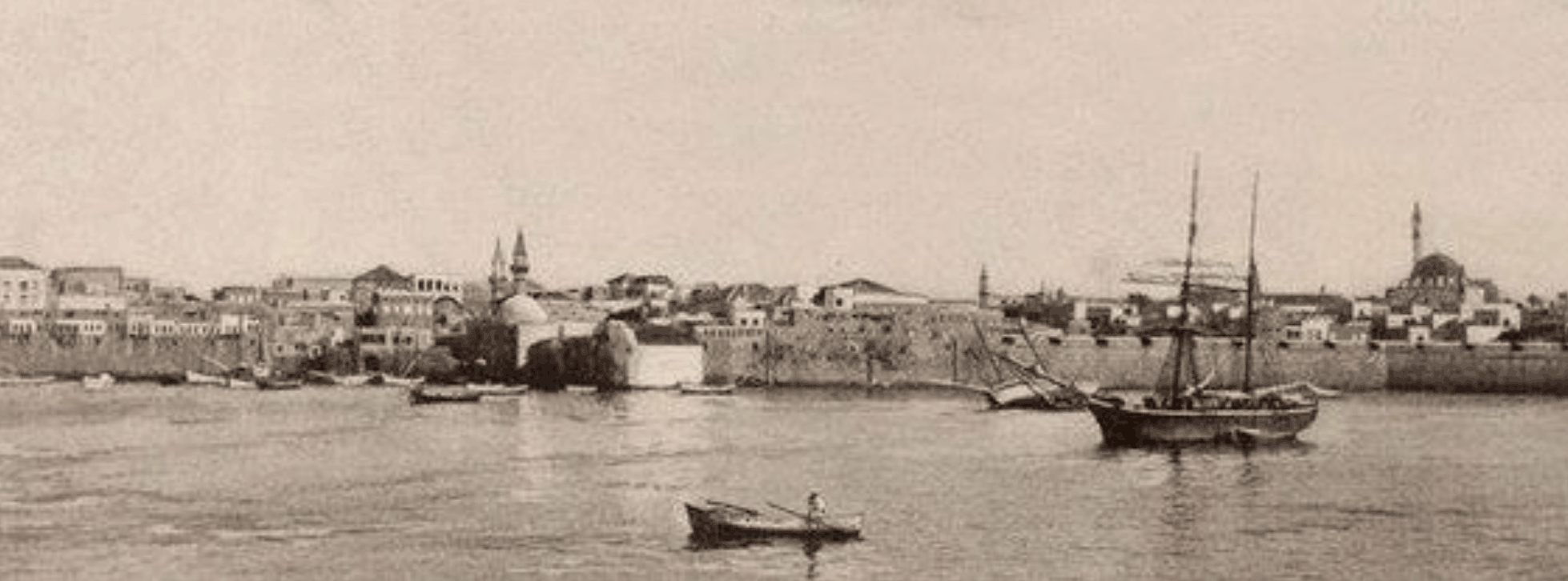
'Akká, Palestine in 1896. Saved by Şevki Demir on Pinterest.
A few hours later, they are transferred to sailboats and endure eight hours of misery under the burning windless sun, to arrive at ‘Akká, their final destination.
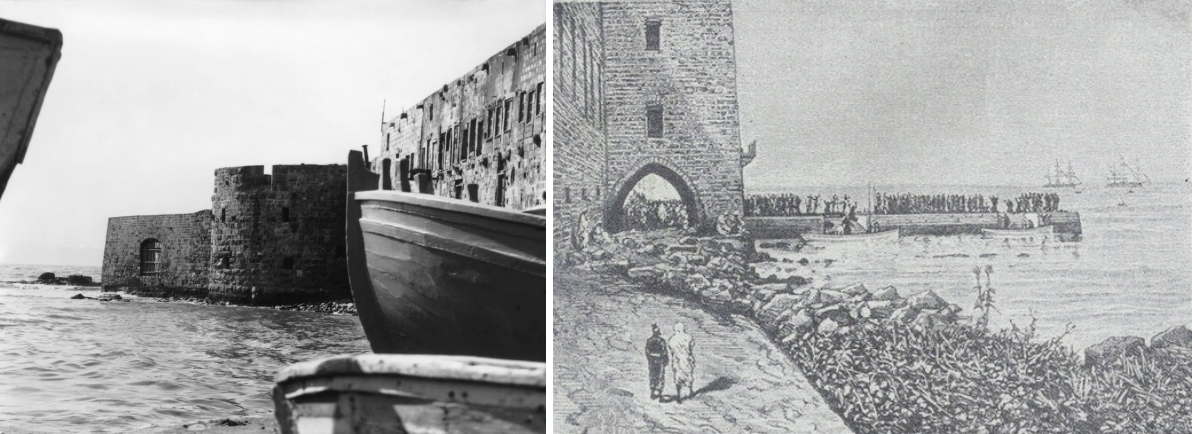
Left: The sea gate where Bahá'u'lláh and His companions entered ‘Akká in 1868, c. 1920. Bahá'í Media Bank. Right: Engraving of the government building in Haifa and the Russian pier, which was built in 1854. Igal Graiver, of the Haifa Historical Society, explains that Baha’u’llah likely walked on that pier to the government building when he stopped in Haifa for a few hours on 31 August 1868. Bahá'í World News Service.
In 'Akká, there are no landing facilities. The men are forced to wade ashore in the water, and the governor's orders are that the women are to be carried ashore on the men's backs. 'Abdu'l-Bahá protests this directive, and being among the first ashore, he sources a chair and insists the women be carried ashore one at a time, while sitting in the chair. Bahá’u’lláh is the last to disembark, having been forced to wait in the sun until all seventy of His companions have left the boat and finally enters ‘Akká through the Sea Gate. Bahá'u'lláh setting foot in the Holy Land is the climax of His successive exiles, and it brings Him to tread the land that has been visited by all the Manifestations of God of the past, the "nest of all the Prophets of God". This day marks the opening of the last part of Bahá'u'lláh's forty-year ministry, as He will spend the last 23 years and 8 months of His life in 'Akká and its immediate surroundings.
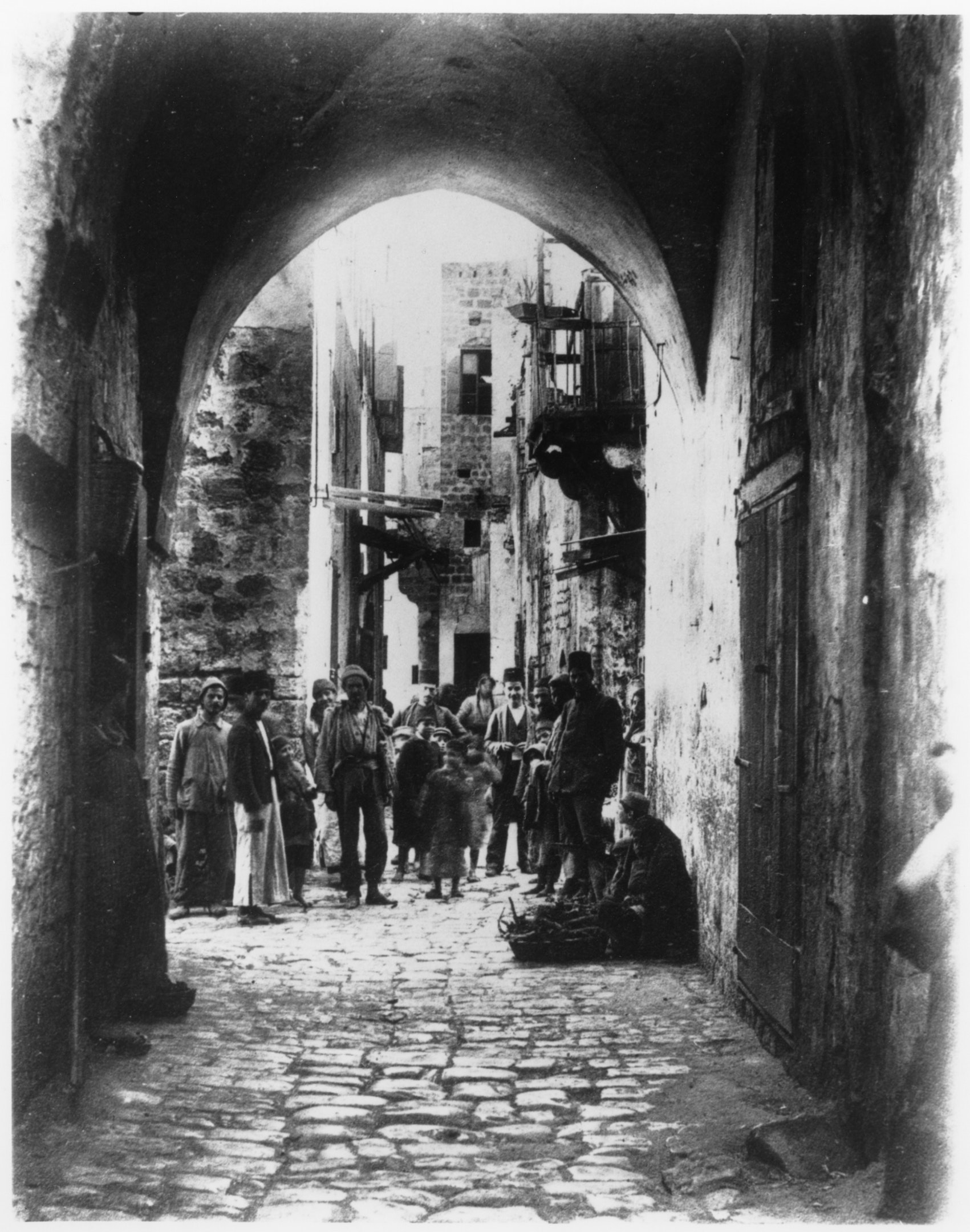
A street scene in ‘Akká, c. 1914. Bahá'í Media Bank.
As soon as they disembark, all the exiles, men, women and children, are led by sentinels to the army barracks through filthy streets under the curious eyes of the people of 'Akká who have come to the port to see the “God of the Persians.” The massive door is shut behind them with great iron bolts and sentinels detailed to guard them. It is difficult for us today, a century and a half later, to properly picture the squalor ubiquitous in ‘Akká. Bahá’u’lláh describes ‘Akká in a letter to the Sulṭán of Ottoman Empire:
Erelong shall the exponents of wealth and power banish Us from the land of Adrianople to the city of ‘Akká. According to what they say, it is the most desolate of the cities of the world, the most unsightly of them in appearance, the most detestable in climate, and the foulest in water. It is as though it were the metropolis of the owl, within whose precincts naught can be heard save the echo of its cry. Therein have they resolved to imprison this Youth, to shut against our faces the doors of ease and comfort, and to deprive us of every worldly benefit throughout the remainder of our days.
Bahá'u'lláh - Summons of the Lord of Hosts - Tablet to Náṣiri’d-Dín Sháh
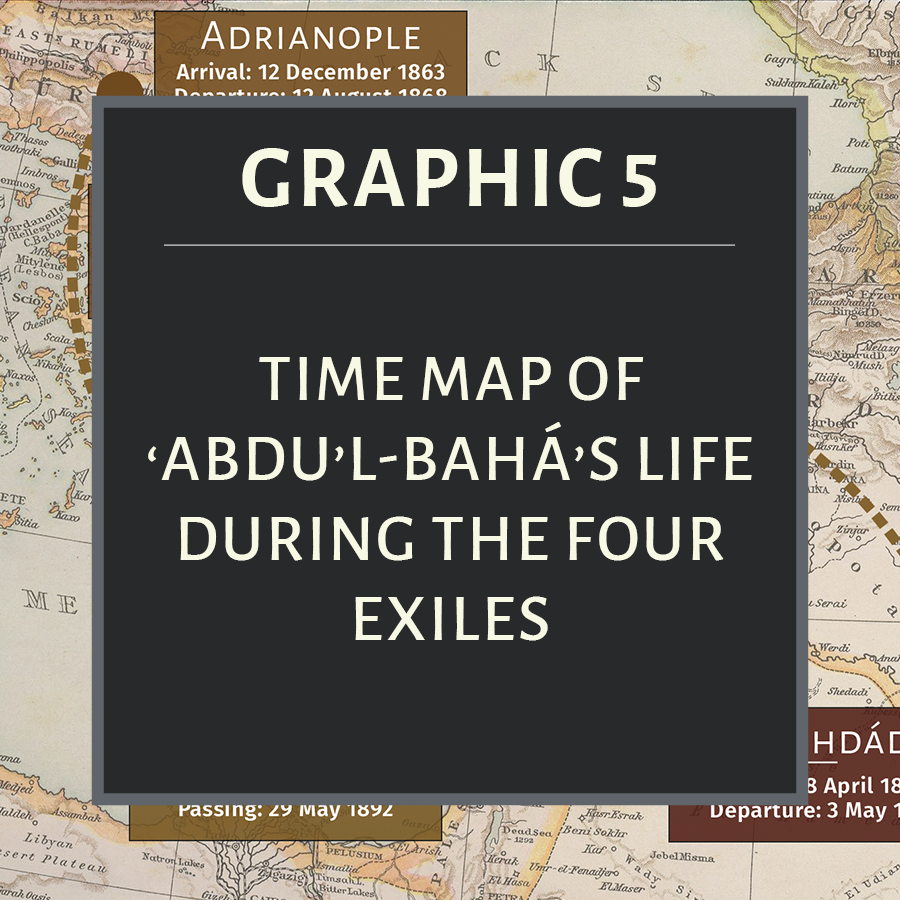
Map of the four Exiles of Bahá’u’lláh and the Holy Family from combined information in graphics 1, 2, 3 and 4. Original graphic by Violetta Zein. Map of Asia Minor and Persia in 1895 from ‘The Citizen’s Atlas of the World’, published in London, c.1899. Used with permission by https://www.britishempire.co.uk/
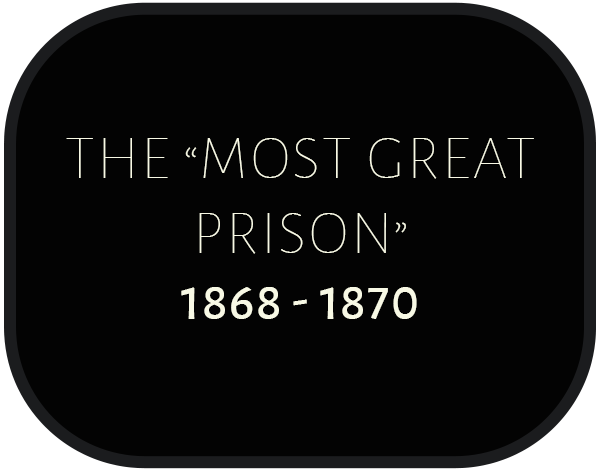
In the words of Shoghi Effendi: Bahá’u’lláh, wishing to emphasize the criticalness of the first nine years of His banishment to that prison-city, has written:
Know thou that upon Our arrival at this Spot, We chose to designate it as the ‘Most Great Prison.’ Though previously subjected in another land (Tihrán) to chains and fetters, We yet refused to call it by that name. Say: Ponder thereon, O ye endued with understanding!
Bahá’u’lláh, quoted in Shoghi Effendi “God Passes By”
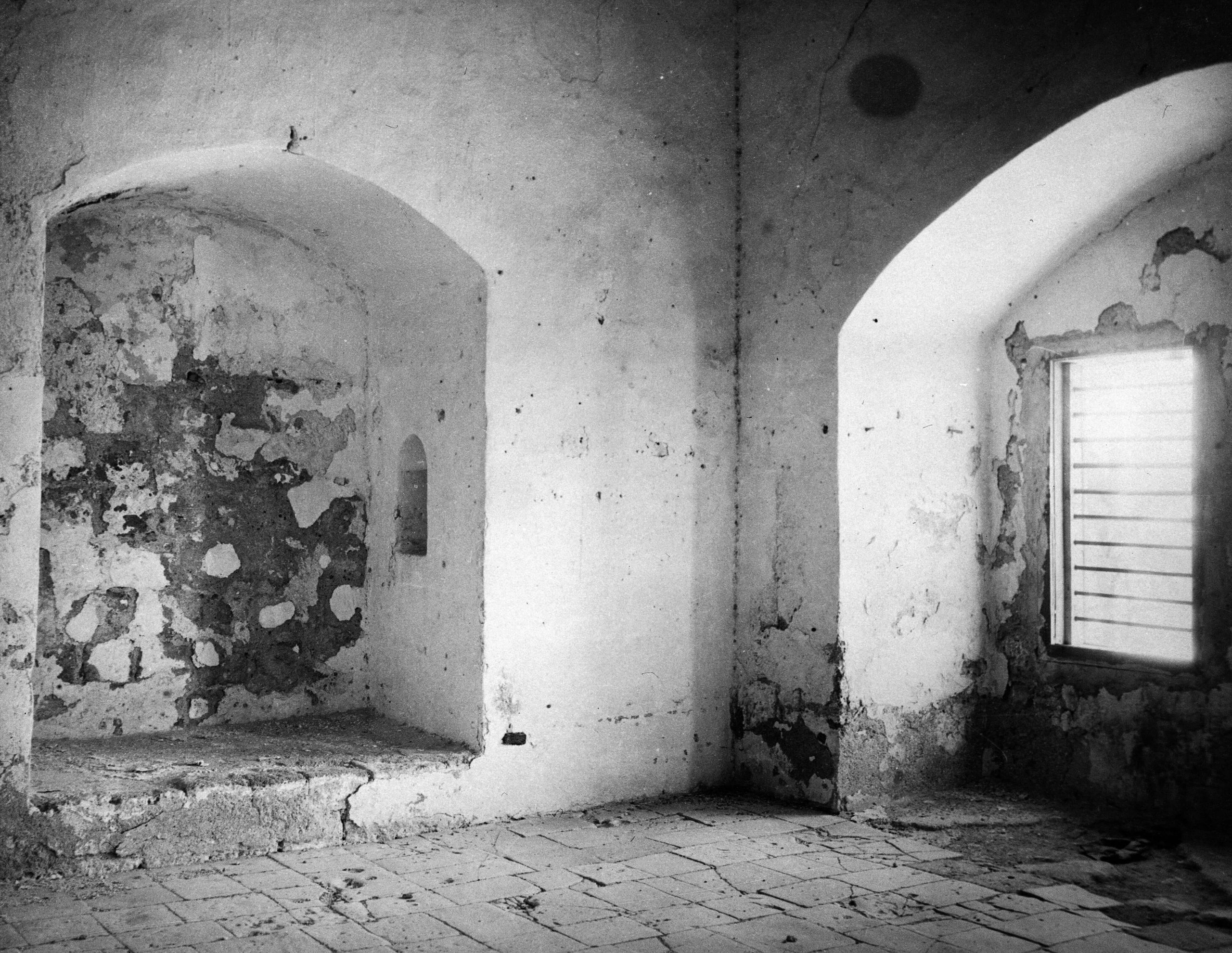
This 1921 photo shows the prison cell in which Baha’u’llah was kept for more than two years from 1868 to 1870. It was here where he revealed some of the messages to the kings and rulers of the world. Bahá'í World News Service.
The first night of their arrival in the barracks, Bahá'u'lláh is placed in a filthy, empty room. Later, He is moved into a room on the upper floor. Bahá'u'lláh's prison cell, now refurbished and visited by pilgrims, is unfit for habitation in 1868, its floor is covered in earth, and plaster falling off the ceiling.
Bahá'u'lláh's seventy followers are crowded into one room, the floor is covered in mud, in places up to their ankles, preventing them for lying down. The air is so putrid from the stench of the prison amplified by the sultry summer heat that Bahíyyih Khánum, faints on arrival.
There is no drinking water, and the only pool of water has been used for washing. Overcome with thirst and hunger, the children cry for hours. Breastfeeding mothers are unable to feed their babies. 'Abdu'l-Bahá returns to the docks to help the rest of the exiles ashore. Once settled, 'Abdu'l-Bahá pleads with the soldiers to allow Him to search for food and water. His request is denied. The suffering of the exiles intensifies, and 'Abdu'l-Bahá does not rest that first night, consoling those around Him and appealing to the soldiers.
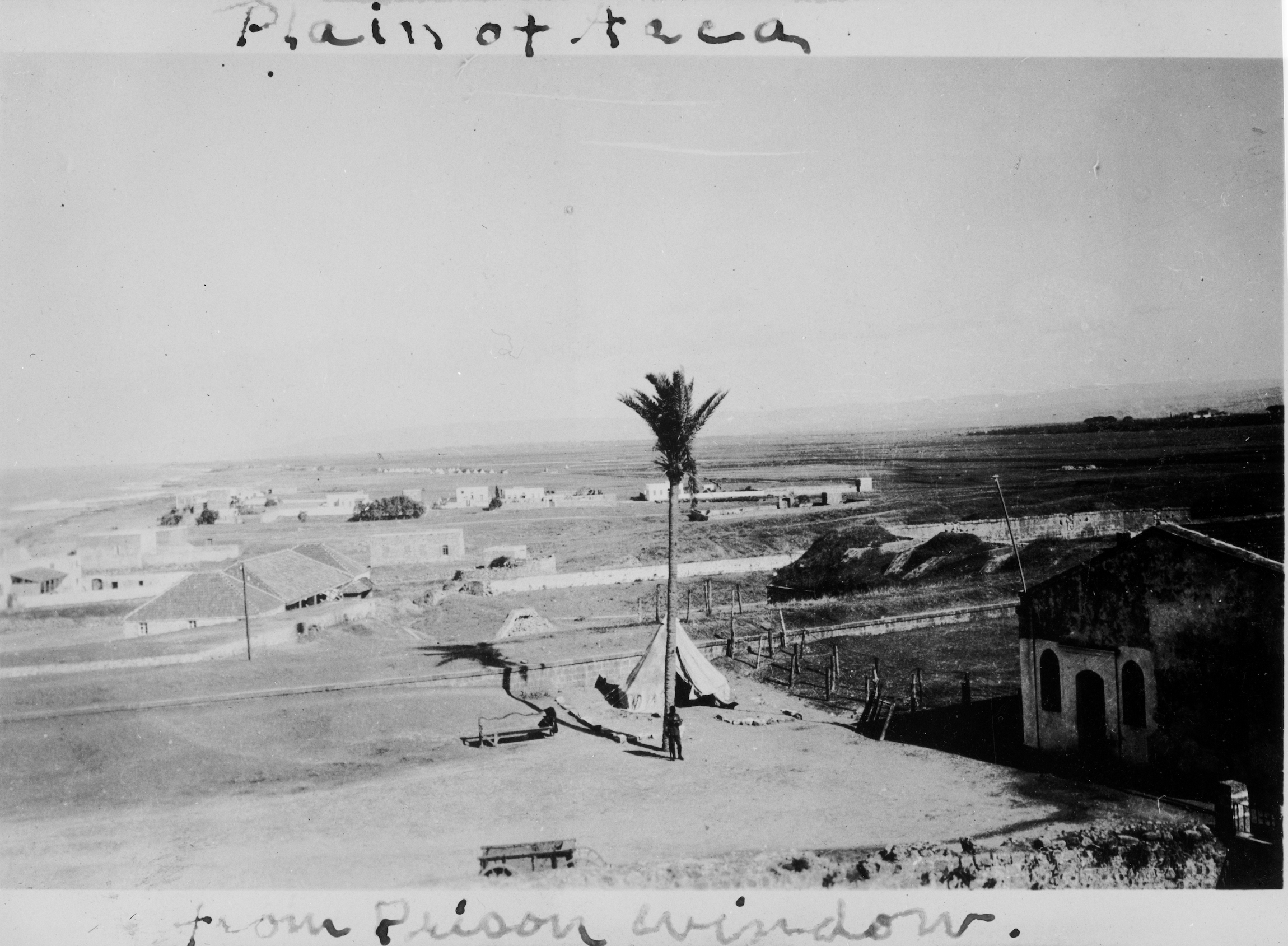
This photo, taken around 1900, shows the view from inside the prison quarters, looking north to the plain of Akka. Bahá'í World News Service.
At midnight, 'Abdu'l-Bahá succeeds in passing a message to the Governor and some water and cooked rice is sent to the prisoners. The foul-smelling rice is filled with grit and only a few can stomach it. Unpacking, they find a little bread and sugar from Gallipoli and send it to Bahá'u'lláh. Bahá'u'lláh returns it and orders it to be given to the children. 'Abdu'l-Bahá sends message after message to the Governor:
At last, he sent us water and some prisoners' bread; but the latter was worse even than the rice - appearing and tasting as though earth had been mixed with the flour.
Bahíyyih Khánum in Myron H. Phelps, The Master in 'Akká.
At length, 'Abdu'l-Bahá succeeds in obtaining permission for a servant to go out and purchase food under the condition he is accompanied by four soldiers and under strict instructions and threat of death, to speak to no one except merchants. 'Abdu'l-Bahá has to live in a room on the ground floor which used to be a morgue. The heavy humidity in the air will affect His health for the rest of His life.
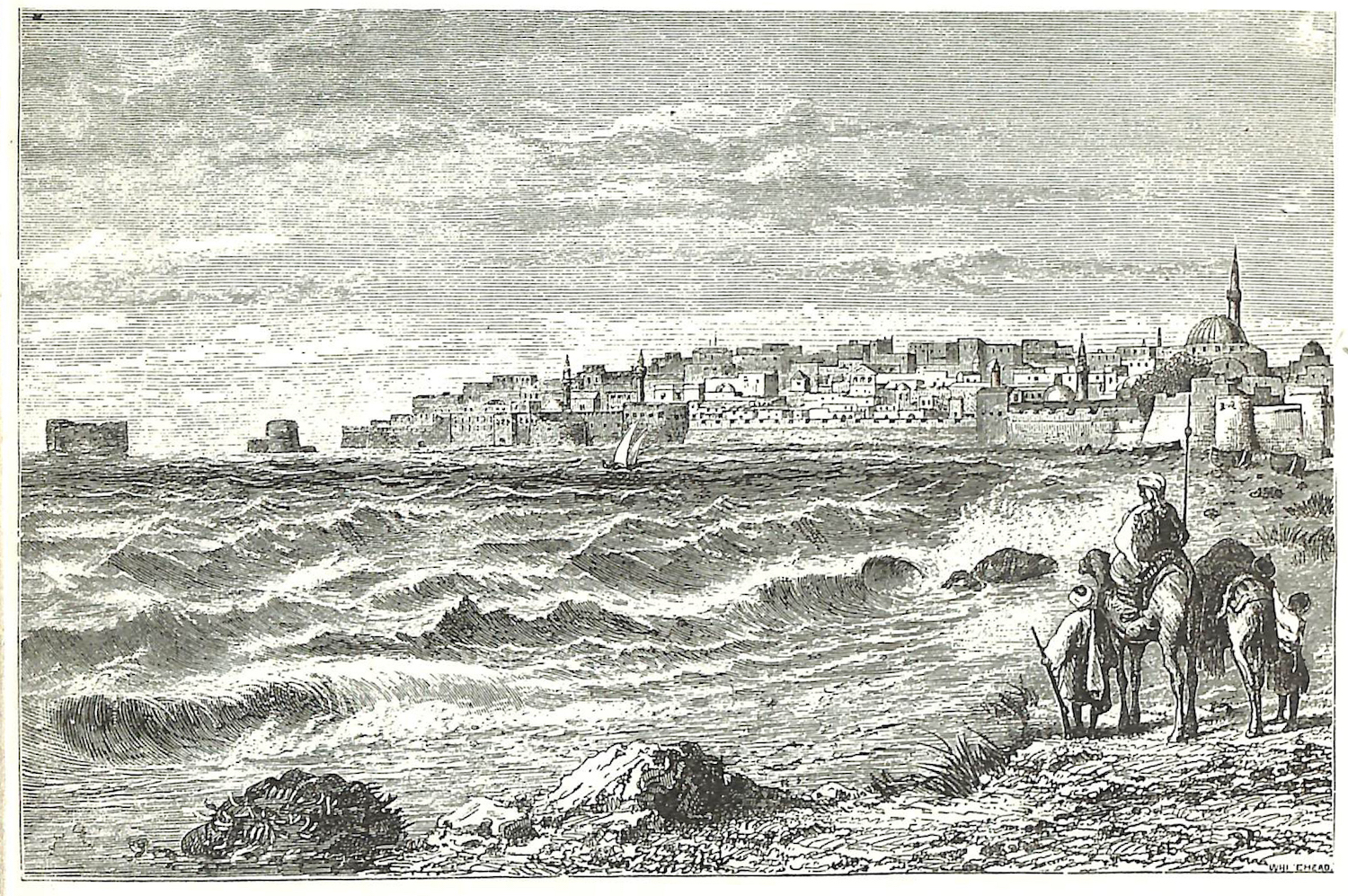
This drawing from a book published in the 1880s depicts 'Akká from a beach to the city’s west. The sea gate is near the left edge of the sea wall. (Source: W.M. Thompson, The Land and the Book). Bahá'í World News Service.
Sometime during this week, Aḥmad Big Tawfíq, the Governor of 'Akká, comes to the barracks for an inspection. Incensed by the conditions of their incarceration and the inedible rations, Áqá Ḥusayn-i-Áshchí, a cook in the household of Bahá’u’lláh, makes rude and insulting remarks to the Governor in Turkish. 'Abdu'l-Bahá instantly chastises Ḥusayn with a sharp slap in the face.
The message to the Governor is clear: 'Abdu'l-Bahá will not hesitate to act with justice and authority. Ḥusayn, in his memoirs prides himself with having been chastised, and notes a change in attitude in the Governor after this incident.
Soon, instead of the inedible bread rations, the prisoners are provided with a daily allowance.
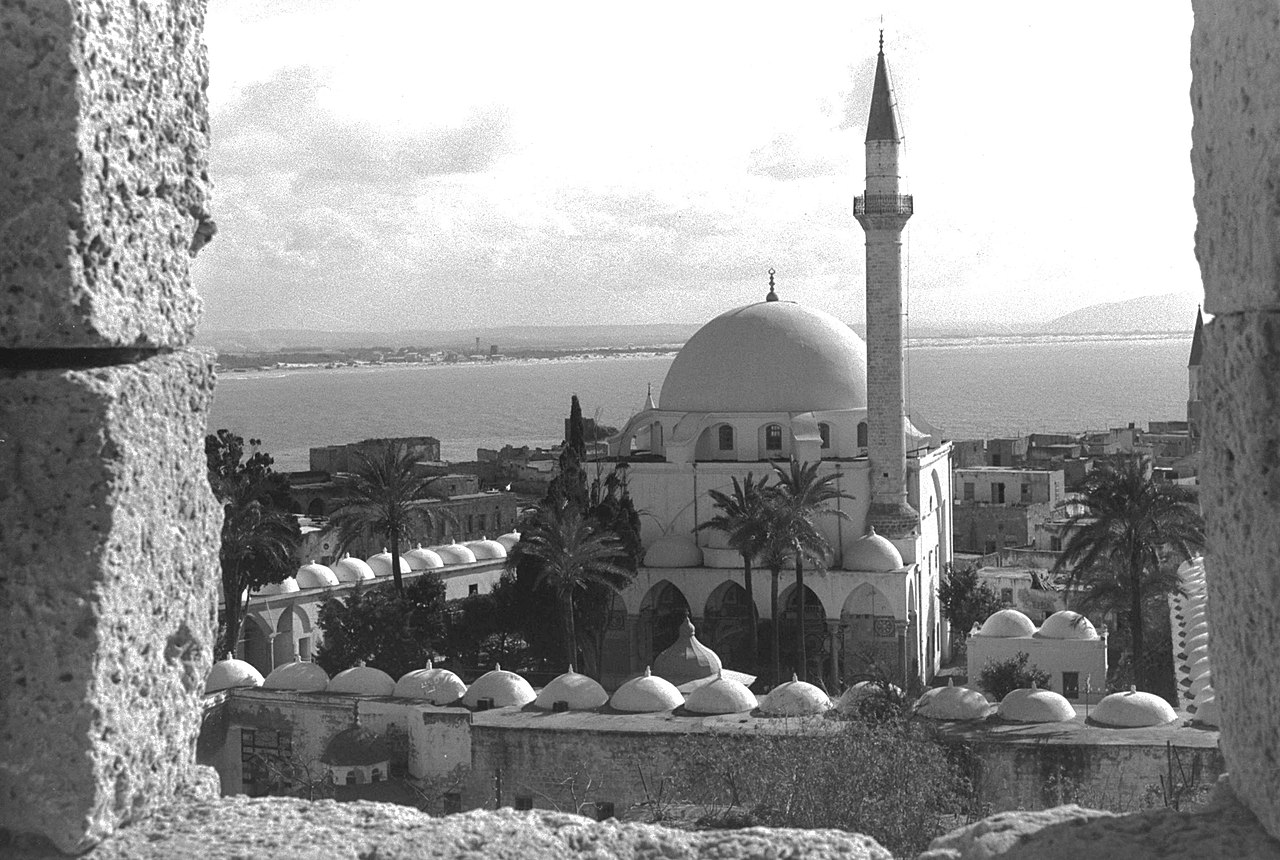
Mosque of “El Jaazar” Pasha against Haifa bay, Acre. Fritz Cohen. National Photo Collection of Israel, Photography dept. Wikimedia Commons.
The edict of the Sultán condemning Bahá'u'lláh to life imprisonment is read aloud in the Mosque of Al-Jazzár. The exiles are presented as murderers, thieves and political prisoners who corrupt the morals of the people. The edict states they are to be confined to prison for the rest of their lives, and forbidden from associating with anyone. When 'Abdu'l-Bahá hears the contents of the edict stating the exiles are to remain in prison for ever, He responds by saying it is meaningless and without foundation. Angered, the Governor answers it has come from the Sultán and demands to know how it could be described as meaningless. 'Abdu'l-Bahá explains that it is meaningless to describe their imprisonment as lasting forever, as a man lives in this world only for a short while, and sooner or later, all the exiles would leave the prisons, dead or alive, and 'Abdu'l-Bahá once again impresses the Governor of 'Akká.
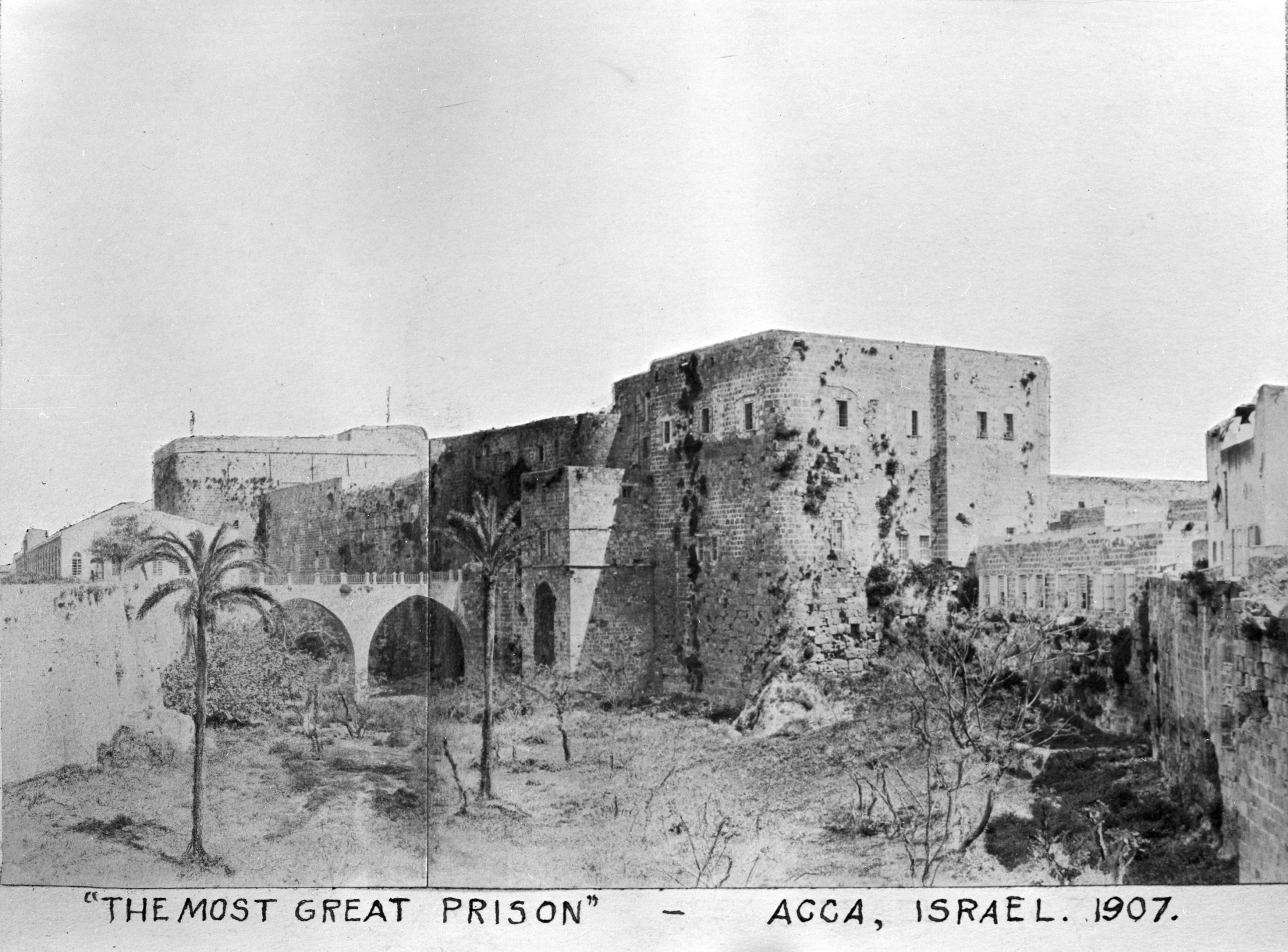
Prison of ‘Akká, where Bahá’u’lláh was incarcerated for a period of over two years -- the two windows farthest right on the second floor show the room that Bahá’u’lláh occupied in the prison, c. 1907. Bahá'í Media Bank.
Later, typhoid, fever and dysentery break out in the barracks and all the exiles fall sick except for 'Abdu'l-Bahá, Navváb, an aunt of 'Abdu'l-Bahá and two believers. The exiles are not allowed a physician, but 'Abdu'l-Bahá has quinine (a bitter medication made from the bark of a tree and effective in curing malaria) and bismuth (a soft metal with antacid properties) in His luggage. Armed with these two drugs and with His loving care, 'Abdu'l-Bahá succeeds in nursing all sixty-plus exiles back to health with the exception of four who pass away. There is no one among the seventy exiles with as much strength and health as 'Abdu'l-Bahá. During this time, He alone washes the patients, feeds them, nurses them, watches them. 'With the few provisions at His disposal, 'Abdu'l-Bahá can only cook a simple broth and some rice each day. Gradually, Abdu'l-Bahá single-handedly nurses everyone back to health. Once everyone is out of danger, utterly depleted and exhausted, 'Abdu'l-Bahá Himself falls ill with dysentery, along with Navváb and the other three healthy exiles. 'Abdu'l-Bahá remains critically ill for some time, until an officer, moved by the Master's heroic caretaking of the prisoners, pleads with the Governor for a physician to save His life. The Governor consents and under the doctor's care, 'Abdu'l-Bahá's health improves.
The physician grows so fond of 'Abdu'l-Bahá during the course of treating Him, that he offers his services to Him. 'Abdu'l-Bahá asks him to carry a Tablet to the believers who have been waiting to see Bahá'u'lláh and the physician hides the Tablet in the lining of his hat. For the next two years and in the same manner, the physician will convey Bahá'u'lláh's Tablets to the believers and their messages back to Him.
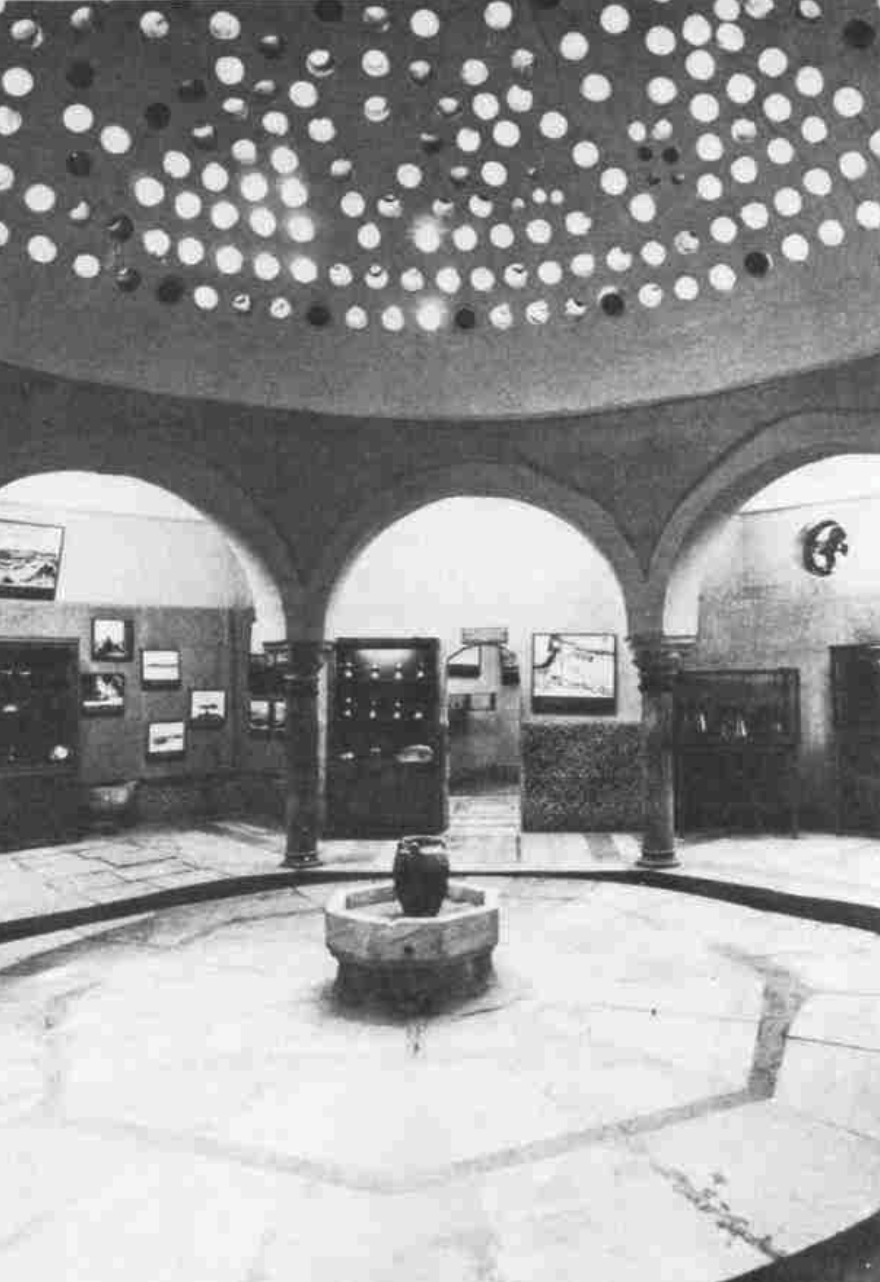
Interior of a public bath in 'Akká. Taherzadeh, Adib. The Revelation of Bahá'u'lláh Volume III: 'Akká, the Early Years (1868 - 1877)
While in the barracks, 'Abdu'l-Bahá manages to render a great service to Bahá'u'lláh, a service that is also a deep expression of love:
To bathe oneself is a great bounty. Near the army barracks in 'Akká there existed a public bath which was in a state of ruin. For the sake of the Blessed Beauty, I had it repaired.
'Abdu'l-Bahá speaking to Dr. Ḍíyá Baghdádí, quoted in "Memories of Bahá'u'lláh" by ‘Alí-Akbar Furútan page 49
(See the map under "Public Bath" to view where this bath is located)
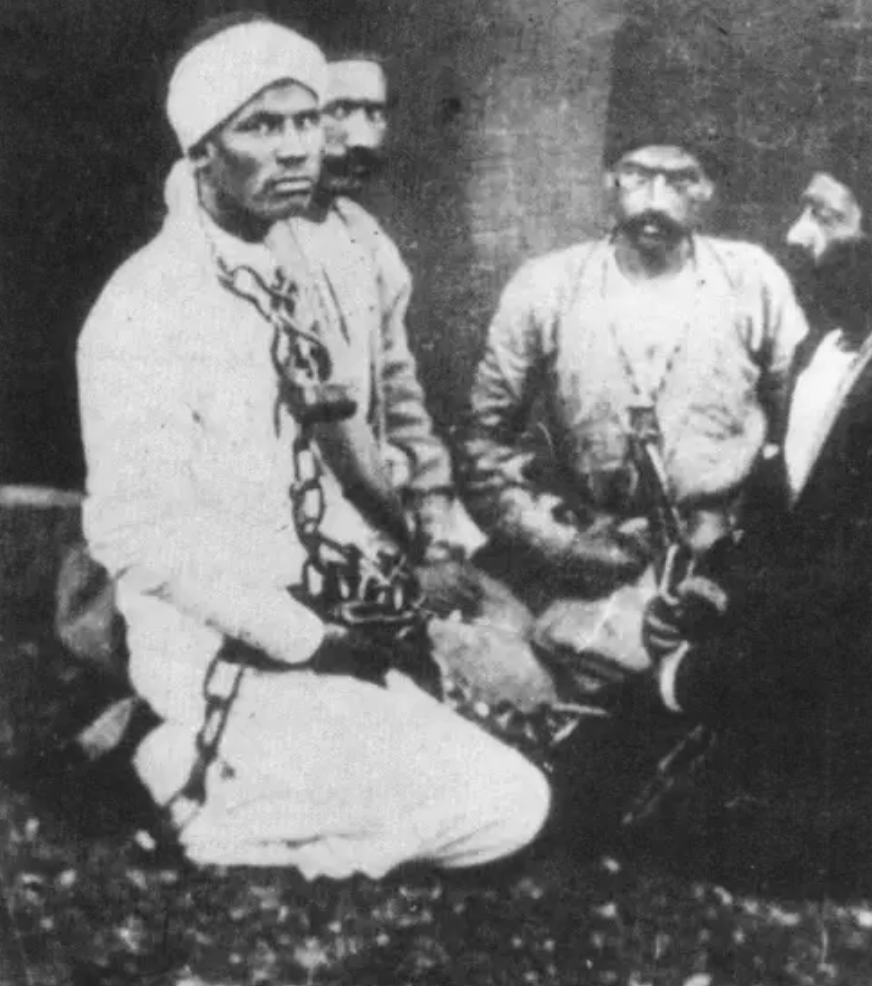
Badí‘, in chains, shortly before his martyrdom, July 1869. Reflections on the Baha'i Writings: Picture of Badi–The Pride of Martyrs.
Áqá Buzurg-i-Nishápúrí, known as Badí‘ (the Wonderful), is a 17-year-old water-carrier for Bahá'ís in Baghdád. When 28 of his companions are arrested, he proceeds to Mosul, where he again carries water, but is magnetically drawn to Bahá'u'lláh and sets off on foot for 'Akká, a distance of about 1.200 kilometers. When he arrives at the city gates, dressed in his humble garb of a water-carrier, he easily slips inside the city, past guards who strictly exclude Bahá'í pilgrims. Once inside the city, he is at a loss. He cannot make enquiries, but does not know how to contact the Bahá'ís. In the evening, he recognizes 'Abdu'l-Bahá in a group of Persians entering the mosque where he had settled. He writes a few words on a piece of paper and passes it to 'Abdu'l-Bahá, who then makes arrangements for Badí‘ to enter the citadel later that night.
Badí‘ will have two interviews with Bahá'u'lláh. During the course of these interviews, Badí‘ is entrusted with the mission of hand-delivering the Tablet to Náṣiri’d-Dín Sháh (the Lawḥ-i-Sulṭán). Many older, veteran believers have longed for this honor but Bahá'u'lláh had waited for the arrival of this youth, and said that in Badí‘ "the spirit of might and power was breathed." Badí‘ will tread alone, over deserts and mountains for four months, deliver the letter and finally is tortured and killed in July 1869. Over the course of three years, Bahá'u'lláh will repeatedly praise his valor, courage and constancy.
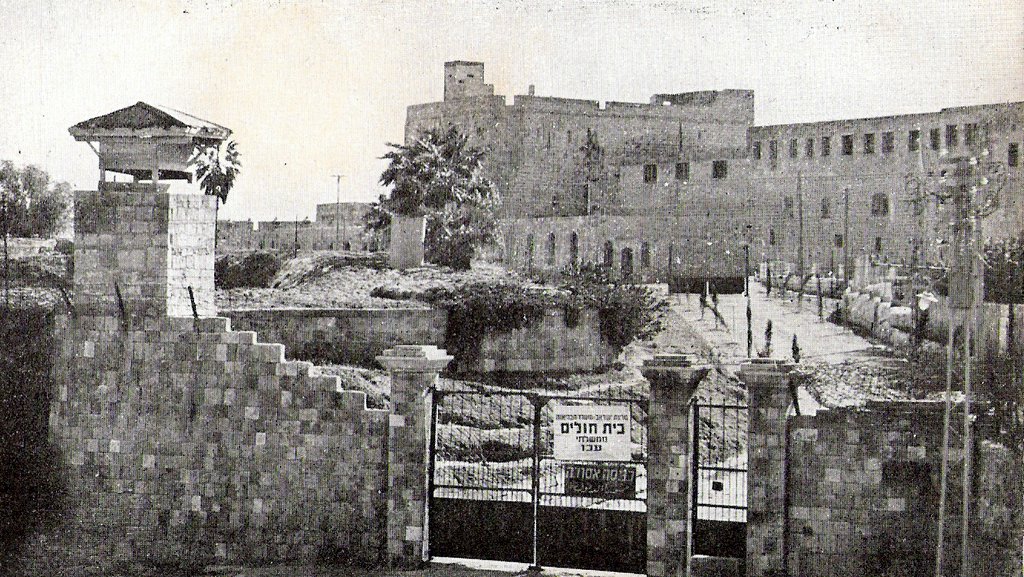
'Akká Fortress in the early 1950s. Wikimedia Commons.
Badí‘ will have two interviews with Bahá'u'lláh. During the course of these interviews, Badí‘ is entrusted with the mission of hand-delivering the Tablet to Náṣiri’d-Dín Sháh (the Lawḥ-i-Sulṭán). Many older, veteran believers have longed for this honor but Bahá'u'lláh had waited for the arrival of this youth, and said that in Badí‘ "the spirit of might and power was breathed." Badí‘ will tread alone, over deserts and mountains for four months, deliver the letter and finally is tortured and killed in July 1869. Over the course of three years, Bahá'u'lláh will repeatedly praise his valor, courage and constancy.
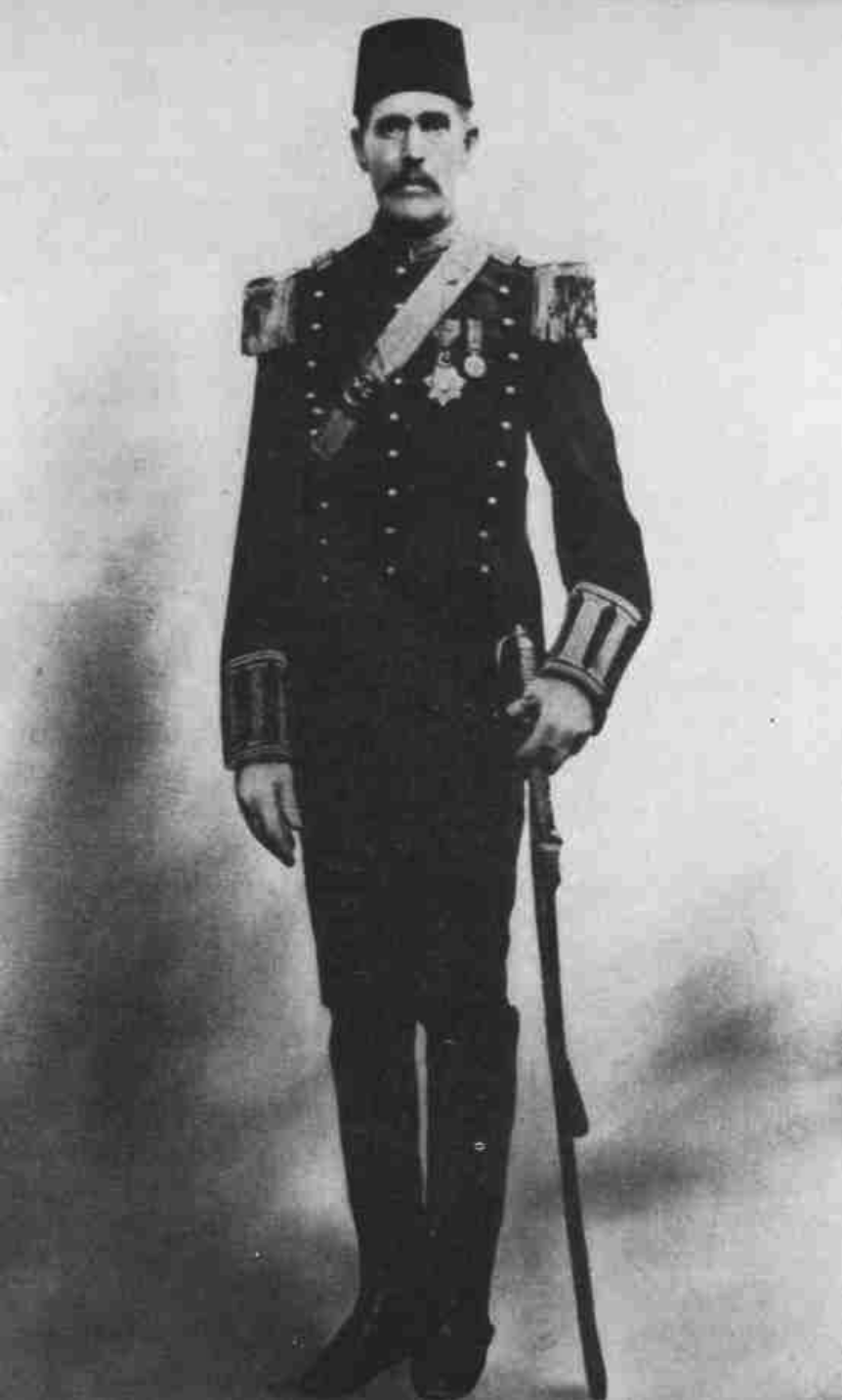
Colonel Aḥmad-i-Jarráh, Commander of the Guard during Bahá'u'lláh's imprisonment in the barracks. He later became a believer. Taherzadeh, Adib. The Revelation of Bahá'u'lláh Volume III: 'Akká, the Early Years (1868 - 1877) Pages 70 & 71.
The soldiers and officers at the barracks carry out the Sultán's edict strictly at first, confining Bahá'u'lláh, the Holy Family and the exiles to solitary life imprisonment and barring them from meeting anyone. Gradually, however, they are affected by Bahá'u'lláh's majesty, the loftiness of His teachings and His exalted character. 'Abdu'l-Bahá's loving disposition, His divine qualities, stainless character, saintly virtues impress them all. The guards and officers increasingly turn to the Master for guidance, and one of them, Colonel Aḥmad-i-Jarráh, the Commander of the Guard, even becomes a Bahá'í. Eventually, they start to relax the restrictions and become more lenient. Eventually, the exiles are given rooms in various parts of the barracks. Some now serve as cooks, cleaners, water carriers, errand-runners. 'Abdu'l-Bahá hires an Egyptian basket-weaver to teach some of the prisoners to weave rush mats. The barracks remain a hardship, but through the guidance and leadership of 'Abdu'l-Bahá, the exiles' daily lives are organized in such a way that they make the best out of the situation. Their greatest joy is to be in the presence of Bahá'u'lláh when He visits them in their quarters, and when they can offer Him the little food or refreshments they have to offer.
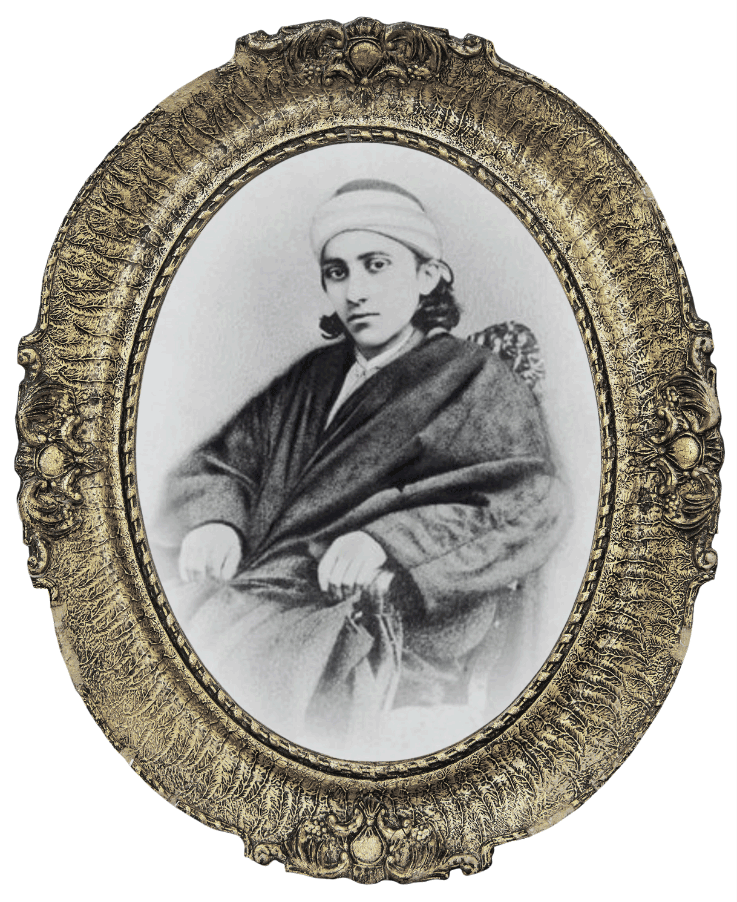
Mirza Mihdi © Bahá’í International Community. Baha'i Teachings: Sacrifice and The Book of Laws.
Mírzá Mihdí, the essence of gentleness and purity, was born in 1849 in Ṭihrán in the turmoil of the momentous year that saw the martyrdom of countless Bahá'ís in the uprisings of Mázindarán, Nayríz, and Zanján. When Bahá'u'lláh was exiled to Baghdád with His family, the three-year-old Mírzá Mihdí was too young and fragile to survive the arduous winter journey and was separated from his family for seven years, finally reunited with them in 1856, when Bahá'u'lláh returned from Sulaymaníyyih.
As a youth, Mírzá Mihdí was so pure that he became magnetized by the forces of Bahá'u'lláh’s Revelation, and served His Father every moment of his young life, acting as His amanuensis, copying innumerable Tablets in his distinguished and rapid handwriting, of which we still have many samples. Mírzá Mihdí was a noble, pious, and spiritual young man, whom Bahá'u'lláh titled Ghuṣnu'llahu'l-Aṭhar (the Purest Branch).
He led a pure and spiritual life and was a pillar of strength in the Bahá'í community, often sitting with the believers and reading from the Writings of Bahá'u'lláh, and, in the words of Shoghi Effendi, “teaching them the lessons of courtesy and patience, of dignity and radiant submission to the will of God.”
In 1870, Mírzá Mihdí was 21 years old and closely resembled 'Abdu'l-Bahá, although slightly taller than Him and without a beard, displaying divine spiritual qualities and an exquisite character. In the Most Great Prison, Mírzá Mihdí lived close to Bahá'u'lláh, entering His presence in the afternoons to serve as His amanuensis, and devoting a great deal of time to prayer and meditation.
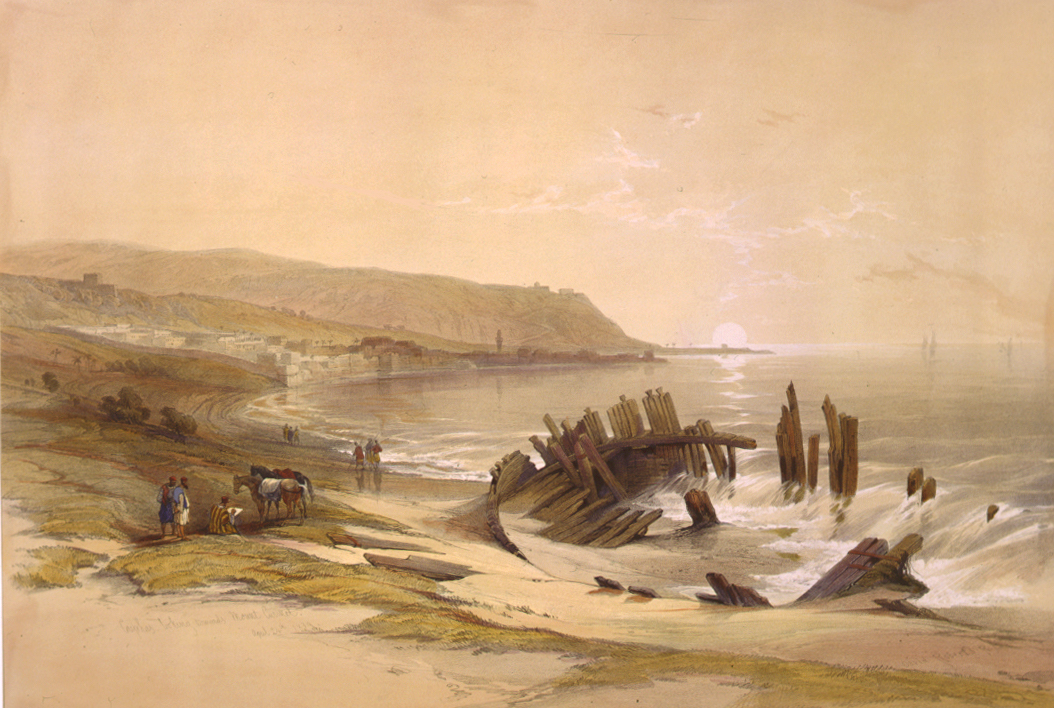
This painting, from 1839, shows a view of Haifa from the north. This view would be similar to the one Mírzá Míhdí would have had from the top of the citadel looking across the Bay. (Source: David Roberts, "Caiphas looking towards Mount Carmel"). Bahá'í World News Service.
In June of 1870, 22-year-old Mírzá Mihdí, known as the Purest Branch (ghuṣn-i-aṭhar) and ‘Abdu’l-Bahá’s younger brother by four years, is known to go to the roof-top of the citadel in the evening in order to pray and meditate. The view from the roof is beautiful. The plains of 'Akká spread below with majestic Mount Hermon in the distance, and one can admire the silhouette of Mount Carmel in the distance against the blue Mediterranean.
One June 22, 1870, Mírzá Mihdí is pacing up and down the roof, deep in meditation and prayer, and tragically does not remember to count his steps, as he usually does, to avoid an open skylight. He falls and lands on a crate, which pierces his chest. The sound of his fall and the rush of companions towards it, pulls Bahá'u'lláh from His room.
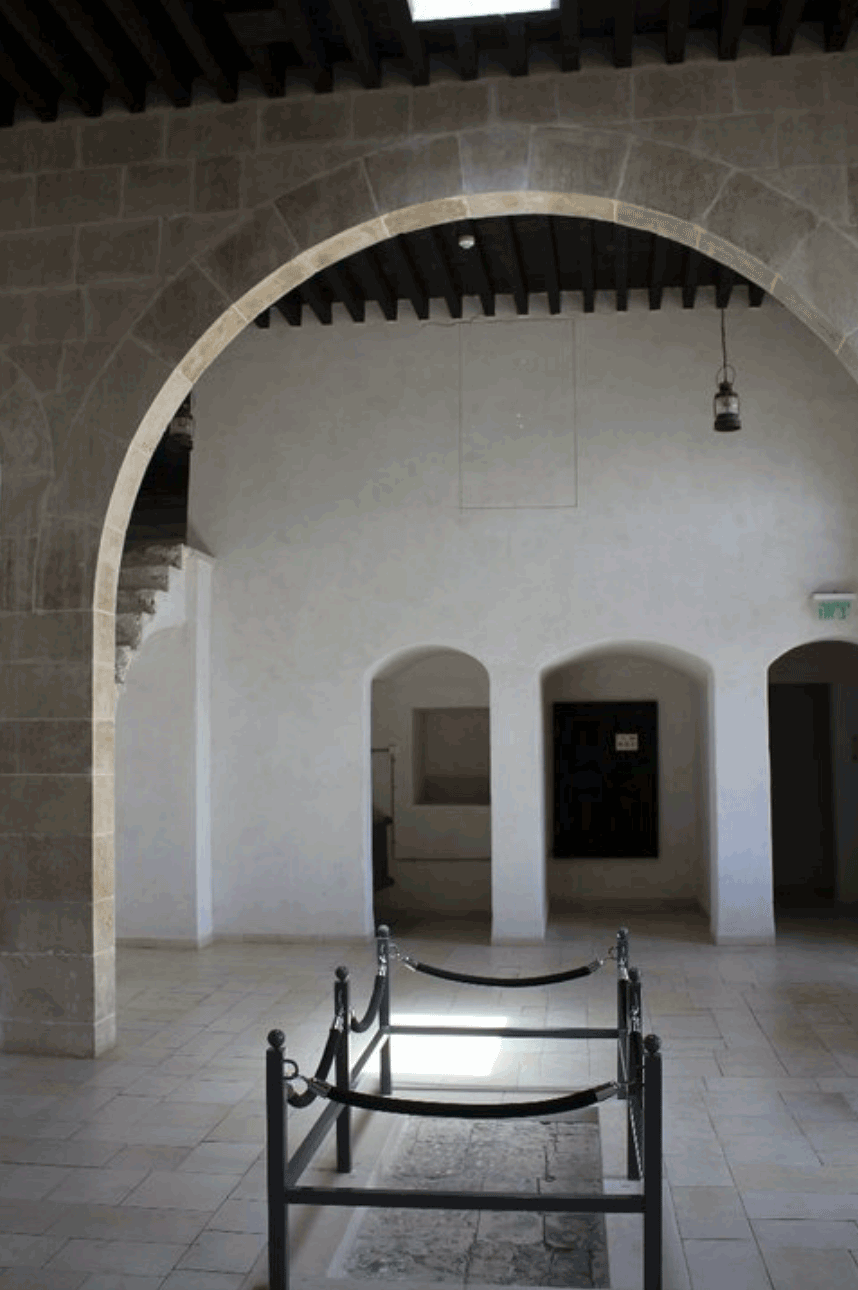
The skylight (now restored) through which Mírzá Mihdí fell. Photo by Caroline Lüdecke from the website Bahá'í Chronicles.
Though in immense pain, Mírzá Mihdí remains attentive to the visitors who crowd by his bedside and even expresses discomfort to one of the believers at having to lie down in front of his visitors. Witnesses recall hearing Bahá'u'lláh lament aloud,
Mihdí! O, Mihdí!
Everyone is grief-stricken, no one more so than Navváb. 'Abdu'l-Bahá enters the presence of Bahá'u'lláh with tearful eyes, prostrated Himself at His feet and begs for His young brother's healing. Bahá'u'lláh reportedly responds:
O my Greatest Branch, leave him in the hands of his God.
Bahá'u'lláh then dismisses everyone and stays by Mírzá Mihdí's bedside for an hour:
Although no one knows what took place in that precious hour between the lover and the Beloved, we can be sure that this son of Bahá'u'lláh, whose devotion and love for the Cause of His Father knew no bounds, must have been exhilarated by the outpouring of bounties and love from his Lord.
Adib Taherzadeh, The Revelation of Bahá'u'lláh Volume III: 'Akká, the Early Years (1868 - 1877) page 207
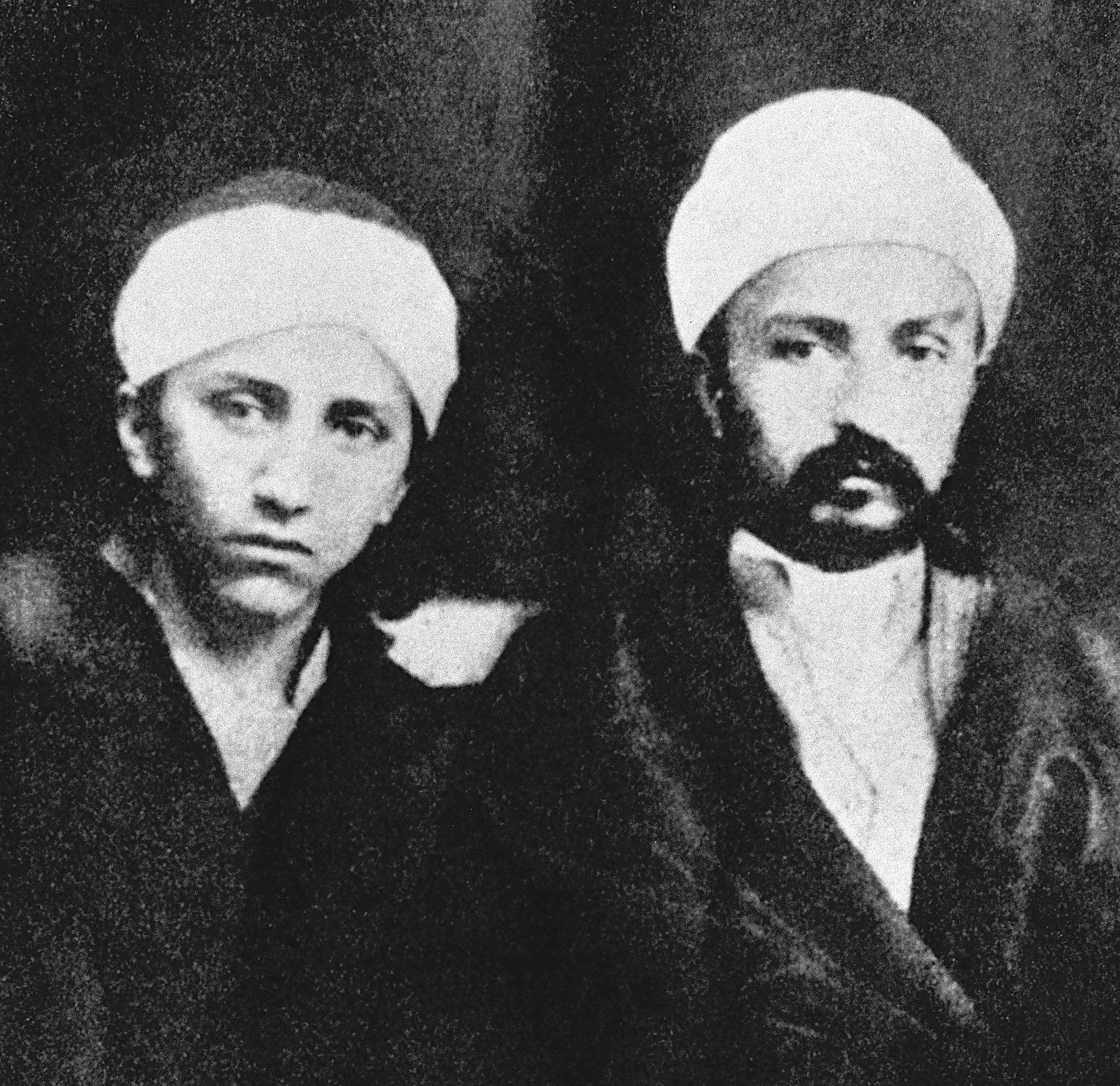
‘Abdu’l-Bahá (right) with His brother Mírzá Mihdí, The Purest Branch (left), taken in Edirne, c. 1864-1868. Bahá'í Media Bank.
Áqá Ḥusayn-i-Áshchí (the same one chastised by 'Abdu'l-Bahá in front of the Governor a few months earlier) recalls the last conversation between Bahá'u'lláh and His beloved Son:
Bahá'u'lláh asked him: "'Áqá, what do you wish, tell Me," to which His son replied: "I wish the people of Bahá to be able to attain your presence." "And so it shall be," Bahá'u'lláh said, "God will grant your wish."
Quoted in H.M. Balyuzi: The King of Glory, page 311-313
Mírzá Mihdí dies the next day, June 23, 1870. About his death and sacrifice, Shoghi Effendi writes:
In a highly significant prayer, revealed by Bahá’u’lláh in memory of His son—a prayer that exalts his death to the rank of those great acts of atonement associated with Abraham’s intended sacrifice of His son, with the crucifixion of Jesus Christ and the martyrdom of the Imám Ḥusayn—we read the following: “I have, O my Lord, offered up that which Thou hast given Me, that Thy servants may be quickened, and all that dwell on earth be united.” And, likewise, these prophetic words, addressed to His martyred son: “Thou art the Trust of God and His Treasure in this Land. Erelong will God reveal through thee that which He hath desired.”
Bahá'u'lláh, quoted by Shoghi Effendi in God Passes By
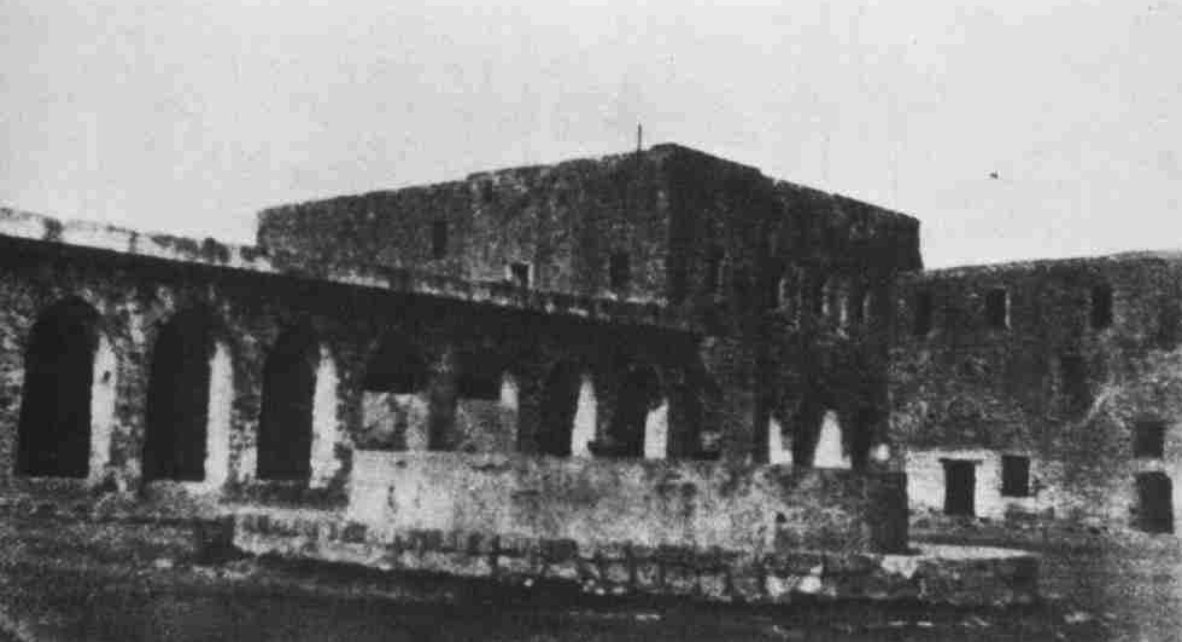
The Courtyard of the barracks, circa 1920.The waterpool is in the centre. It is probably in this courtyard that the tent was pitched for the washing of the body of the Purest Branch. The Revelation of Bahá'u'lláh Volume III: 'Akká, the Early Years (1868 - 1877) Pages 70 & 71.
Shaykh Mahmúd requests from 'Abdu'l-Bahá that the honor of washing and shrouding the body of the Purest Branch, so the soldiers will not lay a hand on this holy trust. 'Abdu'l-Bahá consents and a tent is pitched in the yard underneath which the body of the martyred Mírzá Mihdí is prepared for burial. During this time, 'Abdu'l-Bahá is so stricken by the the sudden loss of His beloved younger brother, that His face is imprinted with grief.
He paces outside the tent where the body of His brother lies.
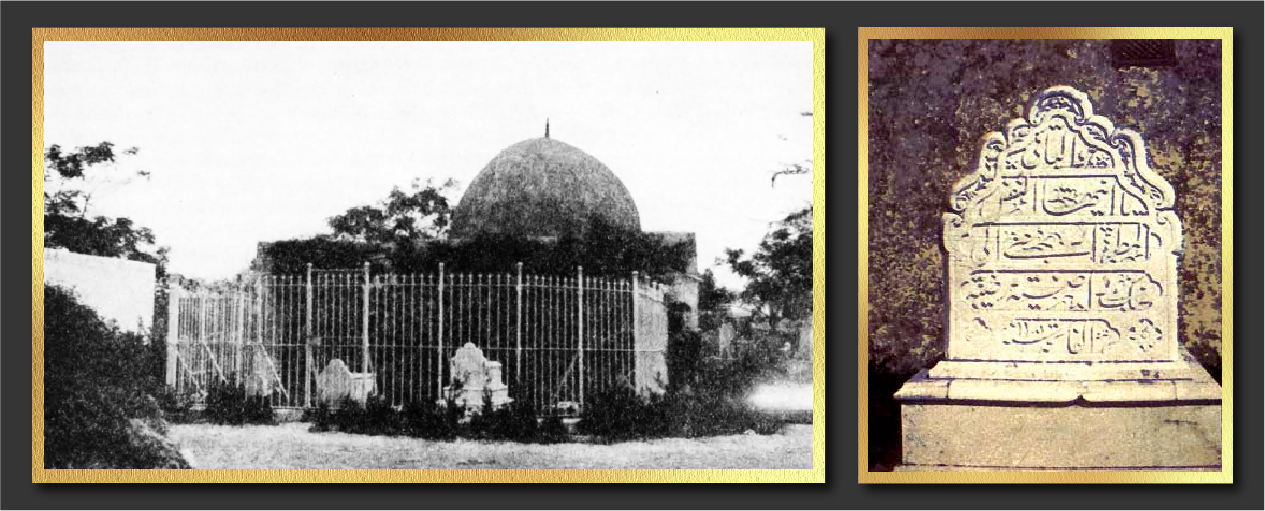
Left: A 1930s photograph depicting the section of the Muslim cemetery of 'Akká where the Shrine of Nabí Ṣáliḥ is located with a row of graves including that of Mírzá Mihdí. Source: Bahá'í Media. Right: The original headstone of Mírzá Mihdí's grave in the cemetery of Nabí Ṣáliḥ, before his remains were moved to their final resting place, in the company of his saintly mother Ásíyih Khánum, and sister, Bahíyyih Khánum on the slopes of Mount Carmel, and at the heart of the Administrative Order of the Bahá'í Faith. Source: Bahá'í Media.
On 24 June 1870 in the afternoon, Mírzá Mihdí’s martyred body is placed in a casket and as the sounds of weeping and lamentation rose, it is carried out of the Most Great Prison on the shoulders of barracks guards, in a serene and majestic funeral procession joined by the notables of 'Akká. Bahá'u'lláh’s youngest son was laid in a Muslim cemetery beyond the city walls, near shrine of Nabí Ṣáliḥ.
After Mírzá Mihdí’s funeral, at 17:00 (5:00 PM) on 24 June 1870, an earthquake hit Palestine. The tremors lasted three minutes and were felt around Palestine, from Jerusalem to 'Akká , Nazareth, and Gaza. Nabíl, Siyyid Mihdíy-i-Dahají, and Nabíl-i-Qá'iní were in Nazareth when the earth shook, and said people were frightened.
Bahá'u'lláh Himself confirms the earthquake following Mírzá Mihdí’s burial in a Tablet of Visitation for the Purest Branch:
“When thou wast laid to rest in the earth, the earth itself trembled in its longing to meet thee.”
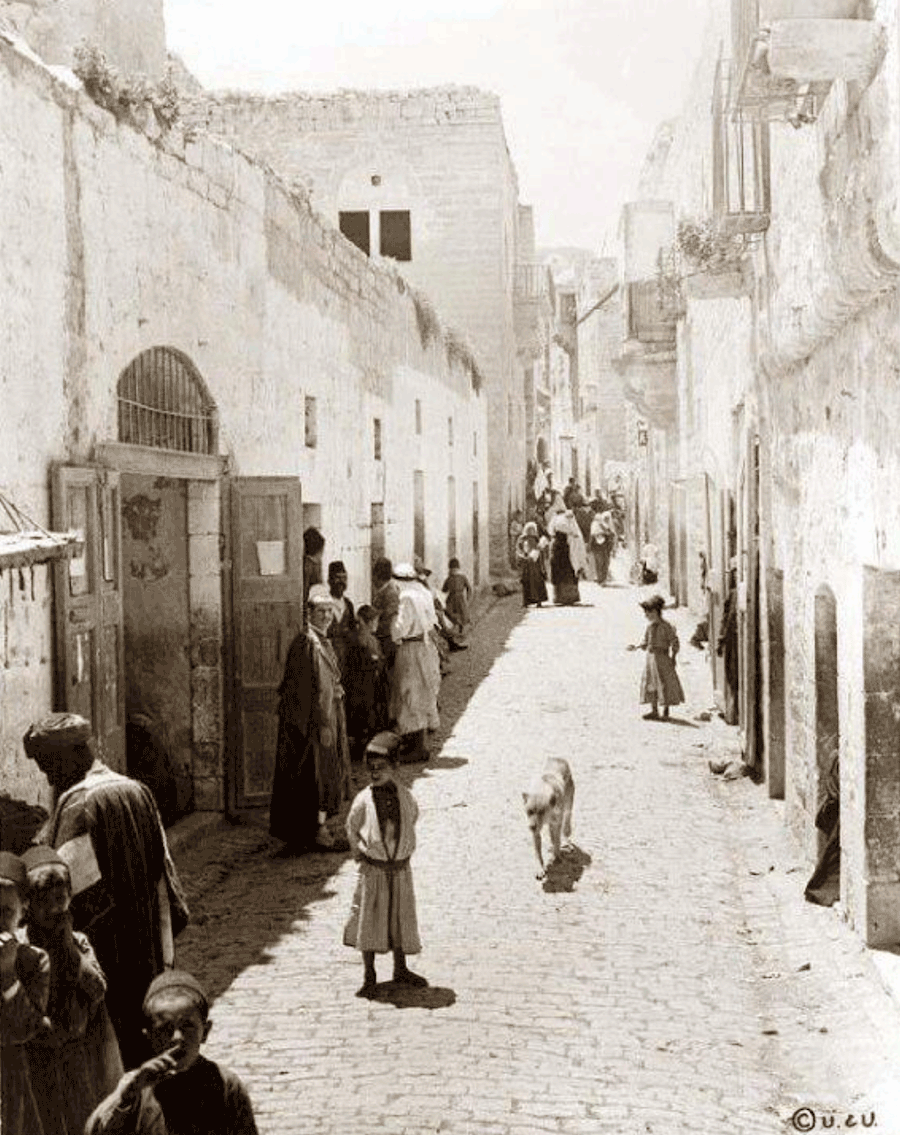
A street in Bethlehem, Palestine, in 1880. This photograph is contemporary of ‘Abdu'l-Bahá's time in 'Akká and shows what a street He would have walked down with the Muftí of 'Akká might very well have looked like. Ajdadalarab Wordpress Site.
‘Abdu'l-Bahá and the Muftí of 'Akká (Part I)
A Muftí is a highly respected Islamic scholar and jurist. In the nineteenth century, they are extremely important figures in Islamic society. One day, Shaykh 'Alíy-i-Mírí, the Muftí of ‘Akká, a somewhat fanatical man, expresses to 'Abdu'l-Bahá his desire to meet Bahá'u'lláh. He has some questions he wants answers to. At this time, Bahá'u'lláh does not grant interviews, in order to comply with the Sultán's edict. Eventually, after 'Abdu'l-Bahá pleads the Muftí's case, Bahá'u'lláh grants permission. 'Abdu'l-Bahá stands by the door, the Muftí takes his seat and asks his questions. Bahá'u'lláh then begins revealing, and it is not Him, but the Tongue of Grandeur ushering a flow of Utterance. Seeing the Muftí is about to speak, 'Abdu'l-Bahá sends him a commanding signal that Bahá'u'lláh is not to be interrupted when revealing. When his interview is concluded, 'Abdu'l-Bahá walks a discontented Muftí back to the prison gate. This is a man used to the shopkeepers kissing his hand when he walks through the bazaars of 'Akká and his pride is hurt at having been ordered to keep silent. Gradually, however, as he spends more time with ‘Abdu'l-Bahá, the Muftí starts to see his knowledge and learning as a drop when compared with ‘Abdu'l-Bahá's vast ocean of innate knowledge. He starts to show humility and friendliness, he seeks the Master's company and partakes of His wisdom and His knowledge. The Muftí's attitude changes. In the bazaars where he used to have his hands kissed, he now walks a few steps behind 'Abdu'l-Bahá.
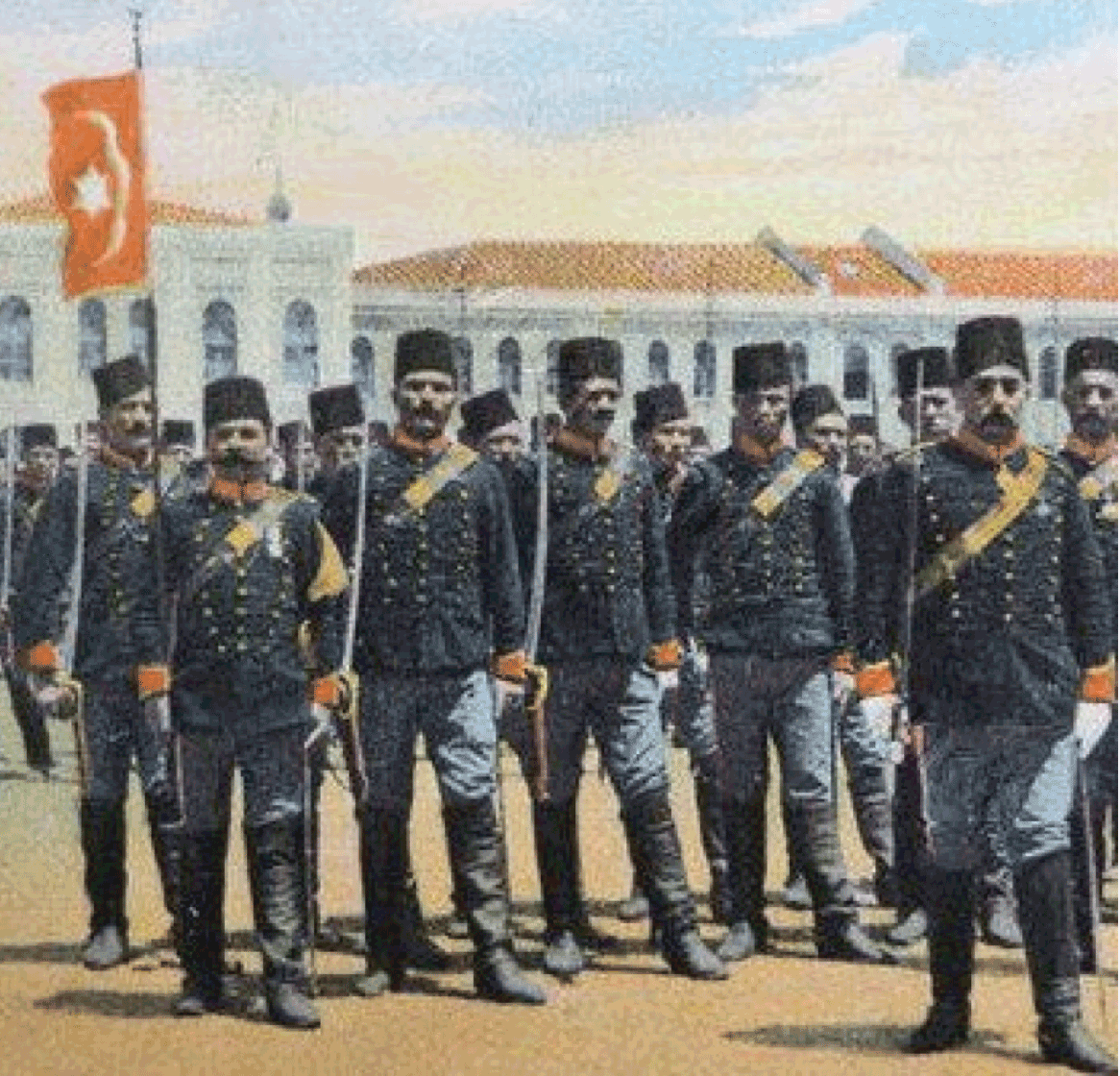
A colorized photograph postcard (pre-1908), of the Guard Field Artillery in the Ottoman Army. Ottoman Uniforms: 1876 - 1908 Ottoman Artillery.
The movement of troops within the Ottoman Empire forces the authorities of 'Akká to requisition the barracks for military use. The gates which had bolted shut behind the exiles on August 31, 1868 are now flung open and the believers are scattered in various accommodations within the city walls.
The dying wish of Mírzá Mihdí is about to be fulfilled.
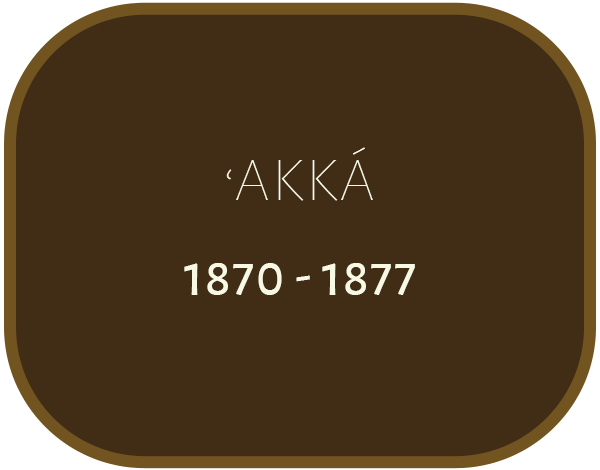
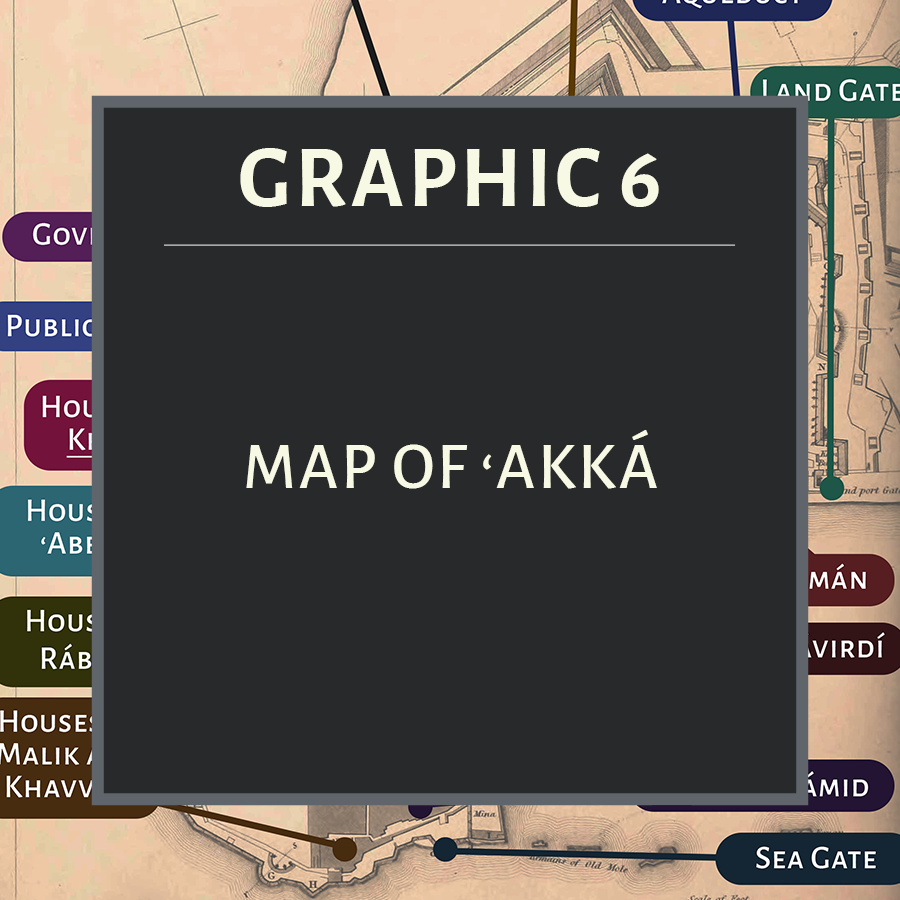
Map of the places associated with Bahá’u’lláh and ‘Abdu’l-Bahá during Their years in ‘Akká. Original graphic by Violetta Zein. 1840–43 British Government Royal Engineers Corps map of Acre, Palestine. Wikimedia Commons.
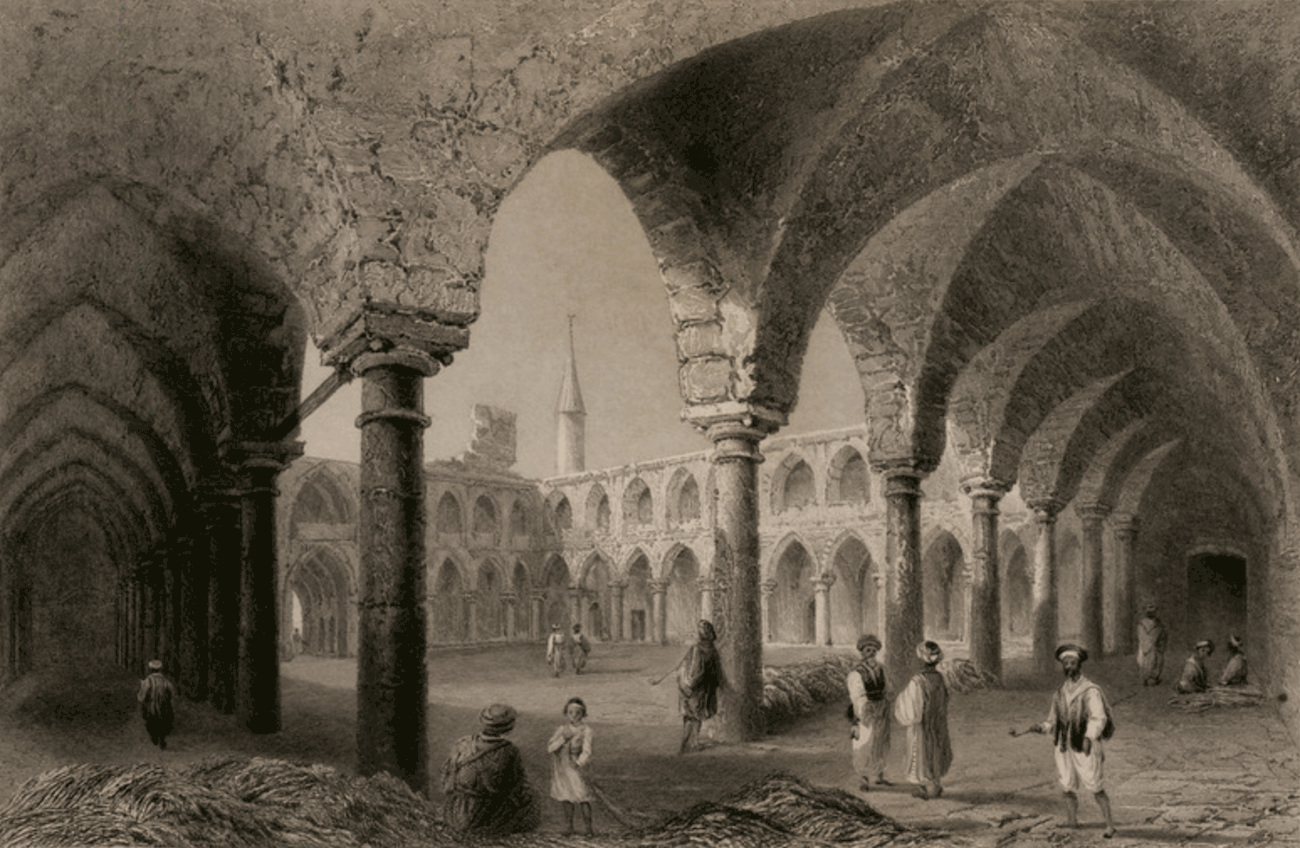
The Khán-i-Avámid, Caravanserai in 'Akká in 1836. John Carne. Syria, The Holy Land, Asia Minor, &c. Illustrated. Wikimedia Commons.
When Bahá'u'lláh and the Holy Family are moved from one house to another, most of the exiles and 'Abdu'l-Bahá are lodged in the Khán-i-Avámid (the Caravanserai), close to the sea. Mírzá Músá and his family live in a house within the Khán-i-Avámid. 'Abdu'l-Bahá lives in a room which doubles as the Pilgrim House.
Pilgrims arriving from Persia are first received by 'Abdu'l-Bahá in this room. The Master sees to it that the pilgrims are ready to meet Bahá'u'lláh, in every sense of the word: He ensures they have a change of clothes and exemplifies such courtesy, humility and utter selflessness that they absorb His example.
During His years in 'Akká, 'Abdu'l-Bahá is said to regularly distribute alms to the poor, and on Feast days, 'Abdu'l-Bahá hosts the children of 'Akká and offers them refreshments, including sherbet placed in the basin of the caravanserai. Eminent Bahá'ís will pass through the Khán-i-Avámid through the years, such as Mishkín-Qalam, Zaynu'l-Muqarrabín and Ḥájí Mírzá Ḥaydar-‘Alí.
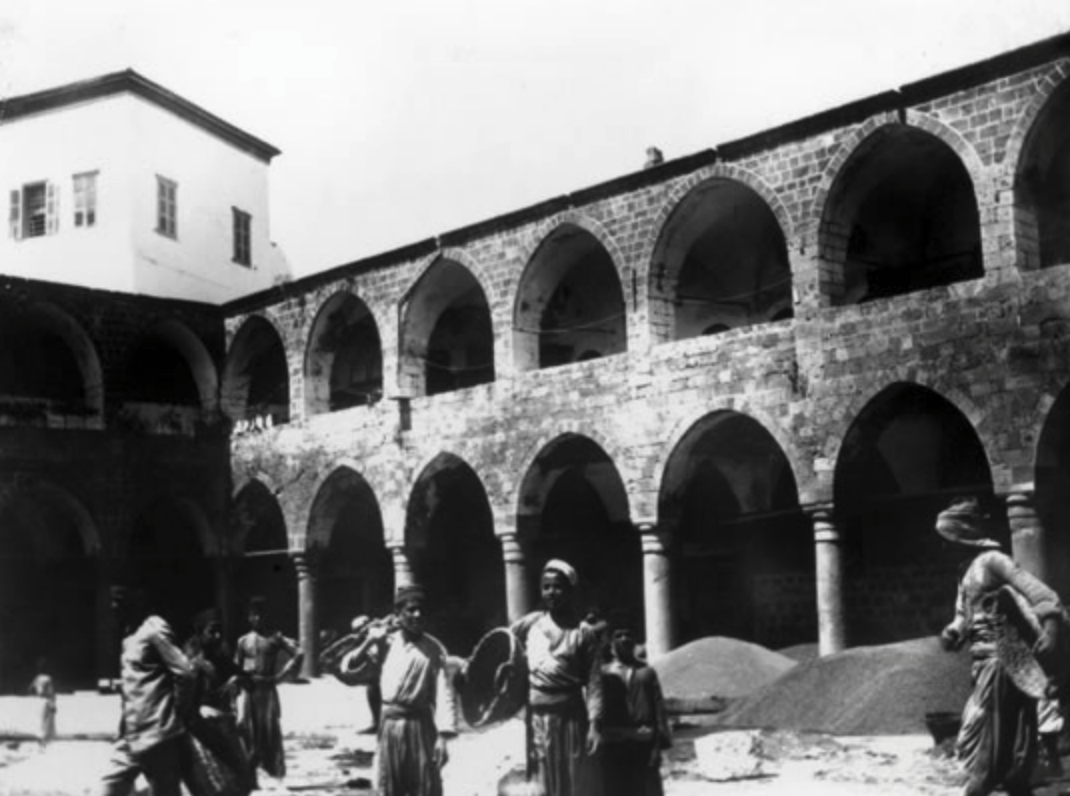
The Khán-i-Avámíd, a caravanserai in ‘Akká. Photo Credit: Bernard Dichter, early 1900s. The Life of Bahá'u'lláh: A Photographic Narrative.
The rooms in the Khán-i-Avámid are filthy and damp. 'Abdu'l-Bahá sells a gift He had received in Baghdád and uses the money to begin repairing the exiles' rooms, of course leaving His room for last. Predictably, the money runs out before He can repair His quarters which boast an earth floor, damp walls with grass growing on them, a leaking roof, and a very unfortunate flea infestation. 'Abdu'l-Bahá's bed during this period is a simple straw mat on the ground, and a sheepskin to cover Himself. Because the flea infestation in His room is so severe, the only way to defeat the fleas is for 'Abdu'l-Bahá to flip over the sheepskin eight or ten times a night to disrupt the little vermin. 'Abdu'l-Bahá leaves the Khán-i-Avámid at some point during Bahá'u'lláh's residence in the house of ‘Údí Khammár. At that time, the activities of the Covenant-Breakers are such that 'Abdu'l-Bahá desires to stay close to Bahá'u'lláh.
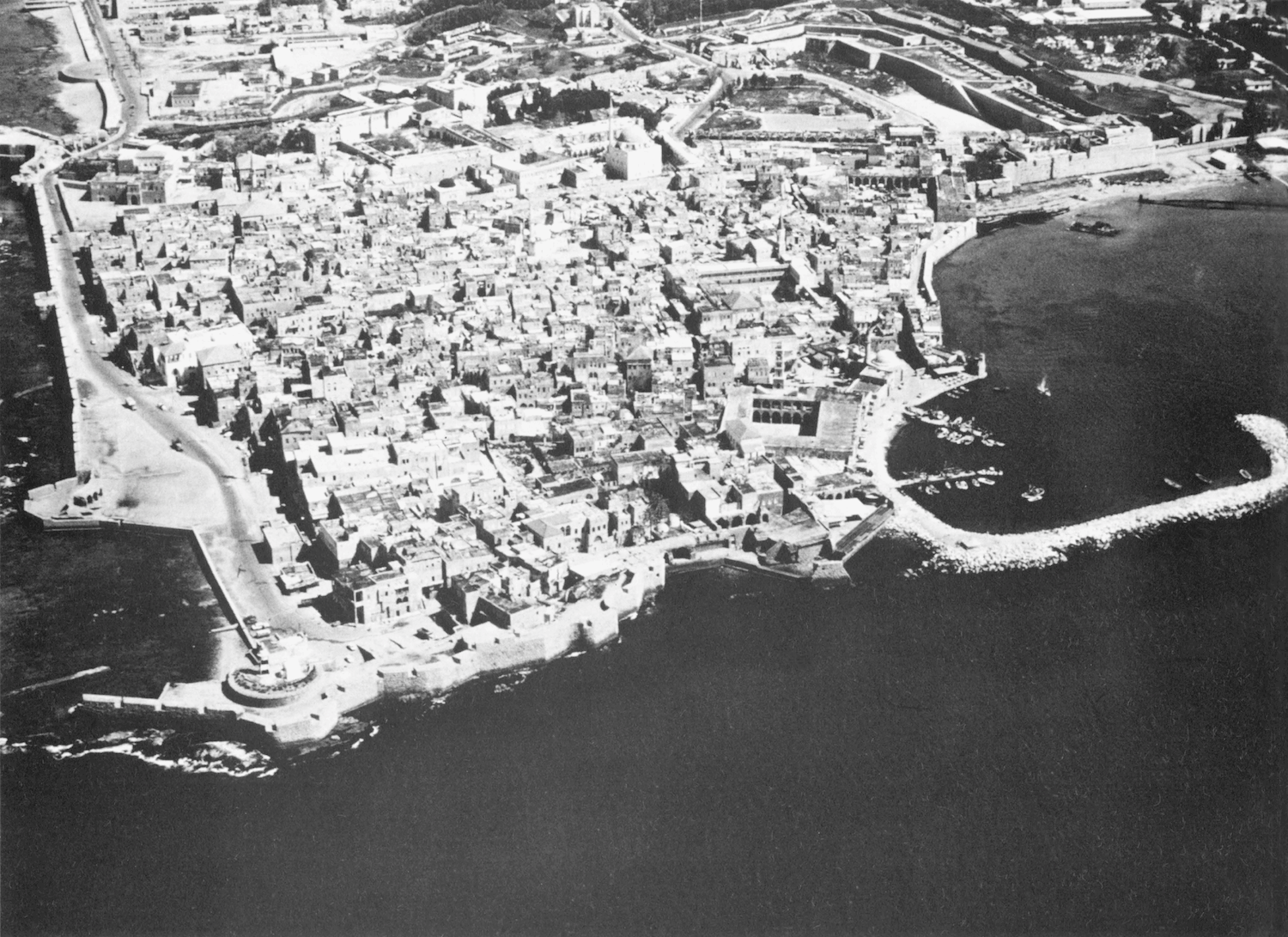
An aerial photograph of old 'Akká
The first house that Bahá'u'lláh occupies for three months is the House of Malik in the West of 'Akká, in the Fákhúrah quarter, which is the former Templar quarter, near the churches of St. George and St Andrew.
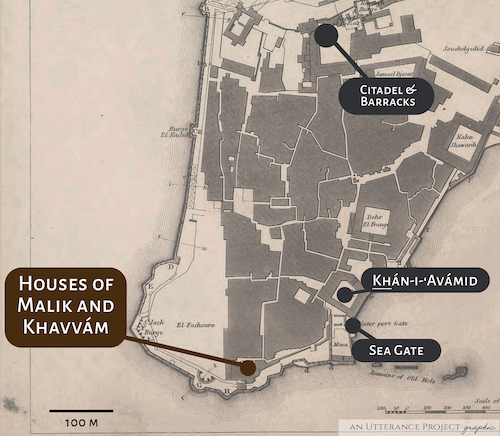
The authorities move the Holy Family to the house of Khavvám, across a narrow lane from the House of Malik in January 1871 for a few months, still in the Christian south-western part of 'Akká.
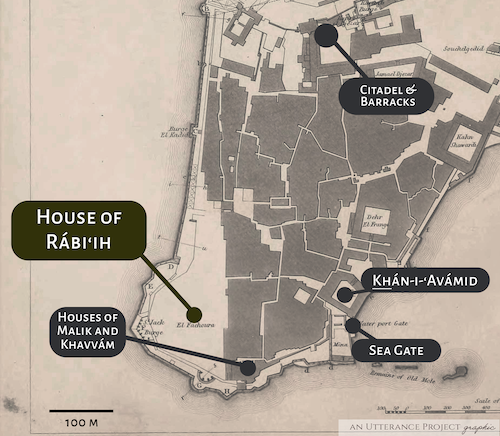
The Holy Family is then again forced to move, this time into a Muslim quarter of 'Akká, once the quarter of merchants of Pisa during the Crusades. They move into the house of Rábi'ih, a charcoal-maker, adjacent to a tiny shrine of a warrior of Ṣaláḥ al-Dín, where they stay four months.
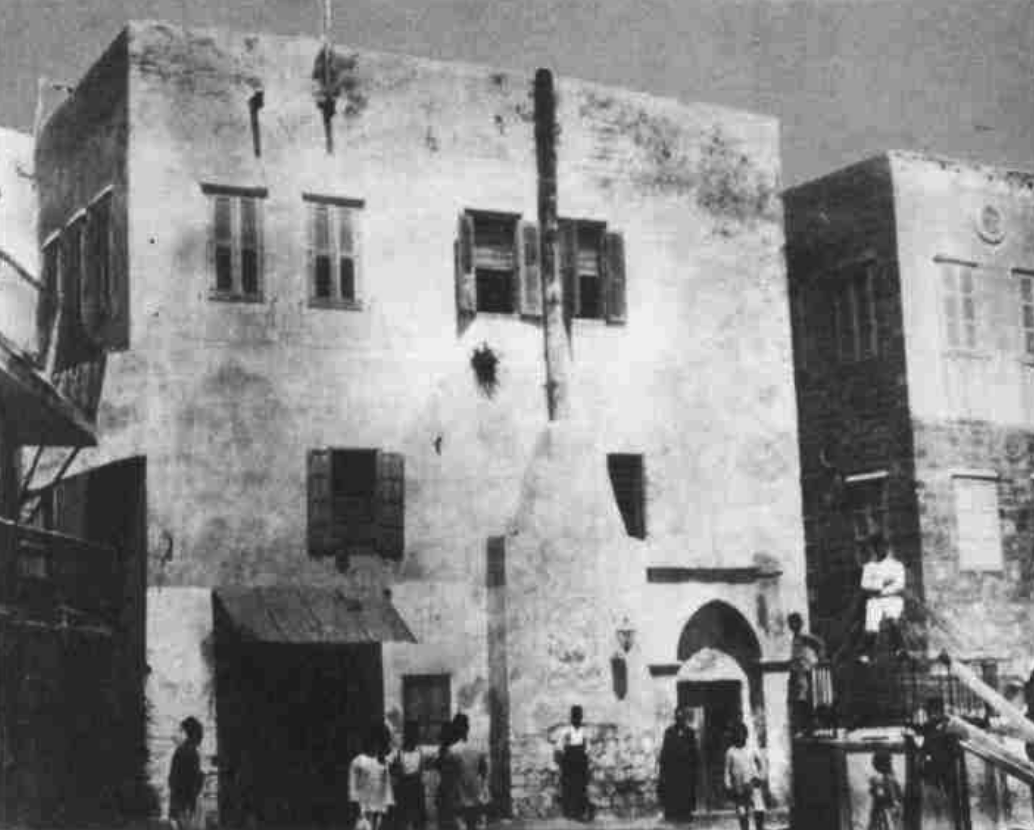
The house of ‘Údí Khammár. Taherzadeh, Adib. The Revelation of Bahá'u'lláh Volume III: 'Akká, the Early Years (1868 - 1877)
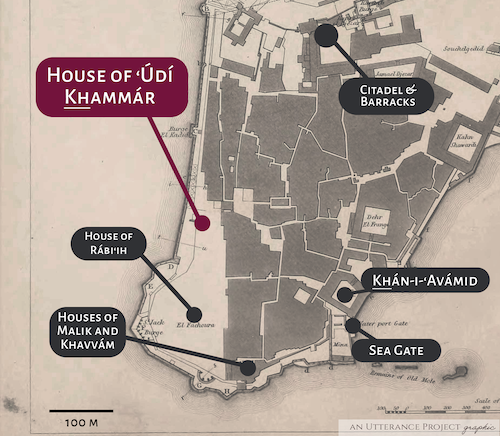
Finally, the Bahá'ís discover an empty house. ‘Údí Khammár, a wealthy Christian merchant, has vacated his small town house in order to move to a veritable palace at the garden of Bahjí (Delight), two kilometers north-east of the city.
The Holy Family moves into the ‘Údí Khammár, into the heart of the Christian community of 'Akká, but the house is much too small for their needs. At one point, 13 people men and women are forced to share one room. Some of the believers move to the Khán-i-Avámid. When Bahá'u'lláh enters the house of ‘Údí Khammár, the crisis with the Covenant-Breakers reaches a climax. One of the Covenant-Breakers Bahá'u'lláh had expelled from the community for his reprehensible behavior succeeds in poisoning the hearts and minds of the people of 'Akká against Bahá'u'lláh through a campaign of vicious lies and calumnies. Bahá'u'lláh withdraws away from the grieved believers and 'Abdu'l-Bahá leaves the Khán-i-Avámid to stay close to His Father.
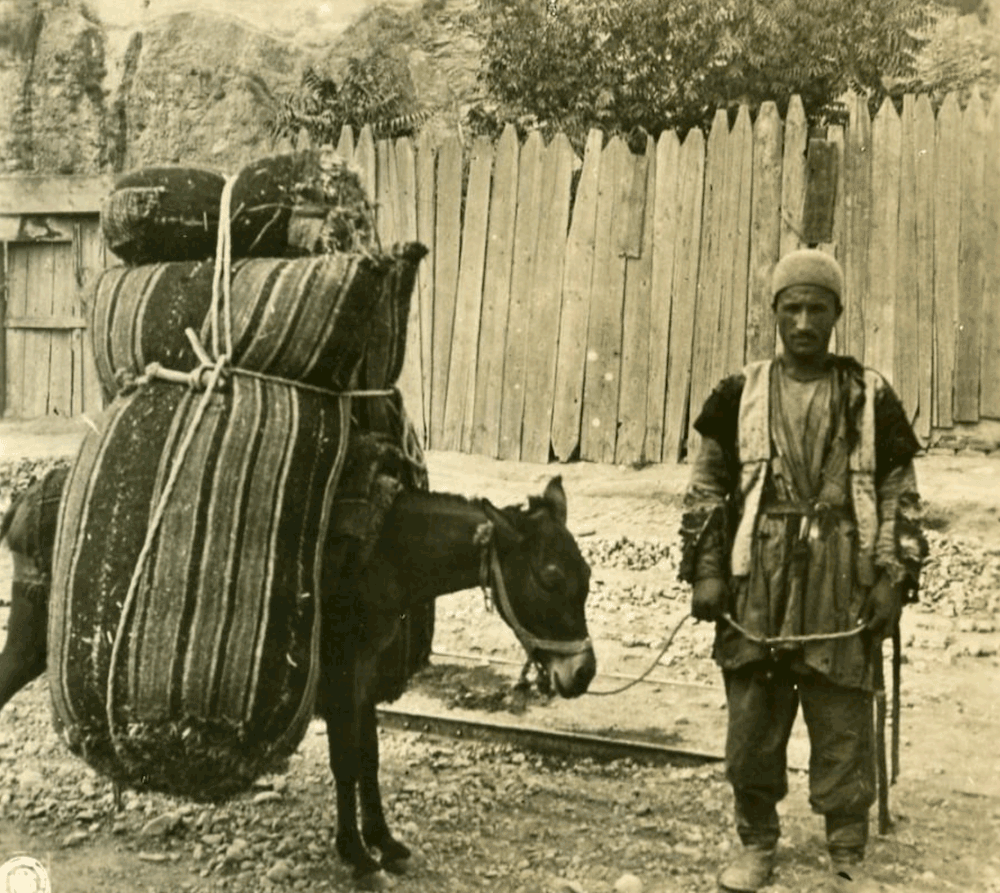
A coal merchant in Tiblisi, Georgia in 1906, thirty years after the story below. This photograph is useful however, in picturing the load of coal that might have been stolen from ‘Abdu'l-Bahá which is pictured here carried by a donkey, rather than a camel, as in the story below. Source: Georgia Past to Present.
The Bahá'ís in 'Akká need fuel, so 'Abdu'l-Bahá, after obtaining permission, buys a camel-load of charcoal, which is then dispatched to 'Akká. The camel driver is stopped by a Christian merchant who admires the quality of the charcoal, better than what he has, and simply takes it, without offering to compensate the Bahá'ís. The theft is reported to 'Abdu'l-Bahá who visits the merchant's shop and stands in the door. Ignored, 'Abdu'l-Bahá enters the shop and sits inside. The merchant continues to pay Him no attention, and 'Abdu'l-Bahá sits in silence for three hours. When all the customers have gone, and ‘Abdu'l-Bahá is now the only person left in the shop, the merchant and the Master finally have a conversation:
The merchant: Are you one of those prisoners here?
'Abdu'l-Bahá assents.
The merchant: What have you done that you are imprisoned?
‘Abdu'l-Bahá answers
'Abdu'l-Bahá: Since you ask me, I will tell you. We have done nothing. We are persecuted as Christ was persecuted
The merchant: What do you know of Christ?
To this question, 'Abdu'l-Bahá responds eloquently, and the merchant perceives that not only does 'Abdu'l-Bahá know of Jesus Christ but is very familiar with the Bible. The merchant starts asking 'Abdu'l-Bahá questions about the Bible and is fascinated with 'Abdu'l-Bahá's explanations, which he has never before encountered. At length, the merchant invites 'Abdu'l-Bahá to sit beside him, and they continue talking for two hours. At the end, very pleased with his afternoon, the merchant confides:
The coal is gone, –I cannot return you that, but here is the money.
The merchant escorts 'Abdu'l=Bahá to the door and down into the street with the greatest of respect. This encounter is the beginning of a deep friendship between the two men and between their two families.
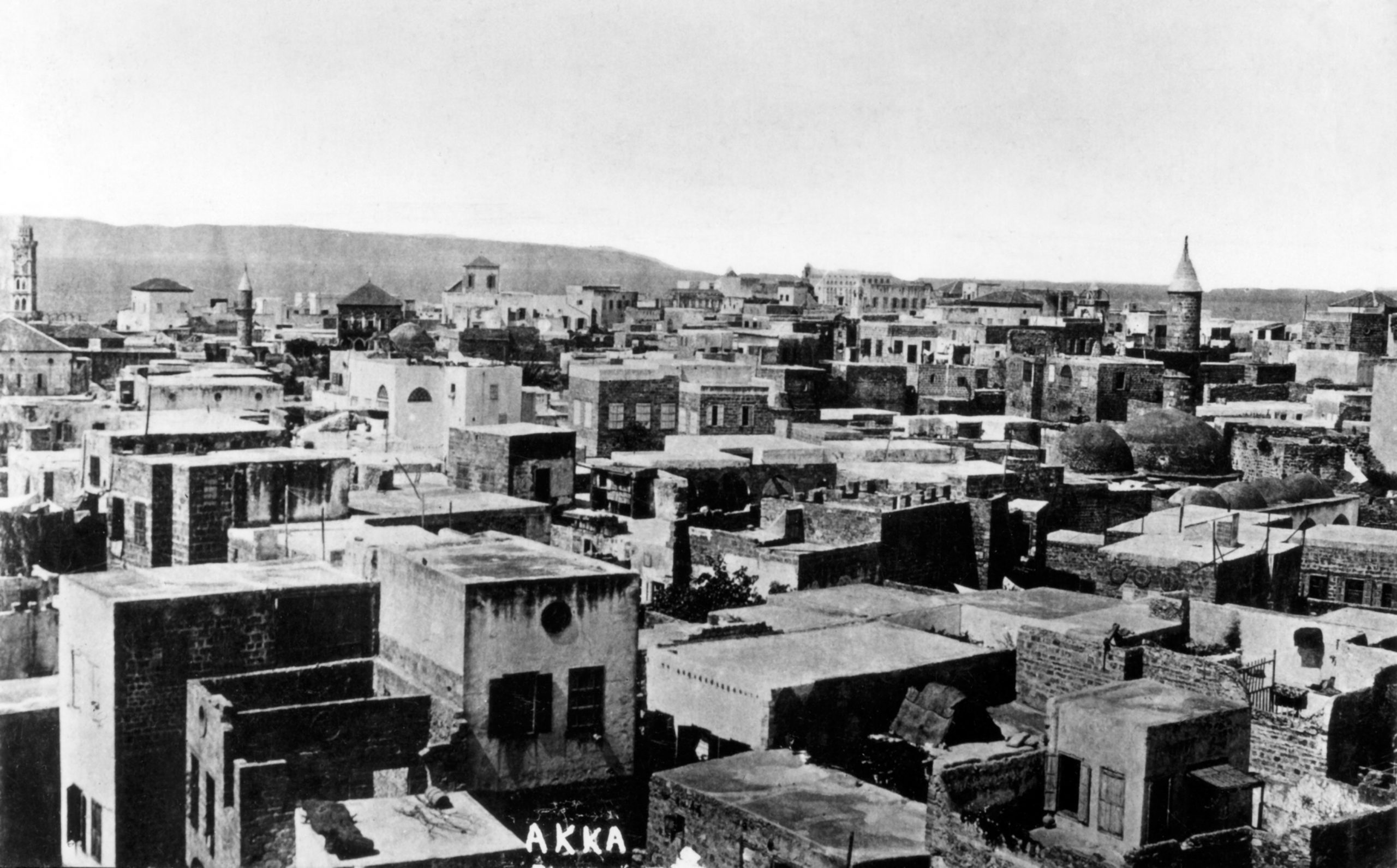
City of ‘Akká, around 1919. Bahá'í Media Bank.
‘Abdu'l-Bahá and the Muftí of 'Akká (Part II)
When Bahá'u'lláh moves out of the barracks and into 'Akká, Shaykh 'Alíy-i-Mírí, the Muftí of 'Akká, regularly visits the visitor's room in the outer apartment of the house and sit at 'Abdu'l-Bahá's feet. He diligently carries out every task he is entrusted with. His devotion to Bahá'u'lláh and 'Abdu'l-Bahá only deepens with time. He becomes so enkindled that one day he confides in 'Abdu'l-Bahá that each time he stands to pray, the majestic figure of Bahá'u'lláh appears before him. 'Abdu'l-Bahá generously showers His attention and favors upon the Muftí, as He does with other notables of 'Akká. It is not a stretch to say that in the mid to late 1870s the Government of 'Akká almost revolves around the person of 'Abdu'l-Bahá. All the officials long to receive His blessings and favours. The fortunes of the Bahá'ís in 'Akká see a complete reversal, from abasement into honor, due entirely to the stainless character, the spiritual qualities, the person of 'Abdu'l-Bahá and the prestige that He carries.
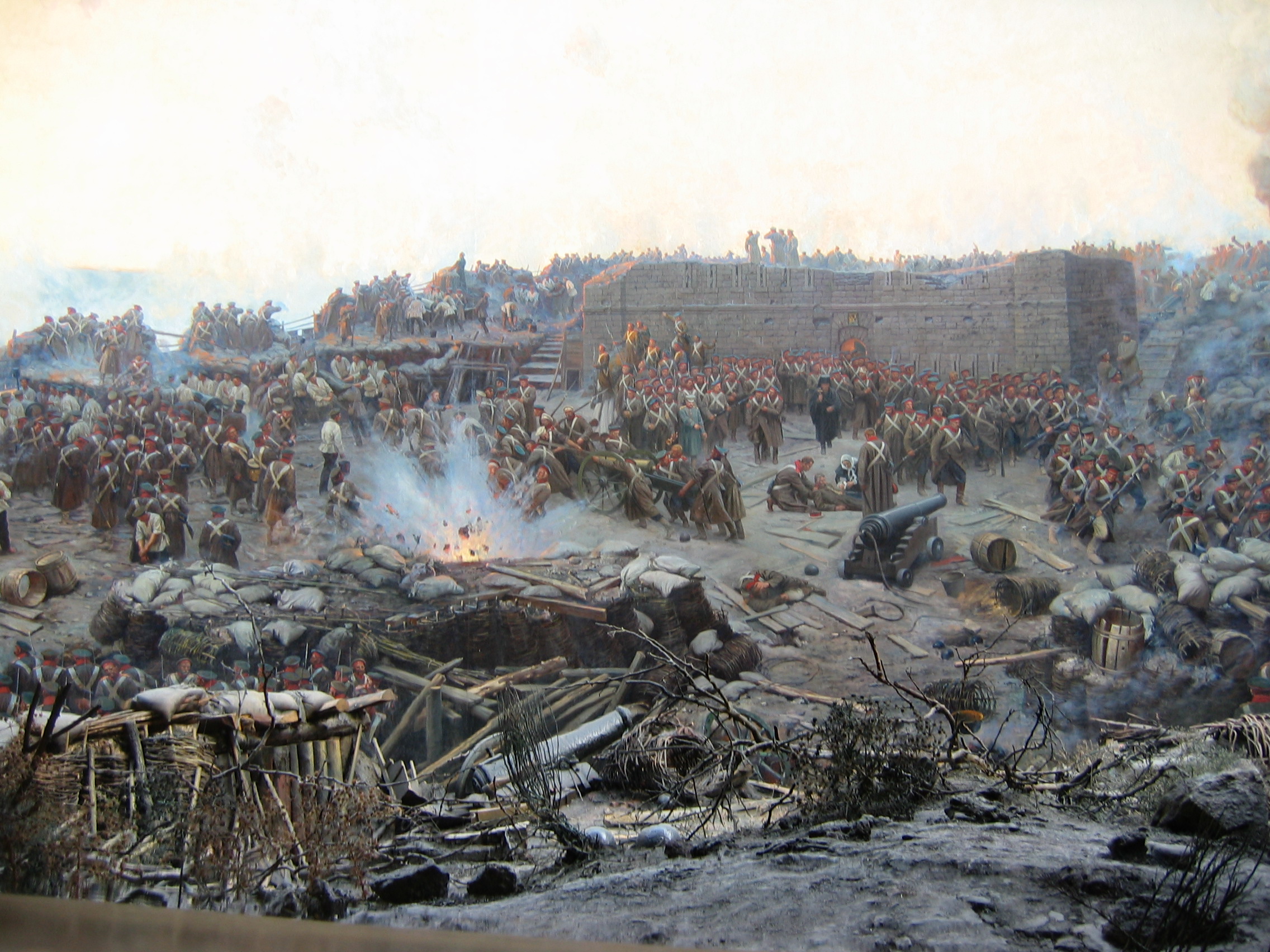
The Siege of Sebastopol (1853-1854) by Franz Roubaud. Wikimedia Commons.
Áqá Muḥammad-Raḥím is a merchant of Iṣfahán. After he becomes a Bahá'í, his family, particularly his father, make his life unbearable and he pioneers to ‘Ishqábád. He finds himself in Astarábád, now Gorgan, Iran, a city about halfway between Ṭihrán and ‘Ishqábád. There, he meets with the Russian consul who asks him questions about the Faith. One night, the consul asks him:
In the Tablet of Bahá'u'lláh addressed to the Czar of Russia, it states. 'We, verily have heard the thing for which thou didst supplicate thy Lord...' What had the Czar requested in his prayer?"
Unsure as to how he should respond, Áqá Muḥammad-Raḥím begins nonetheless to answer:
To me, the rulers of the various nations desire nothing from God except assistance in defeating the enemy and conquering new lands, and inasmuch as the army of Russia had been defeated in the war of Sebastopol, the Czar in his prayers had expressed the wish to overcome the Ottoman Empire.
Once he has replied, Áqá Muḥammad-Raḥím begins to have doubts about his answer. At long last, after arriving in 'Akká, he proceeds to the Khán-i-Avámid, 'Abdu'l-Bahá visits him and enquires about his conversation with the Russian consul. Áqá Muḥammad-Raḥím expresses his concern regarding the answer he gave, but 'Abdu'l-Bahá reassures him with these words:
One day, the Blessed Beauty observed: "At this very moment the Tablet to the Czar of Russia is being read; the consul is asking one of the friends the nature of the request of the Czar, and he receives the correct answer. His name is Áqá Muḥammad-Raḥím Iṣfahání.

Dr Thomas Chaplin intends to visit Baha’u’llah, but instead has a two-hour interview with ‘Abdu’l-Bahá in April 1871. Back in London, he sends a letter to the editor entitled "THE BABS OF PERSIA" printed in The Times, London, October 5, 1871, on page 8. The article, besides the fact Dr. Chaplin calls Bahá'ís "the Babs" throughout, is thoroughly interesting in the view that it affords of the person of 'Abdu'l-Bahá seen by a 19th century Londoner, most particularly because we lack a single photograph of 'Abdu'l-Bahá in adulthood or middle age, and Dr. Chaplin's description is remarkably vivid:
Beheyah Allah himself does not readily concede an interview to strangers, and receives only such as are desirous of obtaining from him instruction in religious truth. We were received by his son, who is apparently about 30 years of age, and has a fine intellectual countenance, with black hair and beard, and that sallow, melancholic look which distinguishes nearly all Persians of the intelligent and religious class. He was dressed in a robe of white flannel, with a cap of the same material, and a small white turban. Over his shoulders was thrown a brown cloth abbái (...) He had a remarkably earnest, almost solemn manner, spoke excellent Arabic fluently, and showed a minute and accurate knowledge of the Old and New Testaments, as well as an acquaintance with the history of religious thought in Europe. Our interview lasted two hours, during the whole of which time an animated conversation was maintained. (...) From all that I could learn, these people lead pure and harmless lives, and hold no political opinions which could render them dangerous.
According to Moojan Momen, this article appears to be the first extended commentary on Bahá'u'lláh in western newspapers. The only Westerner who will publish an account of meeting Bahá’u’lláh is Edward Granville Browne, twenty years later in 1891.
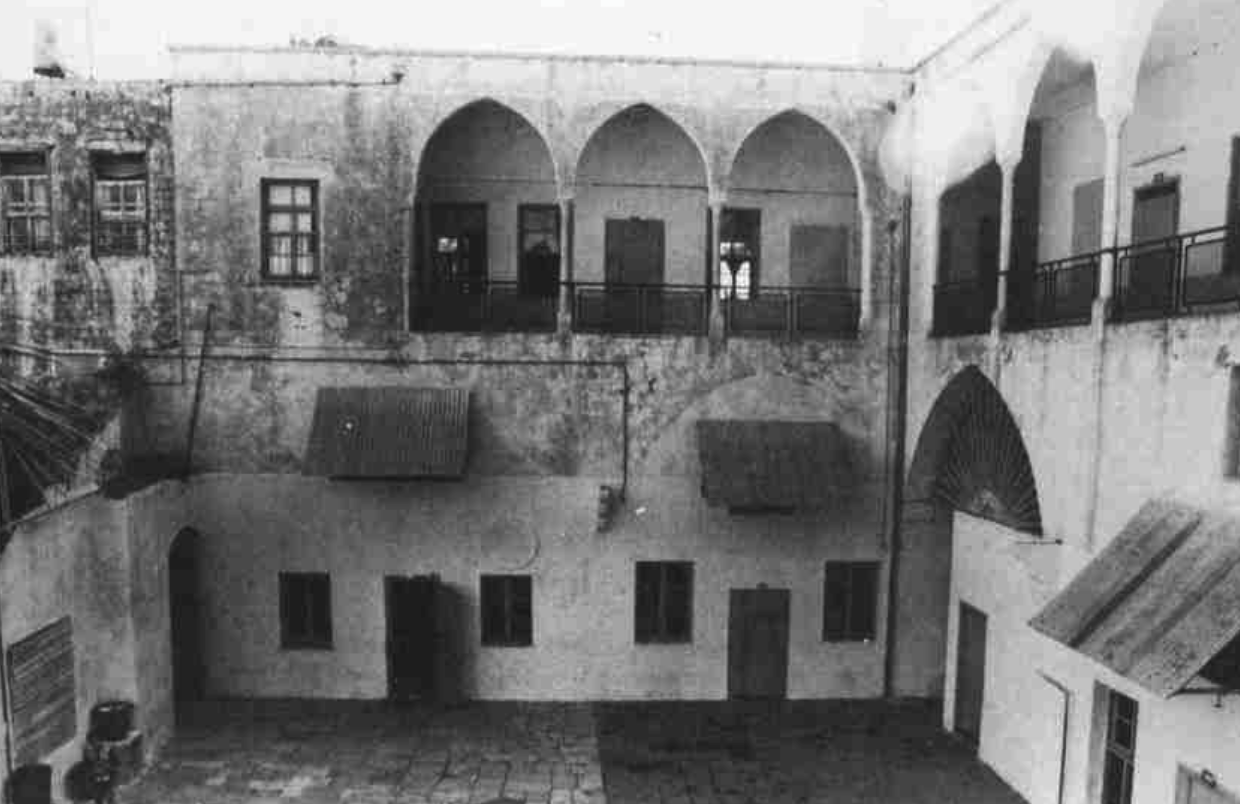
The Governorate in 'Akká, looking across to the room where Bahá'u'lláh was interrogated. Adib Taherzadeh: Revelation of Bahá'u'lláh Volume III
In 1871, Baháʼu’lláh reveals the Fire Tablet.
Revealed in rhyming verse, it is a conversation between Baháʼu’lláh and God about immense trials and tribulations. In an untranslated Tablet shortly thereafter, Bahá’u’lláh clearly prophesies the appearance of a great affliction, described as the ocean of tribulation surging and its billowing waves surrounding the Ark of the Cause of God.
One year later, the prophecies are realized.
Late in the afternoon of January 22, 1872, seven misguided followers of Bahá’u’lláh decide to rid 'Akká of the scheming of the Covenant-breakers by committing murder. They shoot three Covenant-breakers, living in a house across from the Governorate's office, and the sound of the gunshots, combined with the yelling and shouting, draws Ṣáliḥ Páshá, the Governor out of his house. Pandemonium ensues: the population, young and old, notables and workers, Ṣáliḥ Páshá, the Chief of Police and the troops set out towards the house of Bahá'u'lláh with sticks and stones, rifles and swords.
Bahá'u'lláh is absorbed in Revelation when the crowd has assembled outside the house. An hour after sunset, an army officer enters the house and requests Bahá'u'lláh, 'Abdu'l-Bahá and three other Bahá'ís to accompany him to the Governorate (click for map). ‘Abdu’l-Bahá goes to present the request to Bahá'u'lláh, who leaves the house led by a man carrying a lantern. Bahá'u'lláh's indignation knows no bounds, and He will later reveal Tablets testifying to the depths of His emotions regarding this event.
At the Governorate, Bahá'u'lláh takes a seat at the front of the room. Asked if He believes it is meet for His men to commit such a heinous crime, Bahá'u'lláh replies:
Should a soldier under your command break a rule, would you be held responsible and punished for it?
Quoted in Adib Taherzadeh, Revelation of Bahá'u'lláh, Volume III, Page 327
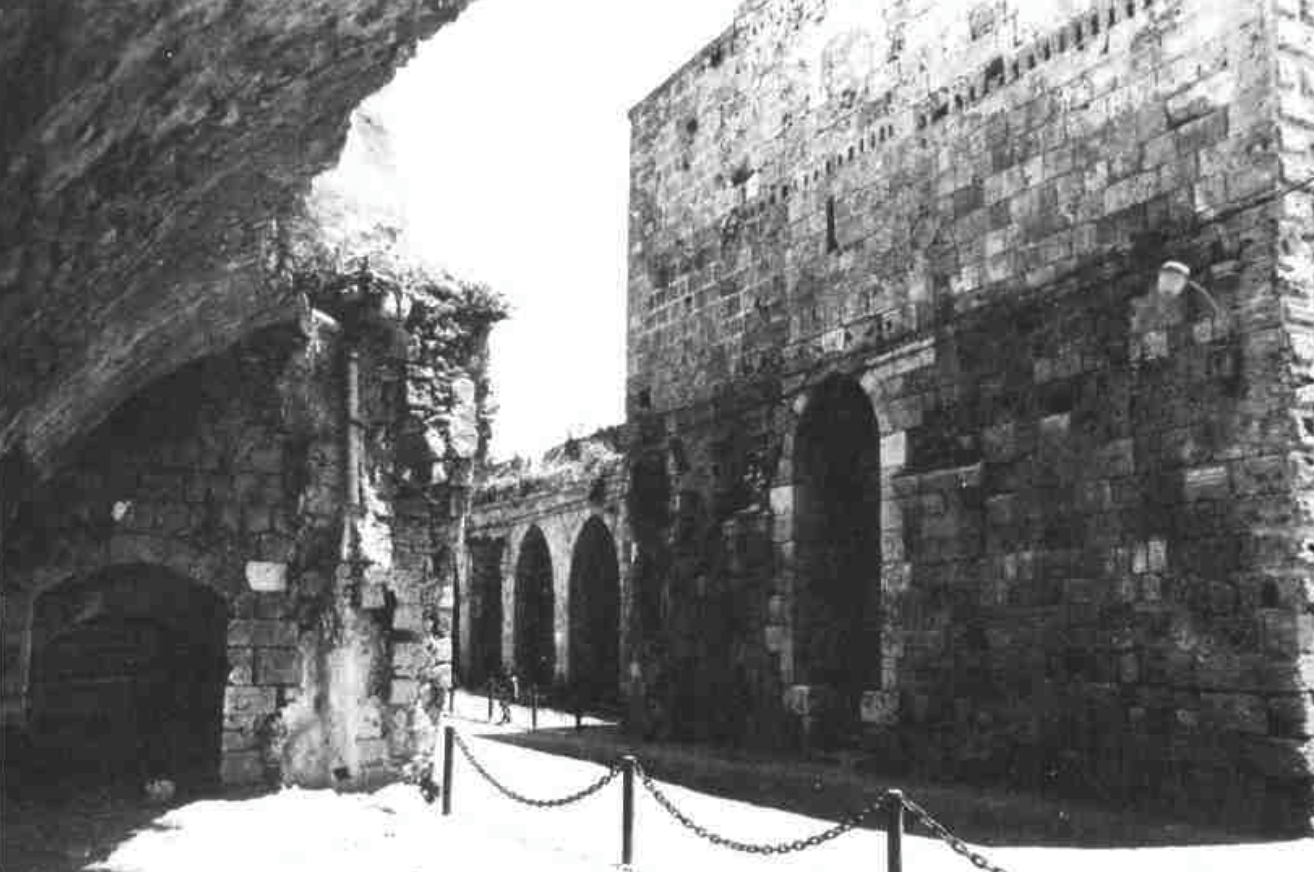
The Khán-i-Khávirdí, the caravanserai in 'Akká where Bahá'u'lláh was kept in custody for one night during the interrogation, it is adjacent to the Límán, where 'Abdu'l-Bahá was taken. Adib Taherzadeh: Revelation of Bahá'u'lláh Volume III
Four hours after sunset on 22 January 1872, at around 9:00 P.M., Bahá'u'lláh and His son Mírzá Muḥammád-‘Alí are moved to a room above the Khán-i-Shávirdí (click for map). The eastern wing of the Khán-i-Shávirdí is adjacent to the prison (Limán), where 'Abdu'l-Bahá is taken and shackled. The next day, Bahá'u'lláh is transferred to better in the same neighborhood for two more nights under arrest.
Abdu'l-Bahá, however, is led to the Límán (the prison) (click for map) and put in chains for the first night. Officials come to the Limán demanding keys from 'Abdu'l-Bahá as they intend to search the house of ‘Údí Khammár for weapons. 'Abdu'l-Bahá insists on coming with them, as the ladies of the Holy Family, Navváb and the Greatest Holy Leaf are alone in the house. The officials agree and take 'Abdu'l-Bahá, shackled in chains, through the streets of 'Akká.
The prison where 'Abdu'l-Bahá is held is in the north-eastern corner of 'Akká and the house of ‘Údí Khammár is in the south-western side of the city. They make 'Abdu'l-Bahá walk across 'Akká with chains around His neck and feet, approximately 500 meters each way, meaning He will walk close to a kilometer manacled. When they reach the house, 'Abdu'l-Bahá gathers His 'abá around Him to try and hide the chains from His mother, but of course, Navváb sees them and weeps bitterly.
The next day, 'Abdu'l-Bahá is permitted to join Bahá'u'lláh. Twenty-five Bahá'ís are shackled and imprisoned elsewhere in the city. Ṣáliḥ Páshá, who has cabled all the events to Ṣubḥí Páshá, the Válí of Syria, is reprimanded for the way he has treated Bahá'u'lláh. Freed in person by Ṣáliḥ Páshá on the afternoon of January 25, 1872, Bahá'u'lláh, who has now contracted a slight fever, He states that the authorities especially Ṣáliḥ Páshá, have not acted according to the edicts of God. As Bahá'u'lláh rises to return home, the men stand up and humbly apologize.
The seven perpetrators remain in prison in the Límán for seven years. The other Bahá'ís are imprisoned for the next six months and will be released by another, more just, Governor of 'Akká. The Holy Family's next door neighbor, Ilyás 'Abbúd (who will later sell them his house) is so terrified he barricades his home against any access from the House of 'Udí Khammár.
It is about this event Bahá’u’lláh speaks so powerfully:
My captivity, cannot harm Me. That which can harm Me is the conduct of those who love Me, who claim to be related to Me, and yet perpetrate what causeth my heart and My pen to groan...My captivity can bring on Me no shame. Nay, by My life, it conferreth on Me glory. That which can make Me ashamed is the conduct of such of My followers as profess to love Me, yet in fact follow the Evil One.
Bahá'u'lláh - Untranslated Tablet quoted in God Passes By by Shoghi Effendi

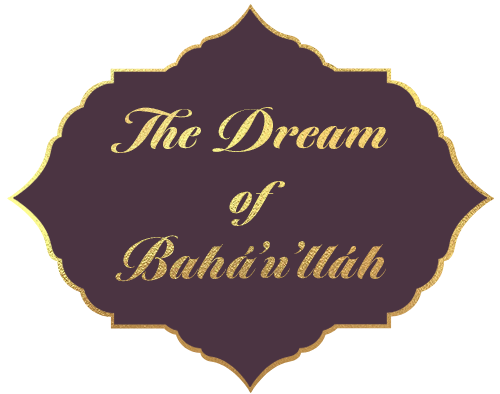
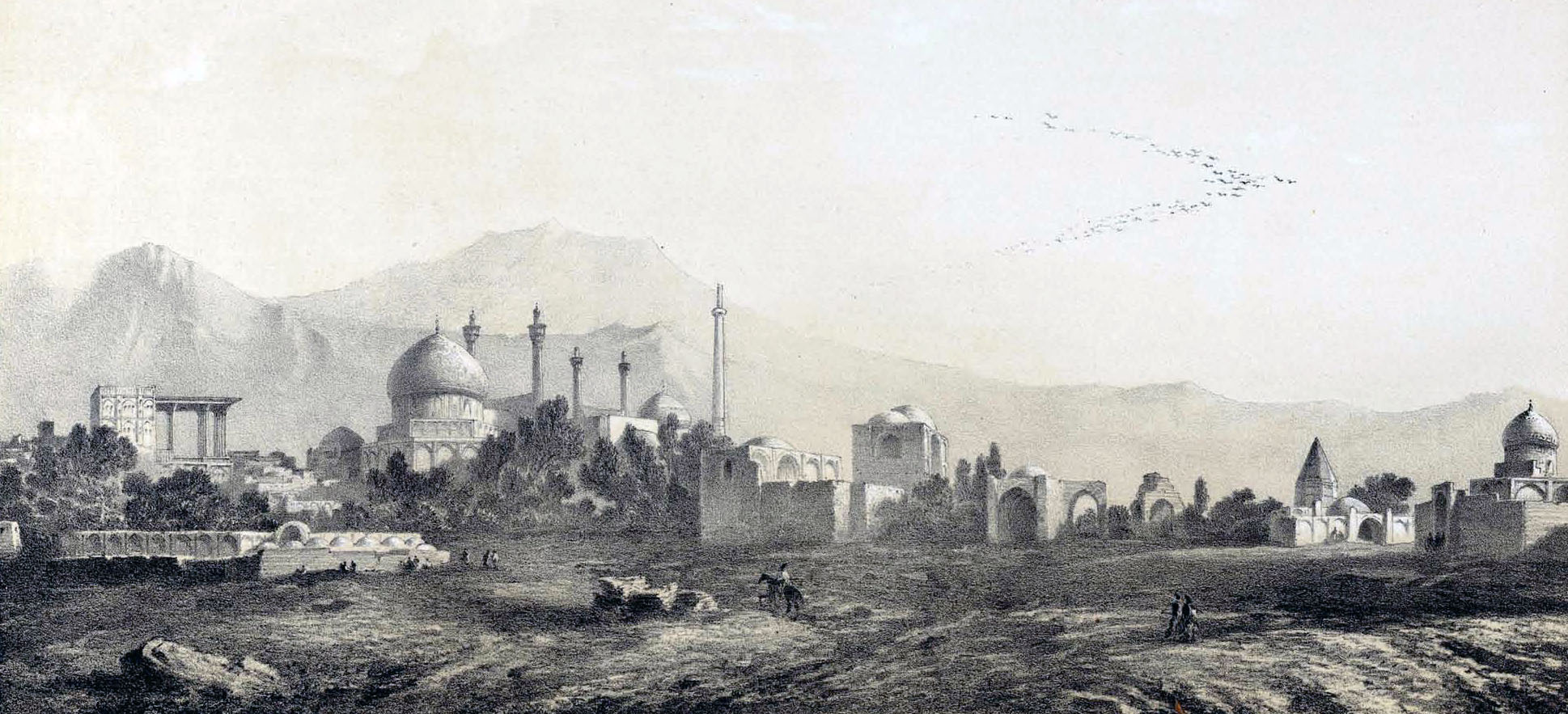
Engraving of Isfahán in 1851, just four years after Munírih Khánum is born there in 1847. This is where Munírih Khánum lives the first twenty-five years of her life before she leaves for 'Akká and her new life 1871/1872. Eugène Flandin - Voyage en Perse, avec Flandin, éd. Gide et Baudry. Wikimedia Commons.
Around 1870/1871, the future wife of 'Abdu'l-Bahá, Fáṭimih Khánum, just 25 years old and born into one of the first Bábí families of the city, is living a life of quiet contemplation and prayer in Iṣfahán. Áqá Siyyid Mihdí is visiting Iṣfahán at the request of Bahá'u'lláh, to promulgate the teachings of the Faith. At a gathering of believers one evening, the aunt of Fáṭimih Khánum asks if he has heard anything about a bride for the saintly, handsome 29-year old 'Abdu'l-Bahá. In response, Áqá Siyyid Mihdí retells a dream Bahá'u'lláh recounted for him in 'Akká as He was pacing in the outer rooms of the house:
Áqá Siyyid Mihdí, last night I had a strange dream. I dreamt that the face of the beautiful girl in Tehran, whose hand in marriage we have asked from our brother Mirza Ḥasan for the Most Great Branch, gradually became darkened and indistinct. At the same time, another girl appeared with a luminous face and a luminous heart. I have chosen her for the Most Great Branch.
Munírih Khánum, Memoirs and Letters, pp. 24-5
Now, Fáṭimih Khánum's aunt, who poses this question to Áqá Siyyid Mihdí is an illustrious Bábí, eloquent and ardent. Her name is Khurshíd Begum, but she is better known under the title of Shamsu’ḍ-Ḍuḥá, ("the Morning Sun"). She is the mother-in-law to Mírzá Muḥammad-Ḥasan, better known as Sulṭánu’sh-Shuhadá, ( "The King of Martyrs"), who married her daughter, and was the companion of Ṭáhirih during her sojourn in Iráq. In fact, Shamsu’ḍ-Ḍuḥá is so illustrious that 'Abdu'l-Bahá will immortalize her life by dedicating a chapter to her in Memorials of the Faithful.
When Shamsu’ḍ-Ḍuḥá hears this dream of Bahá'u'lláh, there is no doubt in her mind that the girl with the luminous face and luminous heart is her own niece. She returns home and tells Fáṭimih Khánum:
I swear by the one true God, at the very moment when Áqá Siyyid Mihdí told this story, I felt that - without a shadow of a doubt - you are that girl! You will see!
Munírih Khánum, Memoirs and Letters, pp. 24-5
Her aunt's statement distresses Fáṭimih Khánum greatly. She dismisses the idea vehemently and tearfully replies to Shamsu’ḍ-Ḍuḥá:
May God forgive me! How can I be worthy? I beg you not to say this again and not to mention it to anyone.
Munírih Khánum, Memoirs and Letters, pp. 24-5

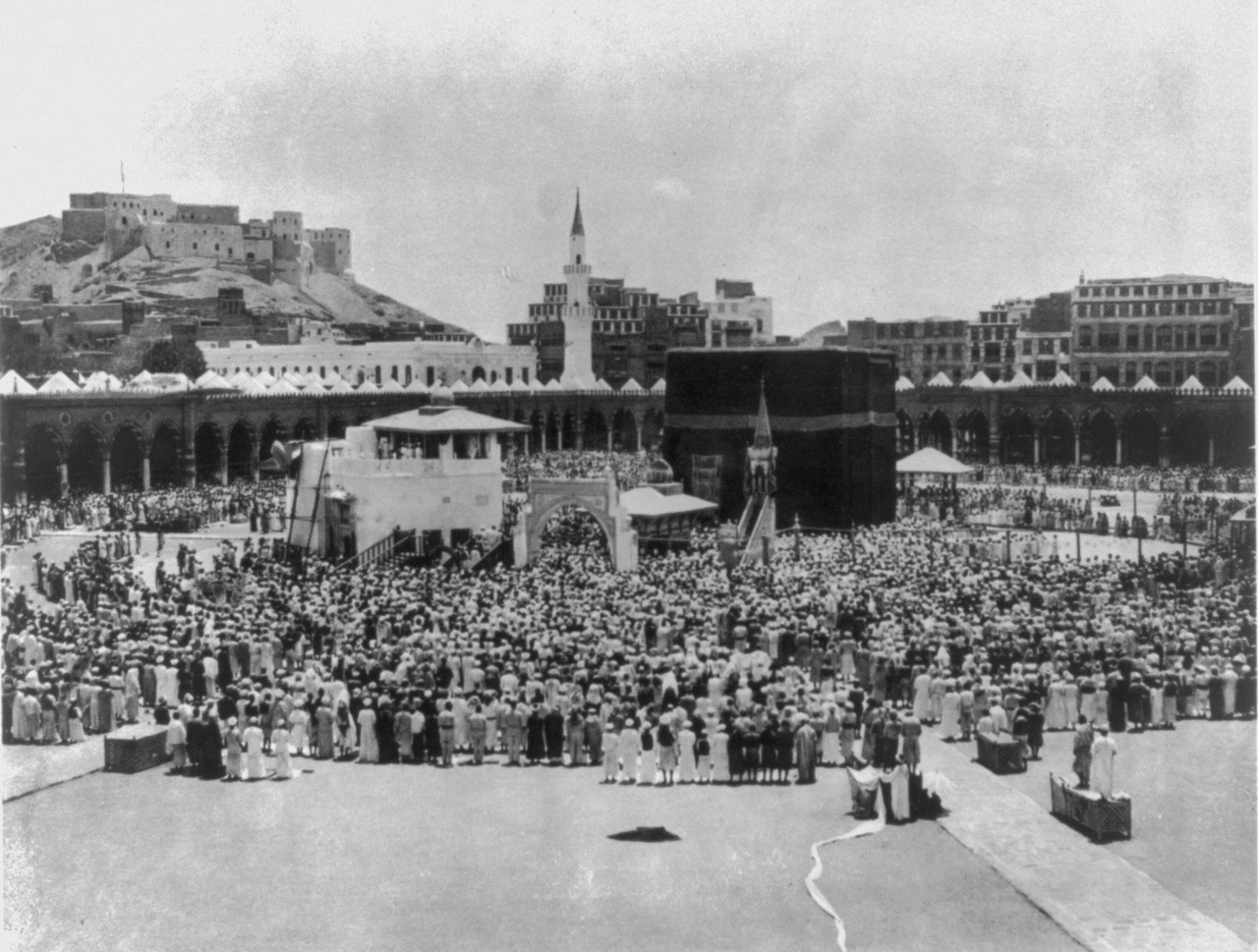
Pilgrimage in Mecca circa 1889: this is a view of the mosque, next to the Holy Kabba, while congregational prayer (Salat) is being held. This picture was taken approximately 18 years after Munírih Khánum performed pilgrimage in Mecca at the instruction of Bahá'u'lláh on her way to 'Akká. Photography by ʻAbd al-Ghaffār, al-Sayyid, Physician of Mecca. Wikimedia Commons.
Shortly thereafter, Bahá'u'lláh's trusted courier, Shaykh Salmán arrives in Iṣfahán with a peculiar mission: he is to take Fáṭimih Khánum and her brother to pilgrimage in 'Akká at the request of Bahá'u'lláh.
Each step of the journey has been specified by Bahá'u'lláh, and instructions will await them in each city they reach. They leave Iṣfahán for Búshihr, then sail to Jeddah, from there to Mecca, where they perform the rites of pilgrimage, and back to Jeddah, where they sail for Alexandria with instructions to proceed directly to 'Akká.
When they finally arrive in 'Akká, in the dead of night, 'Abdu'l-Bahá has been sent by Bahá'u'lláh to ensure her safe arrival from the quay but she does not find this out until after her marriage when the Greatest Holy Leaf shares it with her. The morning after her arrival, the women of the Holy Family bring Fáṭimih Khánum into the presence of Bahá'u'lláh. Baha'u'llah's first words to her are:
We have received you into this prison at a time when the prison door is closed to all the believers, so that the power of God may become clear and evident to all.

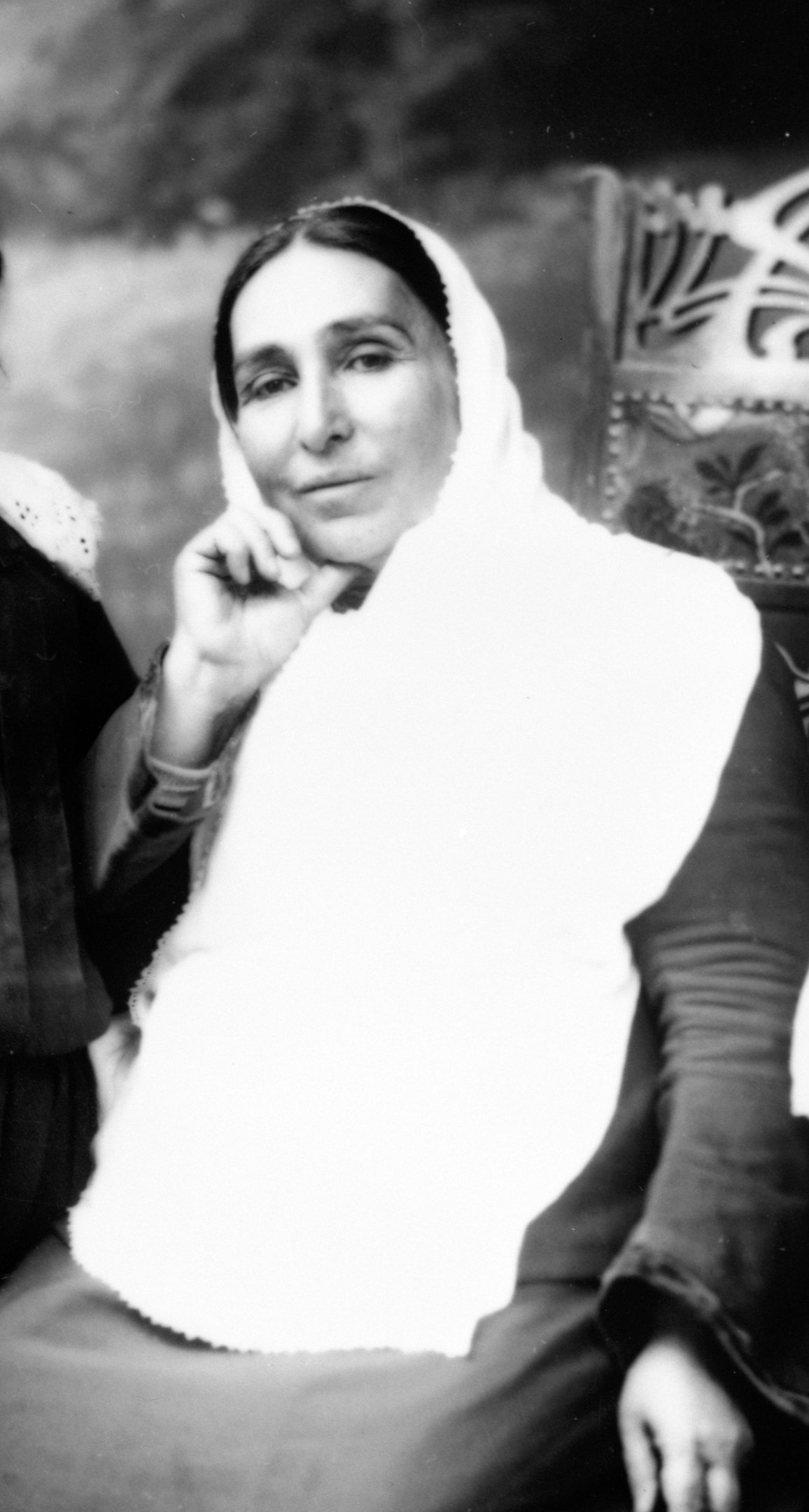
Portrait of Munirih Khánum, wife of ‘Abdu’l-Bahá for fifty years pictured here in the 1870s, therefore a few years after her marriage. Bahá'í Media Bank.
Fáṭimih Khánum lives in the house of Mírzá Músá for for five months while preparations are being made for her marriage to 'Abdu'l-Bahá. There is an issue of space for the young couple that must be resolved before the wedding takes place. During this time Fáṭimih Khánum has the honour of attaining Bahá'u'lláh's presence several times. She also receives kind messages from Bahá'u'lláh through Mírzá Músá, and sometimes a gift. One day Mírzá Músá returns from his visit to Bahá'u'lláh with something extraordinary. he tells Fáṭimih Khánum
I have brought you a wonderful gift. You have been renamed Munírih (Luminous) by [Bahá'u'lláh].
Munírih Khánum immediately remembers the girl from Bahá'u'lláh's dream whom her aunt was convinced was her.
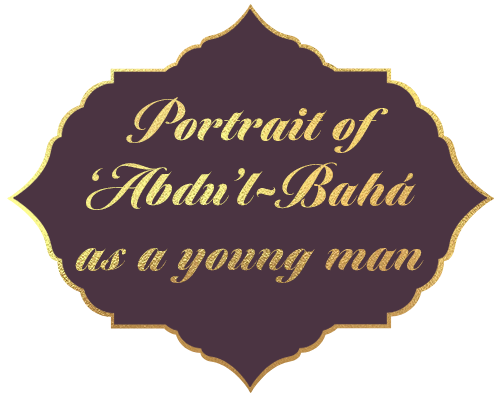
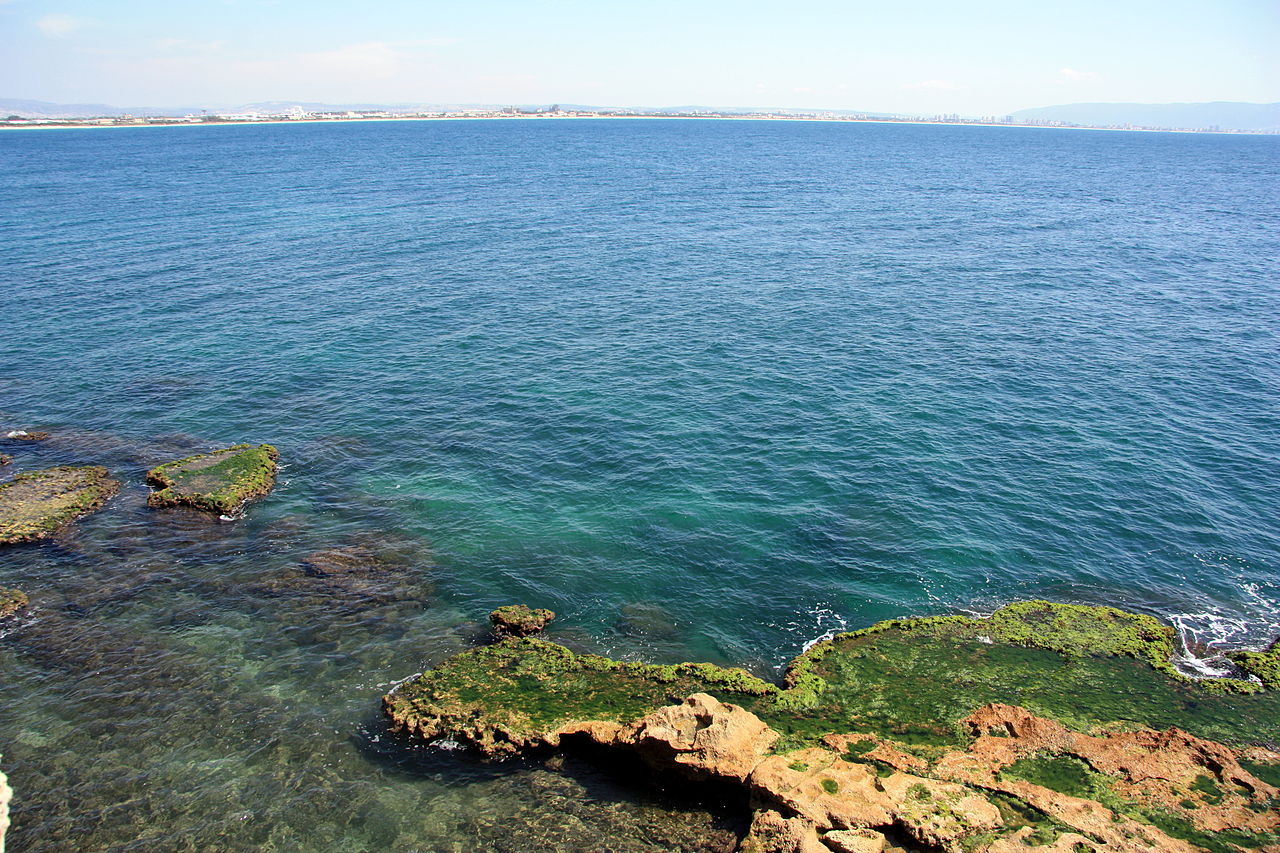
Modern view of the Mediterranean Sea, where 'Abdu'l-Bahá regularly swam, from the city of 'Akká. State of Israel. Wikimedia Commons.
During her stay in Mírzá Músá’s home, Munírih Khánum often stands at the window and watches ‘Abdu’l-Bahá, a “strong and graceful swimmer,” swim in the Mediterranean. In her recollections to Lady Blomfield, Munírih Khánum brushes a delightful portrait of 'Abdu'l-Bahá as a young man:
You have known Him in His later years, but then, in the youth of His beauty and manly vigour, with His unfailing love, His kindness, His cheerfulness, His sense of humour, His untiring consideration for everybody, He was marvellous, without equal, surely in all the earth!
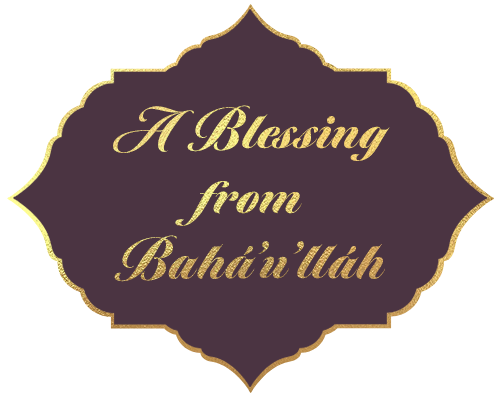
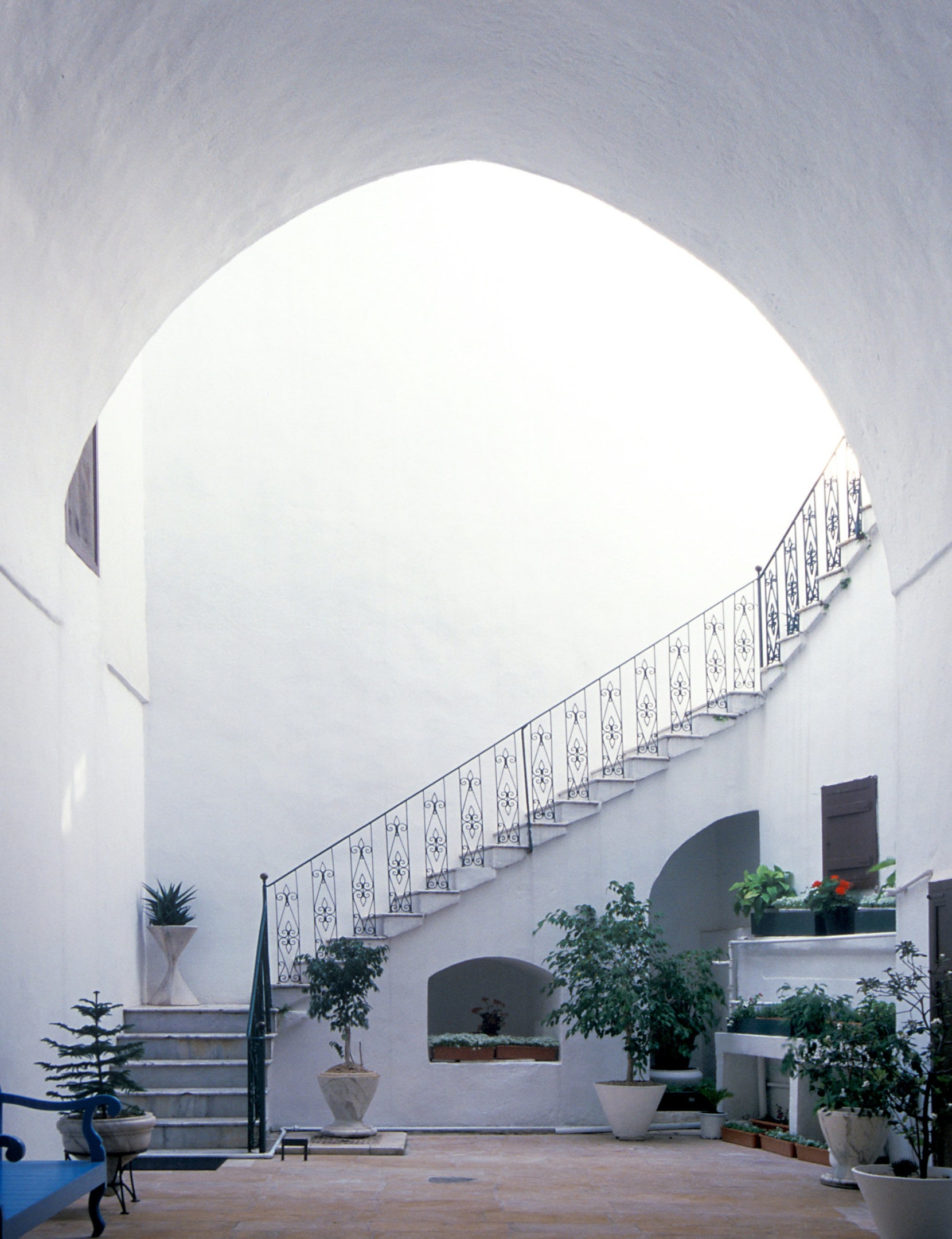
The courtyard of the house of ‘Abbúd, where Ilyás ‘Abbúd still lived at the time of the wedding of 'Abdu'l-Bahá and Munírih Khánum. This staircase leads to the upper floor, where Ilyás ‘Abbúd had a room furnished, and the wall broken down to open into the house of ‘Údí Khammár, as his wedding gift for 'Abdu'l-Bahá, offered to Bahá'u'lláh. Source: Bahá'í Media Bank.
Ilyás 'Abbúd, the owner of the two houses, starts to inquire as to what is delaying the wedding. He does not get an answer to his question, but on his own realizes that the young couple does not have a place to live. He immediately opens up a room in his own house, breaking down a wall to connect with the quarters of the Holy Family and has it beautifully decorated. He then presents this room as a gift to Bahá'u'lláh saying:
I have had this room prepared for the Master.
Bahá'u'lláh accepts Ilyás 'Abbúd's gift and the wedding is performed that day, three hours after sunset (around 20:00 or 8:00 P.M.) on 8 March 1873, and Bahá'u'lláh offers a blessing to Munírih Khánum:
You have come! You are welcome! O My Leaf and My handmaiden! Verily, we chose thee and accept thee to serve my Most Great Branch, and this is by my grace, which is not equaled by all the treasures of earth and heaven ... How many were the girls in Baghdad and Adrianople, and in this Most Great Prison who hoped to attain to this bounty, and whose hopes were not fulfilled. You must be thankful for this most great bestowal and great favour.

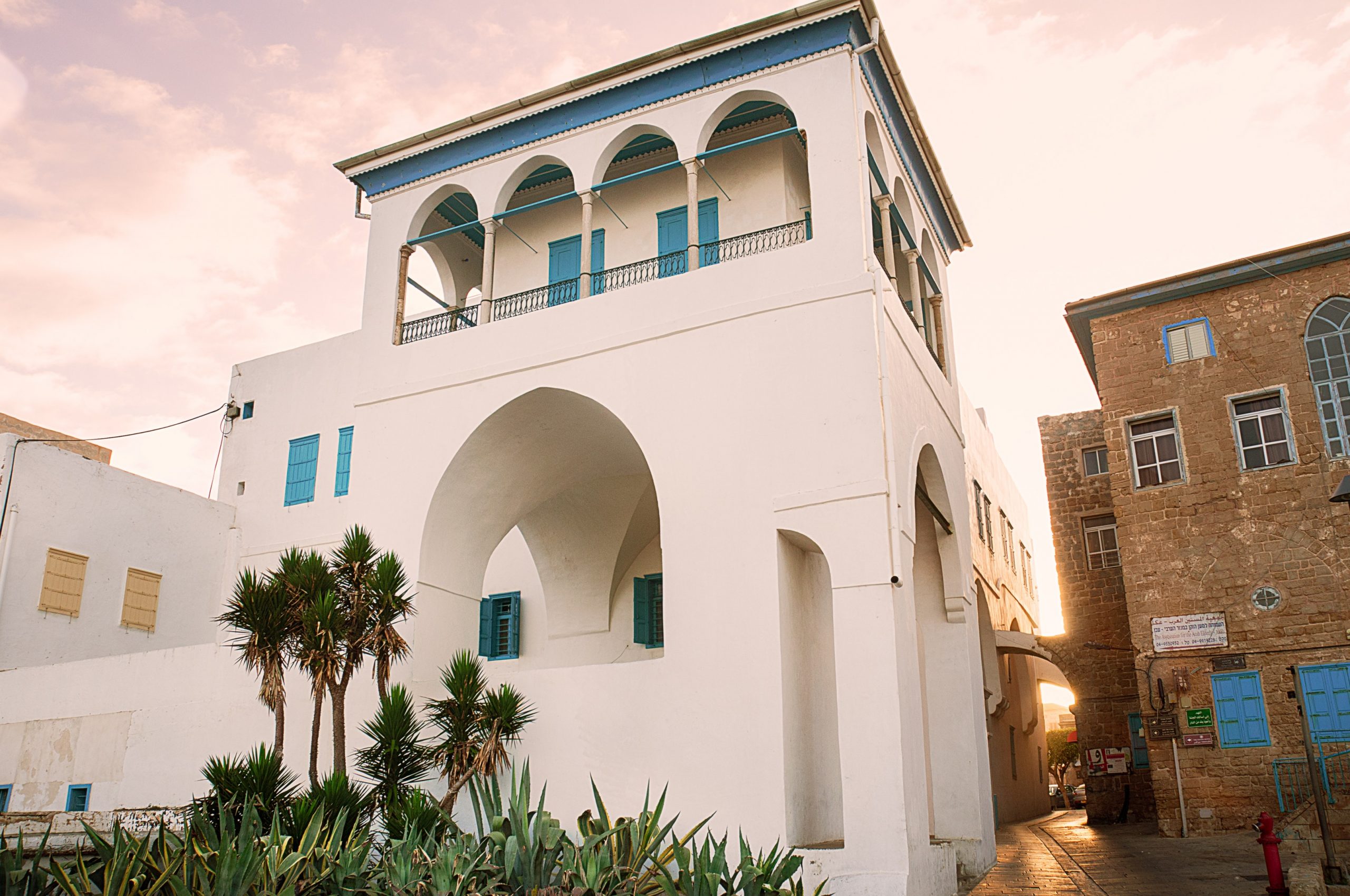
Modern view of the renovated house of 'Abbúd, where 'Abdu'l-Bahá and Munírih Khánum were married. Bahá'í Media Bank.
The Greatest Holy Leaf gives Munírih Khánum a white dress to wear, there are only seven guests (all family and the wife and daughters of Ilyás 'Abbúd, and no cake but tea to drink. Munírih Khánum composed a poem about her wedding:
The seventh night of the fasting month became the date of this delight.
Rise up to your feet, O Friends, for the most great dawn has arrived.
Poem by Munírih Khánum about her wedding in Maghzí, Farvardin-námih, p. 145.
Speaking to Lady Blomfield, Munírih Khánum brushes a portrait of her wedding and her marriage:
Oh the spiritual happiness which enfolded us! It cannot be described in earthly words. The chanting ended, the guests left us. I was the wife of my Beloved. How wonderful and noble He was in His beauty. I adored Him. I recognized His greatness, and thanked God for bringing me to Him. It is impossible to put into words the delight of being with the Master; I seemed to be in a glorious realm of sacred happiness whilst in His company.
Lady Blomfield, Chosen Highway
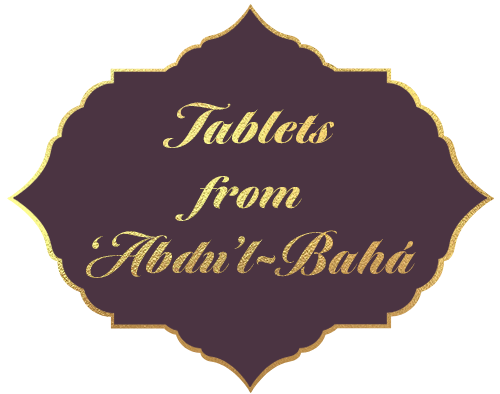
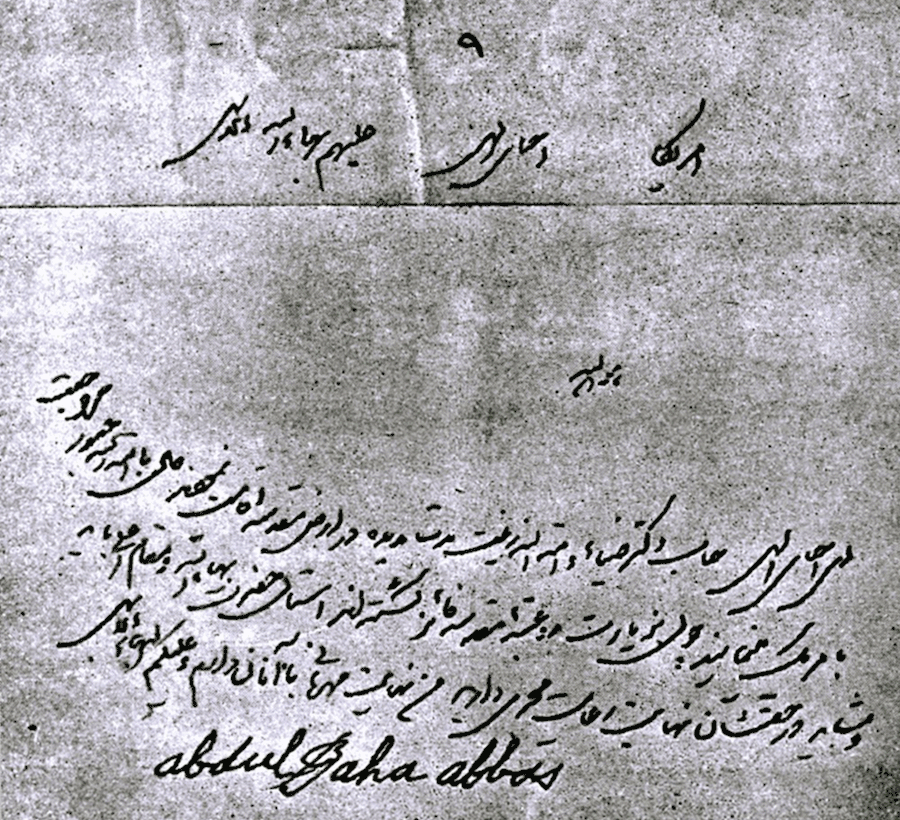
This Tablet was not written to Munírih Khánum, but it is a Tablet in ‘Abdu'l-Bahá's own handwriting and it as addressed to a Bahá'í Family, that of Zia Baghdadi, and was written around 1920. Source: Baha'i Sacred Relics.
Munírih Khánum will lose five children to the poisonous climate of 'Akká causing her immense heartbreak. Bahá'u'lláh will address several Tablets to her and in some, He offers her comfort for her loss and speaks in detail about her children in the Abhá Kingdom. Excerpts of some of 'Abdu'l-Bahá's letters to Munírih Khánum are available in the extraordinary book Leaves of the Twin Divine Trees by Baharieh Rouhani Ma'ani. In these excerpts, you see 'Abdu'l-Bahá as a brother, a doting father, a empathic son, worried about His father, a kind and respectful husband. His letters are filled with concern for others, inquiries about various members of His family, expressions of love and devotion for His Father, His sister, His children, His wife. Here are two excerpts:
Baharieh Rouhani Ma'ani estimates this Tablet, in response to a letter received while He was in Haifa, was written before 1886 (date at which Navváb passed away) because 'Abdu'l-Bahá mentions His mother:
He is God! O Handmaid of God!..All that was written hath become known and been understood. Praised be God, through the bounty and grace of the Beloved of the world, physical wellness is attained in every respect. The weather in Haifa is not bad and there is no trouble except that the Muftí is bothersome. However, he is leaving today or tomorrow.
On behalf of this Servant, make the dust beneath the Blessed Feet the kohl of the true sight.
Convey My utmost eagerness to Her Highness, the Mother, and Her Highness, the Sister, and write in detail about the children.
Baharieh Rouhani Ma'ani, Leaves of the Twin Divine Trees, page 326
The following Tablet, was written between 1886 and 1892, according to Baharieh Rouhani, while 'Abdu'l-Bahá was away from home in Beirut or elsewhere. He is responding to a letter from Munírih Khánum and expressing His concern that the heat in 'Akká will be too uncomfortable for Bahá'u'lláh should he leave Bahjí to visit the house of 'Abbud:
He is God! Thy perspicuous letter hath arrived. Whatsoever thou didst write hath become known and all that was concealed in the innermost parts of the sentences became manifest. The return of the Blessed Countenance caused utmost anxiety and concern. What will happen to His Blessed Body during the intense heat in that narrow house? Undoubtedly, He would be very much affected by it. Were it during the winter, it would have been easier. But in the summer, in an inadequate place and in the Most Great Prison! I swear by the Ancient Beauty that if tears of blood were shed and hearts were consumed, it would not suffice. And this is all from the greatness of His ancient endurance. Regarding my noble sister, I long for her presence with all My soul, My heart, My spirit and Mine inner being. Day and night she is remembered in Mine inmost thoughts and feelings. I can say nothing concerning My separation from her, for whatever I write my tears will certainly wash it away.
Ḍiyá Khánum, Rúḥá, and Ṭúbá and all members of the Household, and the family of Sulṭanu'sh-Shuhadá and the members of that household as well as other handmaids of God are all in My thoughts and I am engaged in remembering them. Be certain and never doubt it...
Since I have written in detail to Khádim regarding My return, I did not repeat the same in this letter.
Take Ḥusayn Effendi to the Holy Court and let him, on My behalf, prostrate himself at the Blessed Threshold...
My physical health, praised be God, is good.
Baharieh Rouhani Ma'ani, Leaves of the Twin Divine Trees, page 326-327
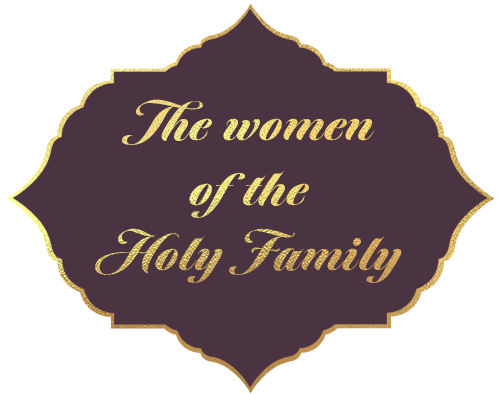
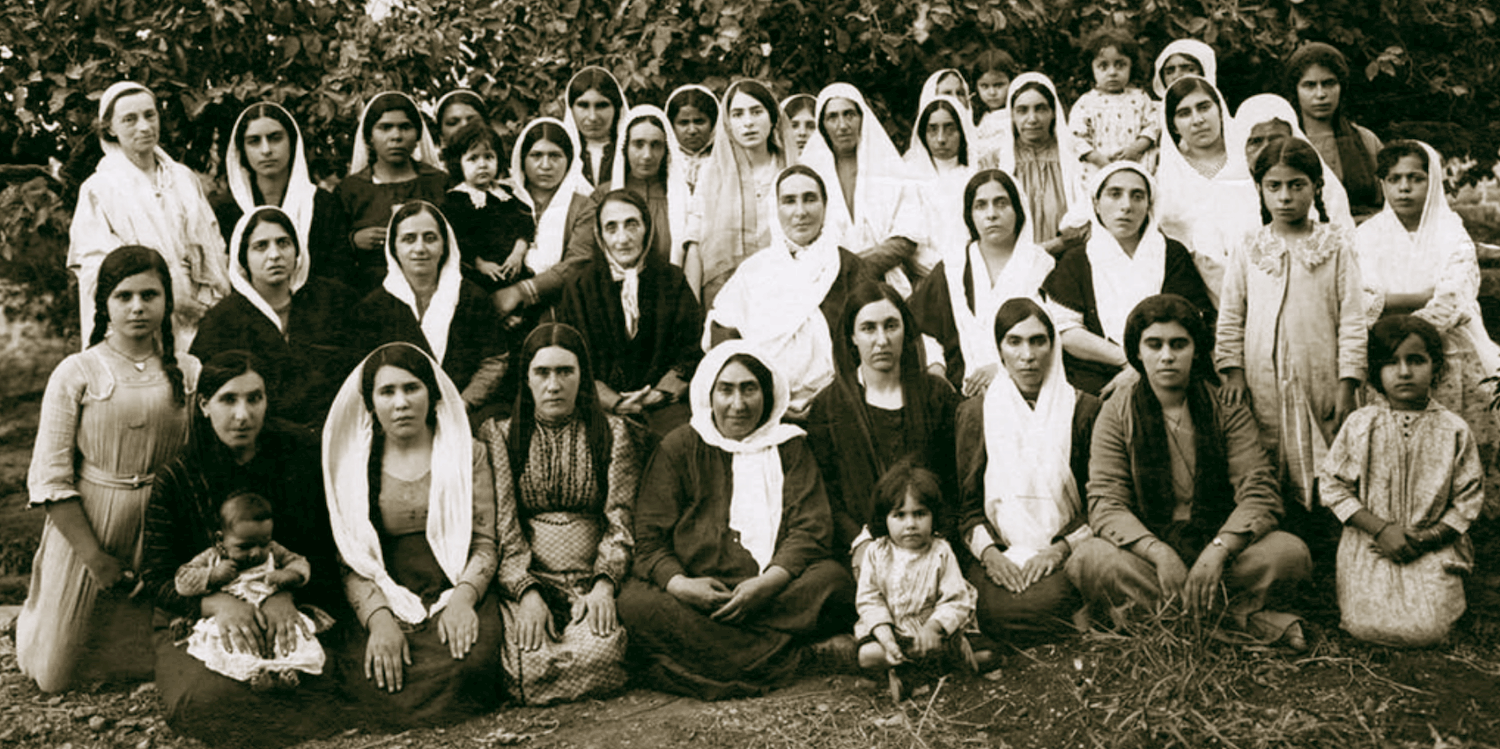
The Women of the Holy Family, details below. Daily Baha'i Photos Website.
In the photograph are the women of the Holy Family: 'Abdu'l-Bahá's sister, Bahíyyih Khánum, the Greatest Holy Leaf, two years younger than the Master and born in 1846, ‘Abdu'l-Bahá's wife for half a century, Munírih Khánum, three years younger than her Husband, born in 1847, and 'Abdu'l-Bahá's four surviving children of the nine He had with Munírih Khánum, four daughters, in order from eldest to youngest: Ḍíyá‘íyyih Khánum, Ṭúbá Khánum, Rúḥá Khánum and Munavvar Khánum. The women of the Holy Family are all seated in the middle row, on chairs, and the rest of the women in the picture are pilgrims or resident believers in the Holy Land.
From left to right, seated in the middle row:
❈ Munavvar Khánum (‘Abdu'l-Bahá and Munírih Khánum's fourth daughter);
❈ Ṭúbá Khánum (‘Abdu'l-Bahá and Munírih Khánum's second daughter);
❈ Bahíyyih Khánum, the Greatest Holy Leaf and Sister of 'Abdu'l-Bahá;
❈ Munírih Khánum, wife of 'Abdu'l-Bahá;
❈ Ḍíyá‘íyyih Khánum (‘Abdu'l-Bahá and Munírih Khánum's first daughter and the mother of Shoghi Effendi);
❈ Rúḥá Khánum, (‘Abdu'l-Bahá and Munírih Khánum's third daughter)
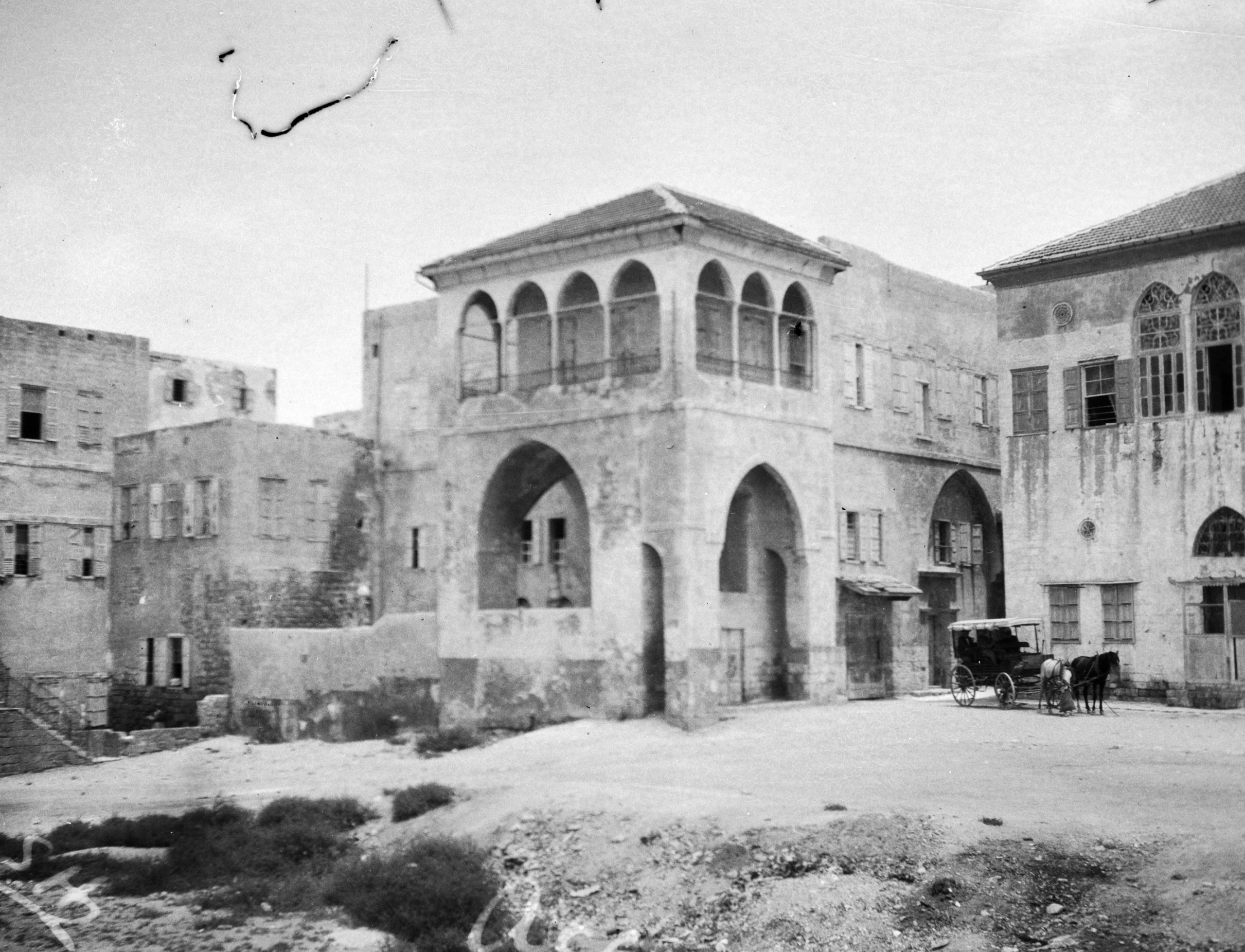
The House of ‘Abbúd in the 1920s. Bahá'í Media Bank.
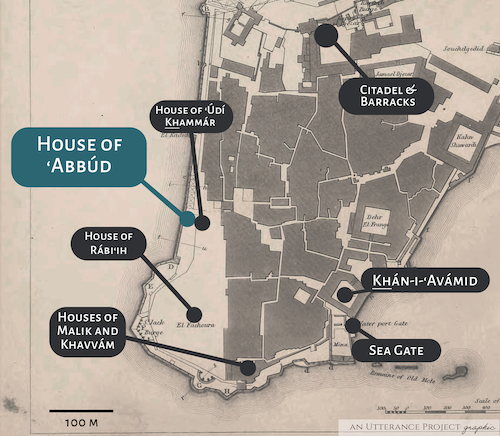
The Holy Family has now made a home inside 'Akká, in a Christian quarter for the last several years. Living among the inhabitants of the penal colony, the inevitable happens: ‘Abdu’l-Bahá’s saintly character and constant devotion to the poor and needy touch the hearts of most who meet Him. ‘Abdu’l-Bahá is more than ever the shield of Bahá’u’lláh. He prepares the pilgrims to meet Bahá’u’lláh; He meets with public officials, manages the day-to-day affairs of the family, and works assiduously to make the lives of the Bahá’ís in ‘Akká as comfortable as possible. In this climate of improving relations, Ilyás 'Abbúd, becomes ill, and wishing to leave 'Akká, rents his house to Bahá'u'lláh. For the first time in many years, the Holy Family has ample room. The partition between the two houses is torn down and there are many windows, two upper courts. Bahá'u'lláh's room is light and airy with a view of the sea, where He will continue to reveal the Kitáb-i-Aqdas. Since 1868, however, Bahá'u'lláh has not set foot beyond the city walls, and His sole exercise has been to endlessly pace the floor of His room. 'Abdu'l-Bahá, continuously concerned with how to make Bahá'u'lláh's life more pleasant, borrows some money and repairs the bath in the House of 'Abbúd. Water can now be warmed up in half an hour, and this convenience brings great joy to Bahá'u'lláh. 'Abdu'l-Bahá repays the borrowed money within four months.
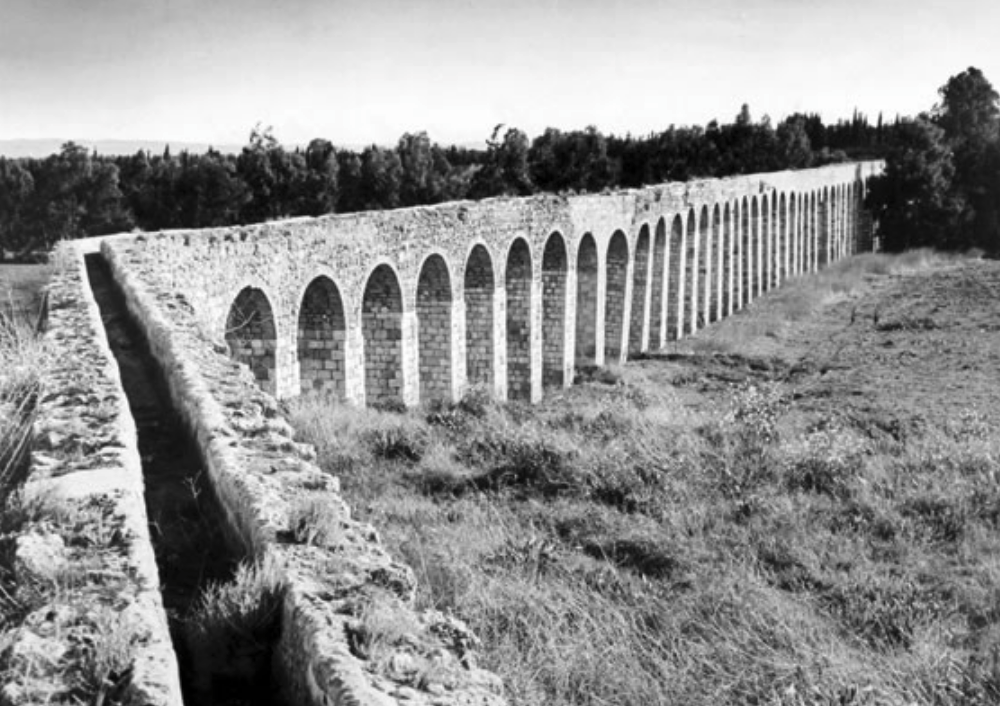
The aqueduct to carry water to ‘Akká was built in about 1815 to replace an earlier one destroyed by Napoleon. By the time of Bahá’u’lláh's arrival, it had fallen into disrepair. (Bahá'í World Centre archives, 1968). Baháu'lláh: A Photographic Narrative.
'Abdu'l-Bahá, had arrived in 'Akká three years prior as an exile and a prisoner, forbidden to interact with the local population. But three years is a long time, and the extraordinary nature of 'Abdu'l-Bahá, has acted like a veritable dew, and deeply penetrated into the soil of the hearts of 'Akká and its people. 'Abdu'l-Bahá is now 28 years old, and described at this moment in His life by Shoghi Effendi, as being "in the full flower of His manhood." 'Abdu'l-Bahá has maintained constant contact with the rank and file of the population, when Aḥmad Big Tawfíq replaces Sálih Páshá, the previous Governor who had been ill-disposed towards Bahá'u'lláh.
Aḥmad Big Tawfíq and 'Abdu'l-Bahá meet for the first time on the beach. 'Abdu'l-Bahá, as was His habit, had come for a swim, and the Governor had come to seek Him out, knowing of the Master's habit. Aḥmad Big Tawfíq had been handed Bahá'í Writings by the Covenant-Breakers to poison him against Bahá'u'lláh, but the ruse had backfired: the Governor had been impressed and bewildered and wanted to know more, which is how he now found himself on the beach of 'Akká, listening to 'Abdu'l-Bahá. The story of Aḥmad Big Tawfíq is one of a pure heart being enkindled. The more he knew, the more he wanted to know. He requested that all of Tablets and Writings of Bahá'u'lláh he owned be recopied in the best calligraphy possible.
Aḥmad Big Tawfíq's devotion is gradually kindled, both through his association with 'Abdu'l-Bahá and studying the Holy Writings of the Faith. He becomes so overwhelmed and captivated by 'Abdu'l-Bahá's majesty of bearing, His charm of manners, the dignity of His behavior, His ocean-like depth of knowledge, that Aḥmad Big Tawfíq removes his shoes each time he enters 'Abdu'l-Bahá's presence, in a show of deep reverence.
The people of 'Akká start speaking behind the Governor's back, murmuring that his favorite counselors are the Bahá'í exiles. In fact, Aḥmad Big Tawfíq sends his own son to 'Abdu'l-Bahá for instruction and enlightenment. During one of Aḥmad Big Tawfíq's long-awaited audiences with Bahá'u'lláh, he requests permission to render Him a service. Bahá'u'lláh suggests that the aqueduct of 'Akká, which has fallen into ruin over the previous thirty years, be repaired. Aḥmad Big Tawfíq immediately begins work on the aqueduct, which will be completed by a later Governor. Eventually, after having been deprived of potable water for decades, the residents of 'Akká will have ready access to fresh water, thanks to the magnanimity of Bahá'u'lláh,
Towards the end of his governorship, at the request of Bahá'u'lláh in a private audience, Aḥmad Big Tawfíq agrees to review all the cases of those detained during the murder of the Azálís. While he was holding office, neither Bahá'u'lláh nor 'Abdu'l-Bahá showed special favor towards Aḥmad Big Tawfíq. However, when it becomes official that he is leaving for another post, 'Abdu'l-Bahá showers him with such hospitality that the population of 'Akká is astonished. 'Abdu'l-Bahá sets up a tent for Aḥmad Big Tawfíq by the sea, where he can receive his guests and those wishing him farewell. The Holy Family provides lunch and dinner for all those who come to visit Aḥmad Big Tawfíq, during the few days he remains, as he is preparing to leave. Aḥmad Big Tawfíq asks for a copy of the Greatest Name, and Mírzá Muḥammad-‘Alí, the son of Bahá'u'lláh and a master calligrapher, obliges. Until the day of his departure from 'Akká, Aḥmad Big Tawfíq constantly expresses his sorrow at the impending separation from Bahá'u'lláh and 'Abdu'l-Bahá.
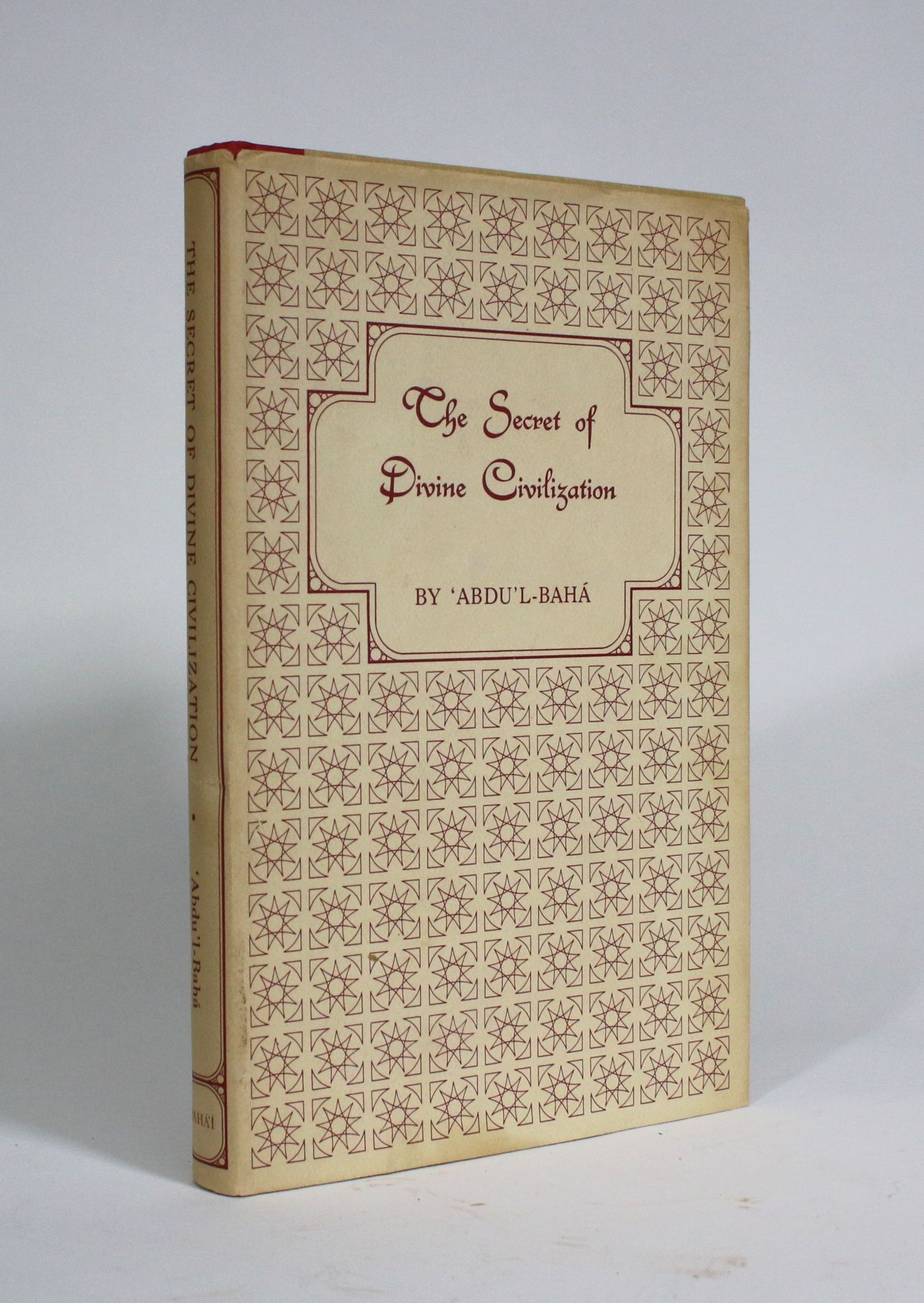
‘Abdu’l-Bahá anonymously publishes a treatise on societal reform entitled The Secret of Divine Civilization ("The Mysterious Forces of Civilization" in literal translation from the Persian), which Shoghi Effendi refers to as “Abdu’l-Baha’s outstanding contribution to the future reorganization of the world.”
True civilization will unfurl its banner in the midmost heart of the world whenever a certain number of its distinguished and high-minded sovereigns—the shining exemplars of devotion and determination—shall, for the good and happiness of all mankind, arise, with firm resolve and clear vision, to establish the Cause of Universal Peace. They must make the Cause of Peace the object of general consultation, and seek by every means in their power to establish a Union of the nations of the world. They must conclude a binding treaty and establish a covenant, the provisions of which shall be sound, inviolable and definite. They must proclaim it to all the world and obtain for it the sanction of all the human race. This supreme and noble undertaking—the real source of the peace and well-being of all the world—should be regarded as sacred by all that dwell on earth. All the forces of humanity must be mobilized to ensure the stability and permanence of this Most Great Covenant.
'Abdu'l-Bahá - The Secret of Divine Civilization
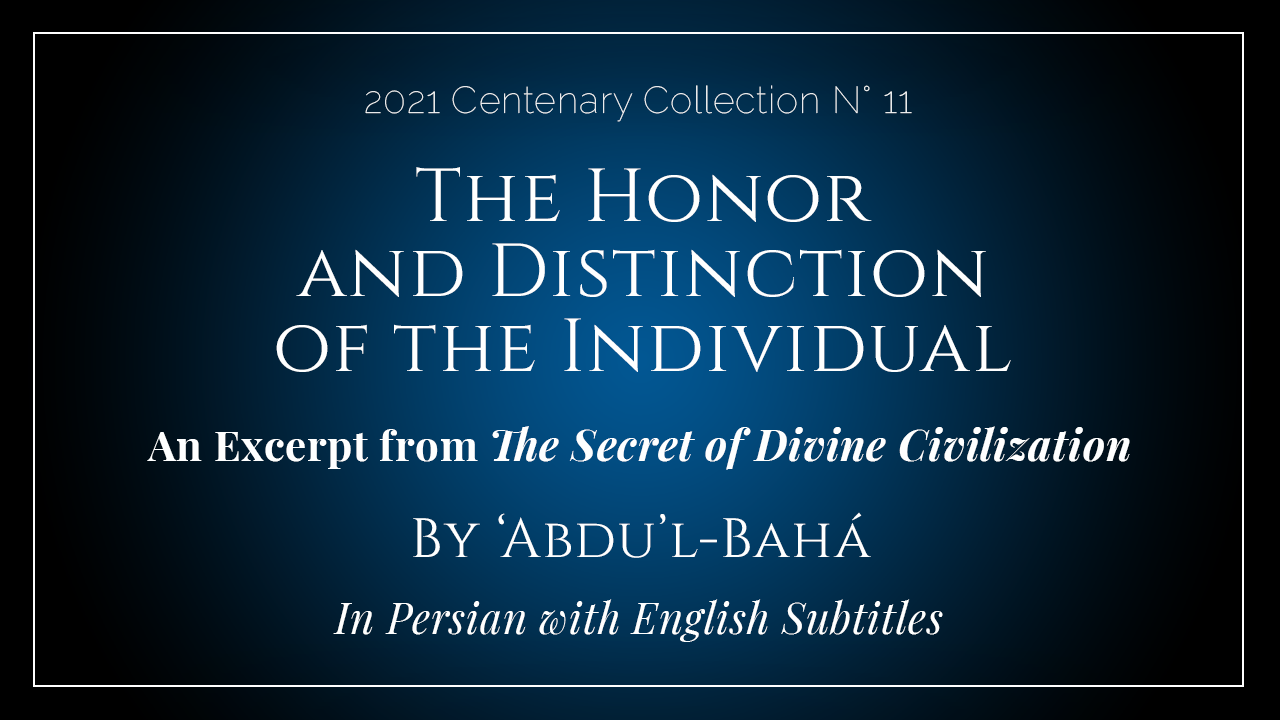
Click on the above image to listen to an excerpt from The Secret of Divine Civilization, recited in Persian with English subtitles and transliteration.
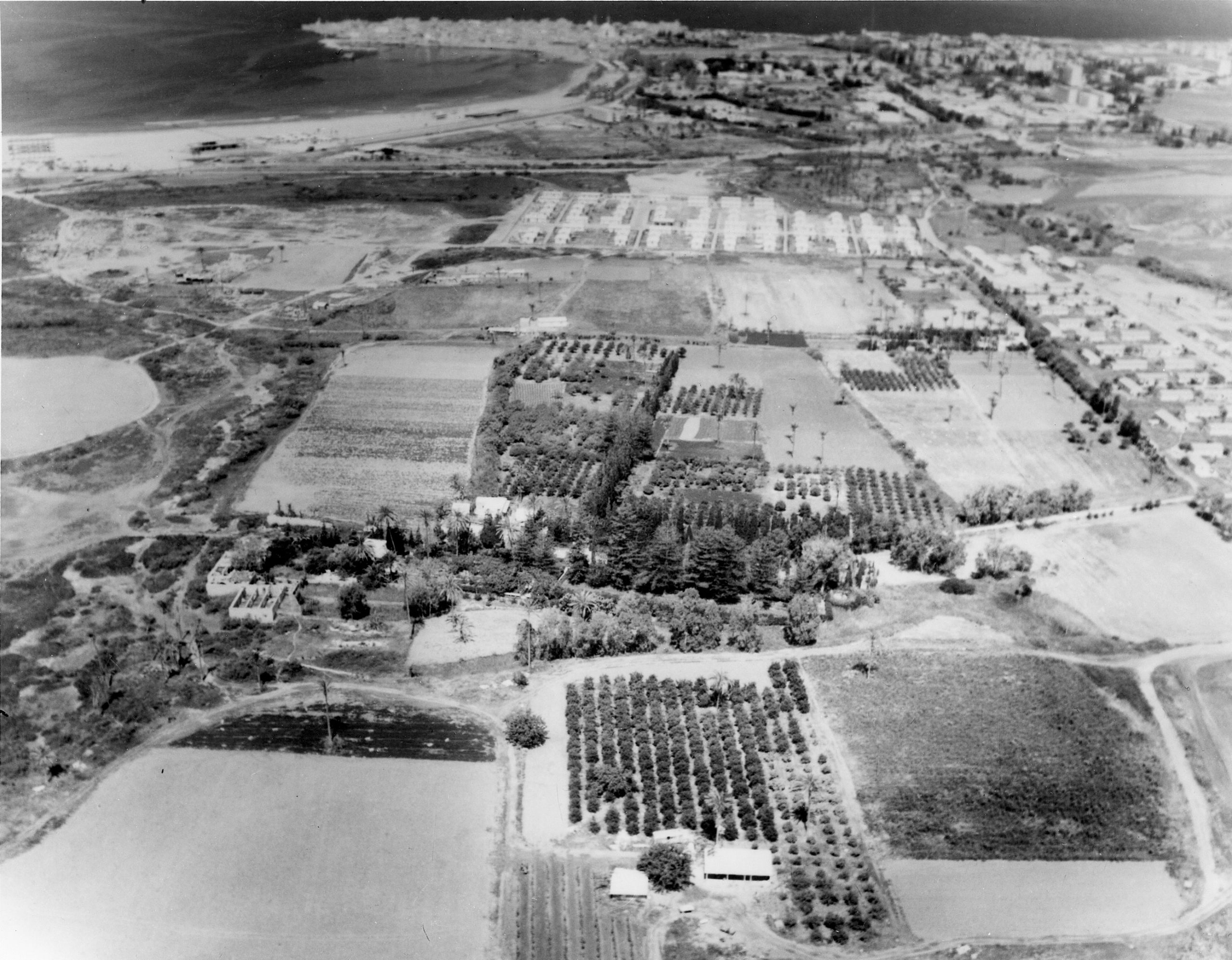
Aerial view of Riḍván Garden, May 1967. You can clearly see 'Akká at the top of the photograph. Bahá'í Media Bank.
'Abdu'l-Bahá meticulously prepares for two years in order to offer Bahá'u'lláh the most verdant, beautiful, pleasant surroundings possible. For nearly a decade, Bahá'u'lláh has not set foot outside the walls of this desolate stone city. The only walking Bahá'u'lláh has done, these many years, is to pace within the walls of His bedchamber. In 1875, His devoted Son makes the first major step towards Bahá'u'lláh's later years of rest in places of beauty: 'Abdu'l-Bahá rents a garden.
One kilometer outside the south-eastern corner of the walls of 'Akká, runs a little river called Na‘mayn. The name Na‘mayn means "two yeses," after the Islamic tradition that says that "Yes!" will be called out twice on the Last Day when God calls out "Am I not your Lord?" This little river empties into a main channel close to the Mediterranean, but in the last little meanders of its journey, the Na‘mayn river surrounds a green knoll.
This verdant isle is the garden that 'Abdu'l-Bahá rents for Bahá'u'lláh. He will rename it Riḍván (Paradise). In 1875 it has none of what we are familiar with, such as the blue benches. There is only one structure on the property: a very simple house for the gardener or the caretaker. Bahá'u'lláh will later use one room in this building to rest when He visits the Riḍván Garden.
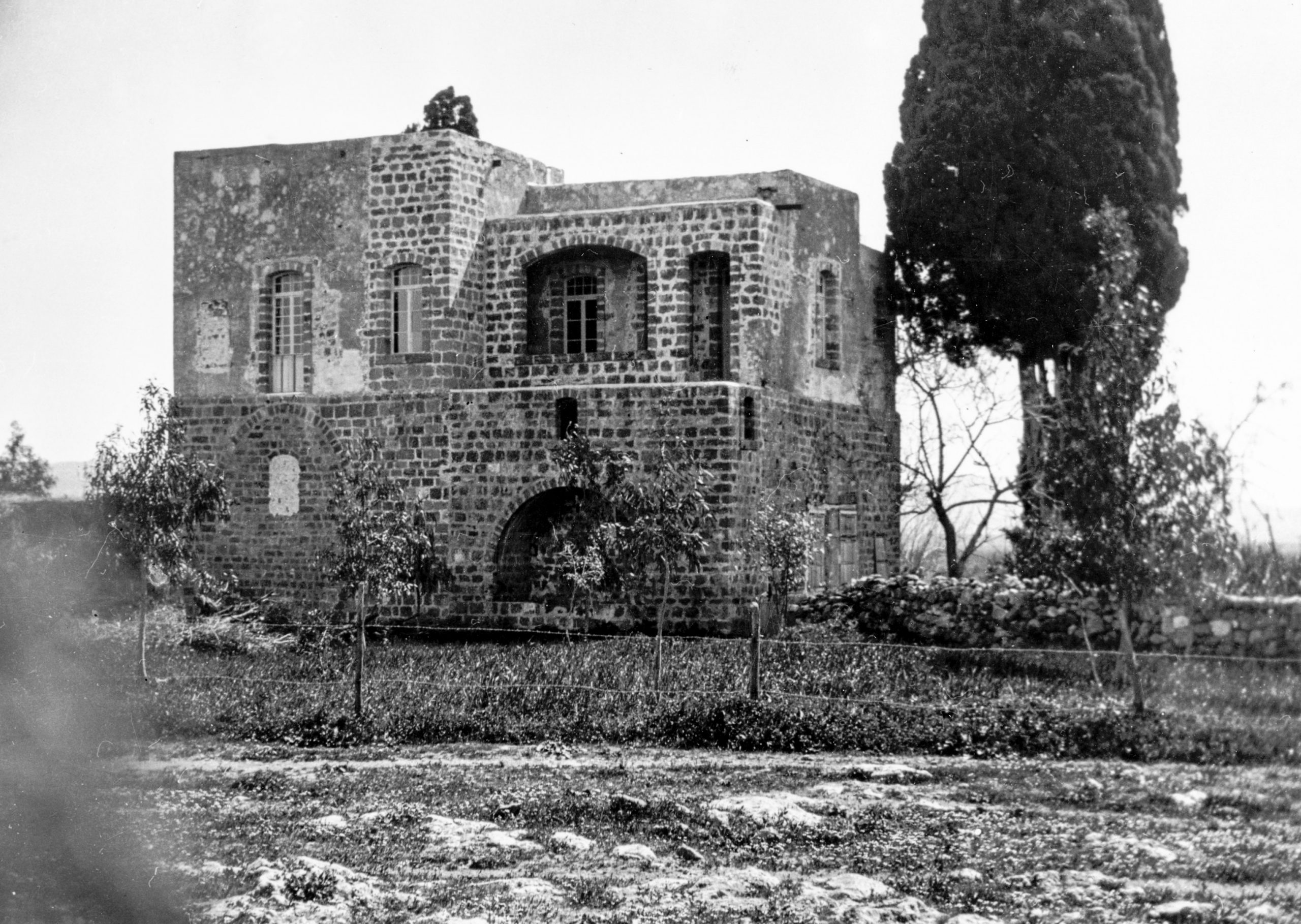
Mansion of Mazra'ih, c. 1930. Bahá'í Media Bank.
Bahá'u'lláh has had a deep love for nature since childhood, born in Mazindarán, a province of rolling verdant hills. One day, Bahá'u'lláh passes the remark:
I have not gazed on verdure for nine years. The country is the world of the soul, the city is the world of the bodies.
‘Abdu’l-Bahá hears this remark second hand and determines to do whatever is in His power to bring greenery back into Bahá'u'lláh's life. About four kilometers north of 'Akká is a mansion which has been left empty. It is called Mazra'ih and it is a lovely place, with a stream surrounded by gardens. ‘Abdu’l-Bahá pays a visit to the owner of 'Mazra'ih, a man named Muḥammad Páshá Ṣafwat, very much opposed to the Bahá'ís, and asks him why such a lovely place is uninhabited. The man responds he is an invalid and cannot leave the city, and gets lonely in Mazra‘ih away from his friends. 'Abdu'l-Bahá offers to rent the place from him, and the man agrees. 'Abdu'l-Bahá gets a very good price, renting Mazra'ih for five pounds a year. He has a contract drawn up and pays Muḥammad Páshá Ṣafwat for five years in advance.
Then, 'Abdu'l-Bahá sets everything in motion, never leaving 'Akká, to fulfill His silent promise to Bahá'u'lláh. He hires laborers to repair Mazra‘ih, has a bath built, arranges for the garden to be tended to, and prepares a carriage for Bahá'u'lláh.
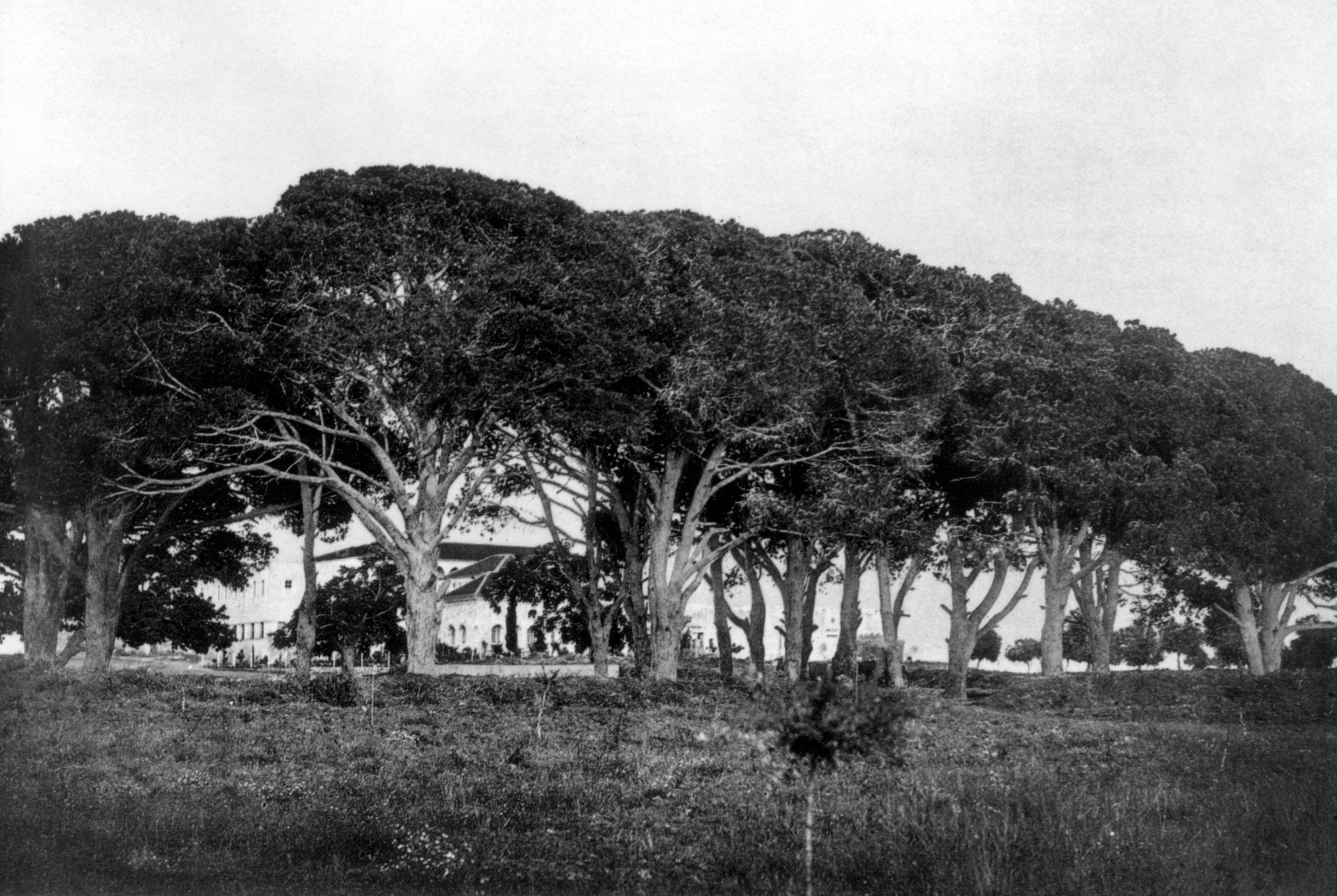
The pines of Bahjí on the land of the Jamal brothers, site of the dinner which signaled that Bahá’u’lláh could leave the boundaries of the walled city, c. 1900. Bahá'í Media Bank.
At last, 'Abdu'l-Bahá decides to visit Mazra'íh Himself by attempting to walk through the City Gate. Soldiers on duty do not protest, so 'Abdu'l-Bahá returns the next day, this time with friends and some officials.
On yet another Spring day of 1877, 'Abdu'l-Bahá organizes a banquet at Bahjí. He spreads a table under the pine trees and invites notables and officials of 'Akká. After the banquet, in the evening, they all return to 'Akká together. After these various attempts, culminating in a formal banquet invitation, it is clear to 'Abdu'l-Bahá that the Sultán's edict is a dead letter, and they are no longer confined to the city walls, as it states.
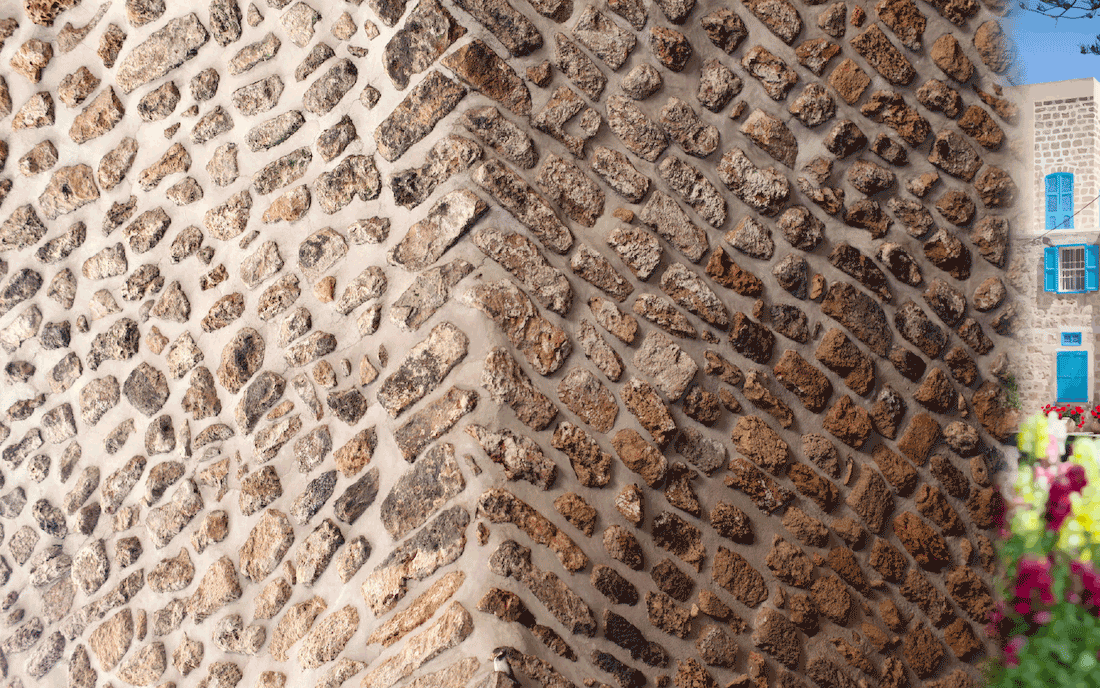
A symbolic interpretation of Bahá'u'lláh’s refusal to go beyond the walls, even as 'Abdu'l-Bahá offers Him the greenery and peace at Mazra’ih: the stone detail is from the land gate of ‘Akká (Bahá'í Media Bank), behind which Bahá'u'lláh chooses to remain, and beyond the gate, the small colorful portion is a detail of the greenery at Mazra’ih ( Bahá'í Media Bank, Copyright © Bahá’í International Community.)
'Abdu'l-Bahá offers Bahá'u'lláh the carriage to bring Him to Mazra'ih but Bahá'u'lláh refuses and responds:
I am a prisoner.
'Abdu'l-Bahá asks a second time, and is met with a second refusal. He boldly asks Bahá'u'lláh a third time, and receives the same response. Finally, 'Abdu'l-Bahá approaches a benevolent Muftí of 'Akká, his good friend Sháykh ‘Aliy-i-Mírí (whom we have previously read about in Abdu'l-Bahá and the Muftí of 'Akká Part I and Part II), a man who not only loves Bahá'u'lláh but whom Bahá'u'lláh favors. 'Abdu'l-Bahá poses the problem to Sháykh ‘Aliy-i-Míría and plainly asks him to throw himself at Bahá'u'lláh's feet and beg Him to leave the walls of 'Akká and go to Mazra'ih. These are the desperate words of 'Abdu'l-Bahá to His friend:
You are daring. Go tonight to His Holy Presence, fall on your knees before Him, take hold of His hands and do not let go until He promises to leave the city!
'Abdu'l-Bahá tells the rest of this delightful story:
He went directly to Bahá'u'lláh and sat close to His knees. He took hold of the hands of the Blessed Beauty and kissed them and asked: "Why do you not leave the city?" He said: "I am a prisoner." The Sháykh replied: "God forbid! Who has the power to make you a prisoner? You have kept yourself in prison. It was your own will to be imprisoned, and now I beg you to come out and go to the palace. It is beautiful and verdant. The trees are lovely, and the oranges like balls of fire!" As often as the Blessed Beauty said: "I am a prisoner, it cannot be," the Sháykh took His hands and kissed them. For a whole hour he kept on pleading. At last Bahá'u'lláh said, "Khaylí khub (very good)" and the Sháykh's patience and persistence were rewarded. He came to me with great joy to give the glad news of His Holiness's consent. In spite of the strict firman of 'Abdu'l-'Azíz which prohibited my meeting or having any intercourse with the Blessed Perfection, I took the carriage the next day and drove with Him to the palace. No one made any objection.
J.E. Esslemont, Bahá'u'lláh and the New Era, pages 34-35
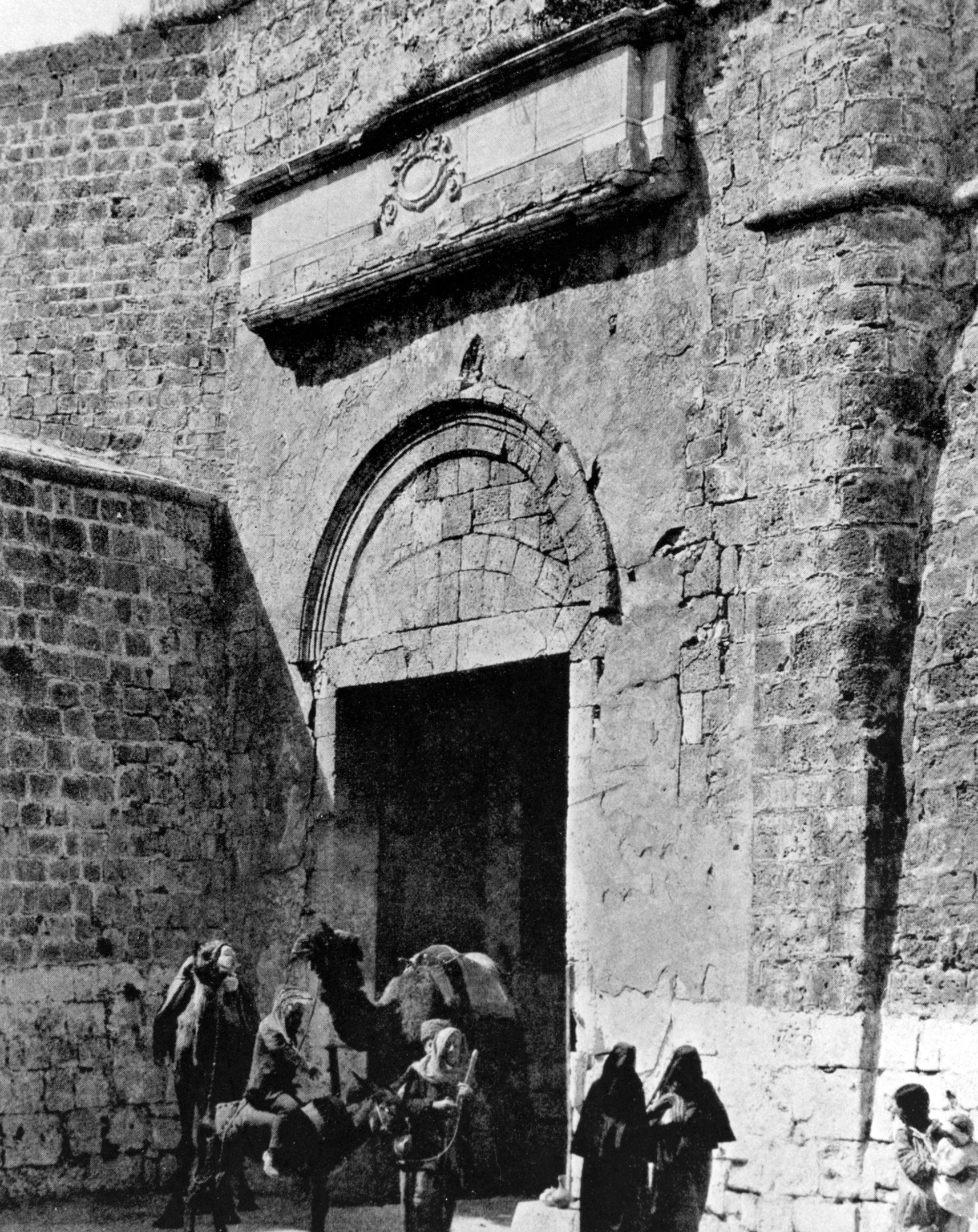
Bahá’u’lláh departed the city of ‘Akká in 1877 through the land gate, seen here from outside the city walls, 1921. Bahá'í Media Bank.
The next day and nine years after Bahá'u'lláh had entered 'Akká through the Sea Gate as a prisoner, 'Abdu'l-Bahá drives Bahá'u'lláh through the Land Gate to Mazra'ih in the carriage, and brings His Beloved Father beyond the walls of the prison-city of 'Akká for the first time in a decade, and to a lush garden surrounded by nature.
A new chapter opens.
References for Part II
The Final Exile
12 August 1868 – Leaving Adrianople: Shoghi Effendi, God Passes By.
12 – 16 August 1868 Towards Gallipoli: Shoghi Effendi, God Passes By.
16 – 21 August 1868 – Gallipoli: Shoghi Effendi, God Passes By.
21 – 26 August 1868 – Gallipoli to Alexandria: Shoghi Effendi, God Passes By, details about the journey are from Myron H. Phelps, The Master in ‘Akká, page 70.
26 – 31 August 1868 – Alexandria to ‘Akká: Shoghi Effendi, God Passes By; details about the journey are from Myron H. Phelps, The Master in ‘Akká, page 70-72.
31 August 1868: The Sea Gate: Taherzadeh, Adib. The Revelation of Bahá’u’lláh Volume III: ‘Akká, the Early Years (1868 – 1877) Pages 11 & 12. Details about the order coming from the governor are from Myron H. Phelps, The Master in ‘Akká, page 75. Shoghi Effendi, God Passes By.
Arrival in ‘Akká: Shoghi Effendi, God Passes By.
The Most Great Prison
The Most Great Prison: Taherzadeh, Adib. The Revelation of Bahá’u’lláh Volume III: ‘Akká, the Early Years (1868 – 1877) Pages 16 & 17, Myron H. Phelps, The Master in ‘Akká, page 77-80.
‘Abdu’l-Bahá disciplines an Exile: Taherzadeh, Adib. The Revelation of Bahá’u’lláh Volume III: ‘Akká, the Early Years (1868 – 1877) Pages 17-18
The Sentence is read: Taherzadeh, Adib. The Revelation of Bahá’u’lláh Volume III: ‘Akká, the Early Years (1868 – 1877) Pages 18-19
‘Abdu’l-Bahá nursing the sick: Myron H. Phelps, The Master in ‘Akká, page 84-85.
‘Abdu’l-Bahá repairs a bath for Bahá’u’lláh: Furútan, ‘Alí-Akbar. “Memories of Bahá’u’lláh” page 49-50.
The Story of Badí‘: Balyuzi, H.M. Bahá’u’lláh: The King of Glory, Pages 297-300, Badi` Khurasani Aqa Buzurg (c. 1852-1869) and Badi, Áqá Buzurg by Richard Francis on Bahá’í Library Online.
The Great Tragedy of the Death of the Purest Branch: Taherzadeh, Adib. The Revelation of Bahá’u’lláh Volume III: ‘Akká, the Early Years (1868 – 1877) pages 204-220 and Balyuzi, H.M. Bahá’u’lláh: The King of Glory, pages 311-314.
‘Abdu’l-Bahá character affects the prison guards: Taherzadeh, Adib. The Revelation of Bahá’u’lláh Volume III: ‘Akká, the Early Years (1868 – 1877) Pages 52 & 53.
‘Abdu’l-Bahá and the Mufti of ‘Akká Part I: Taherzadeh, Adib. The Revelation of Bahá’u’lláh Volume III: ‘Akká, the Early Years (1868 – 1877) pages 70 & 71.
The Barracks are requisitioned and the Holy Family moves into ‘Akká: Balyuzi, H.M. Bahá’u’lláh: The King of Glory, pages 315
‘Akká 1870-1873
Bahá’u’lláh’s first three houses in ‘Akká: Shoghi Effendi, God Passes By, Ruhe, David S., Door of Hope: The Bahá’í Faith in the Holy Land, Balyuzi, H.M. Bahá’u’lláh: The King of Glory, pages 315 and Taherzadeh, Adib. The Revelation of Bahá’u’lláh Volume III: ‘Akká, the Early Years (1868 – 1877) page 221
‘Abdu’l-Bahá and the first Pilgrim House: Taherzadeh, Adib. The Revelation of Bahá’u’lláh Volume III: ‘Akká, the Early Years (1868 – 1877) page 221, for the story of the sherbet: Ruhe, David S., Door of Hope: The Bahá’í Faith in the Holy Land page 72
The coal thief: Myron H. Phelps, The Master in ‘Akká, pages 100-103
‘Abdu’l-Bahá’s room in the Khán-i-Avámid: Adib. The Revelation of Bahá’u’lláh Volume III: ‘Akká, the Early Years (1868 – 1877) page 221-222
The House of ‘Udí Khammár: Balyuzi, H.M. Bahá’u’lláh: The King of Glory, pages 315 and Taherzadeh, Adib. The Revelation of Bahá’u’lláh Volume III: ‘Akká, the Early Years (1868 – 1877) page 221
The Conversation with the Russian Consul: Furútan, ‘Alí-Akbar. “Memories of Bahá’u’lláh” page 48-49.
The First Western Article about Bahá’u’lláh: Bahaipedia Article: Travelers and Scholars on the Bábí/Bahá’ís Faiths
Aḥmad Big Tawfíq and ‘Abdu’l-Bahá: Balyuzi, H.M. Bahá’u’lláh: The King of Glory, pages 333-334, Shoghi Effendi, God Passes By
‘Abdu’l-Bahá and the Mufti of ‘Akká Part I: Taherzadeh, Adib. The Revelation of Bahá’u’lláh Volume III: ‘Akká, the Early Years (1868 – 1877) pages 70 & 71.
Three Covenant-Breakers Are Murdered: Balyuzi, H.M. Bahá’u’lláh: The King of Glory, pages 320-332, Taherzadeh, Adib. The Revelation of Bahá’u’lláh Volume III: ‘Akká, the Early Years (1868 – 1877) pages 234-236, Shoghi Effendi, God Passes By. Details about ‘Abdu’l-Bahá in chains from Lady Blomfield: The Chosen Highway. Calculations about the distance between the Limán and the house of ‘Údí Khammár are my approximative measurements on Google Maps, tracing the most direct path between the Limán and the house of ‘Údí Khammár along the pedestrian alleys indicated on the map.
The wedding of ‘Abdu’l-Bahá and Munírih Khánum
Maani, Baharieh Rouhani. Leaves of the Twin Divine Trees: an in-depth study of the lives of women closely related to the Báb and Baháʼuʼlláh, pages 309-327, Balyuzi, H.M. Bahá’u’lláh: The King of Glory, pages 338-350, Lady Blomfield: The Chosen Highway.
‘Akká 1873 – 1877
The House of ‘Abbúd: Ruhe, David S., Door of Hope: The Bahá’í Faith in the Holy Land, page 47. The story of the bath comes from Furútan, ‘Alí-Akbar. “Memories of Bahá’u’lláh” page 51-52.
Aḥmad Big Tawfíq and ‘Abdu’l-Bahá: Balyuzi, H.M. Bahá’u’lláh: The King of Glory, pages 333-337.
‘Abdu’l-Bahá prepares the Garden of Riḍván for Bahá’u’lláh: Ruhe, David S., Door of Hope: The Bahá’í Faith in the Holy Land, page 91.
‘Abdu’l-Bahá prepares Mazra‘ih for Bahá’u’lláh: Balyuzi, H.M. Bahá’u’lláh: The King of Glory, pages 357-359.
![]()
